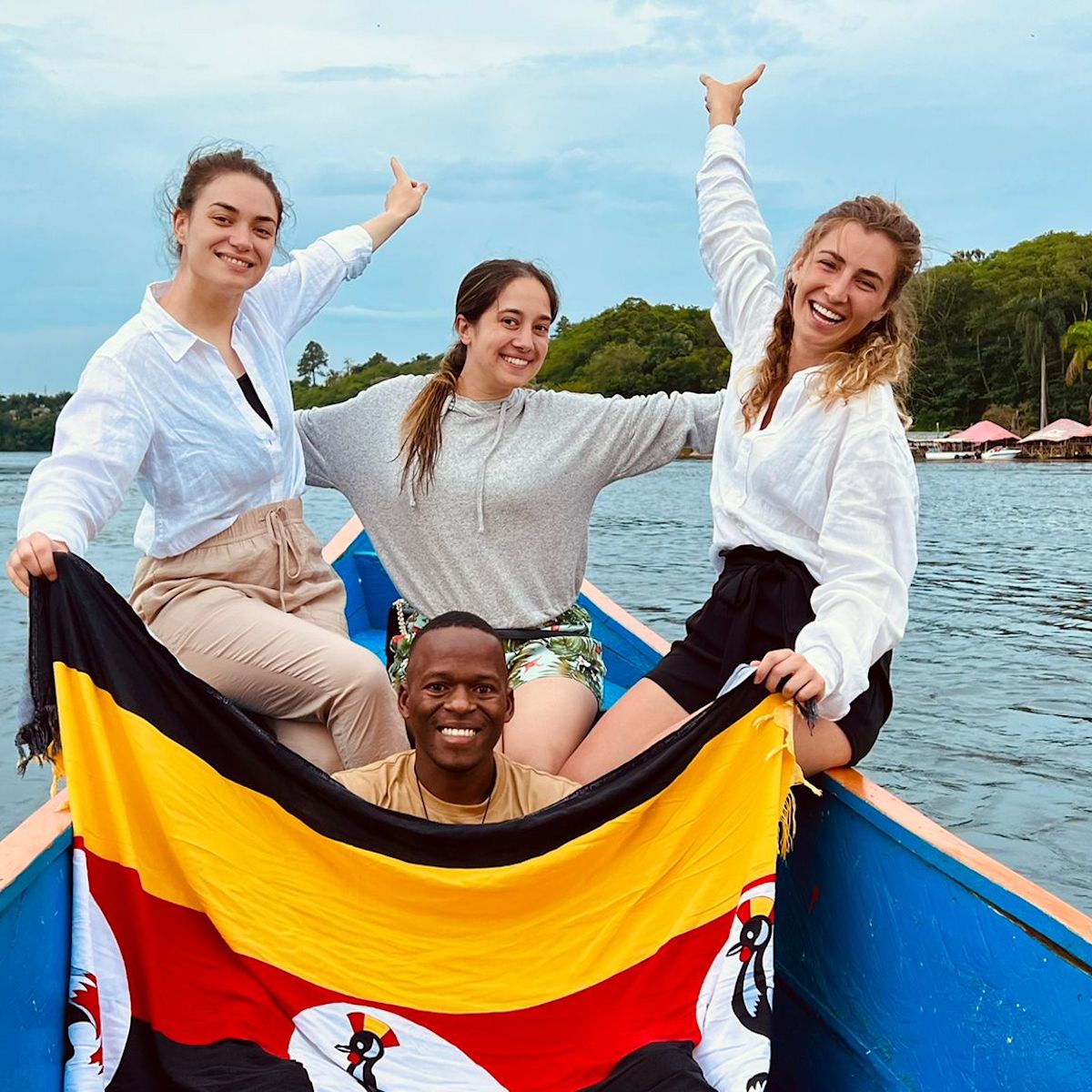

12 reasons why good tour guides are so important
Ah, the tour guide. That special person who welcomes you to their country and looks after you, ensuring you have a fabulous trip! But how and why exactly are they a great addition to a trip? We enumerate ...
1. Tour guides navigate for you
Wondering if you've missed your bus connection is frustrating. So too is getting off at the wrong stop. And fuming at a loss of signal at the very moment you need your app to tell you which exit to take ... nobody needs that.
So yes, primary among the benefits of a tour guide is having someone to do all the navigating for you.
Navigating can include:
- Getting your from the airport to your hotel without hiccough.
- Leading you through the warren of streets in an old town.
- Taking the lead on a trek so you don't go in a circle.
- Even just ensuring you find your way out of that enormous botanic garden.
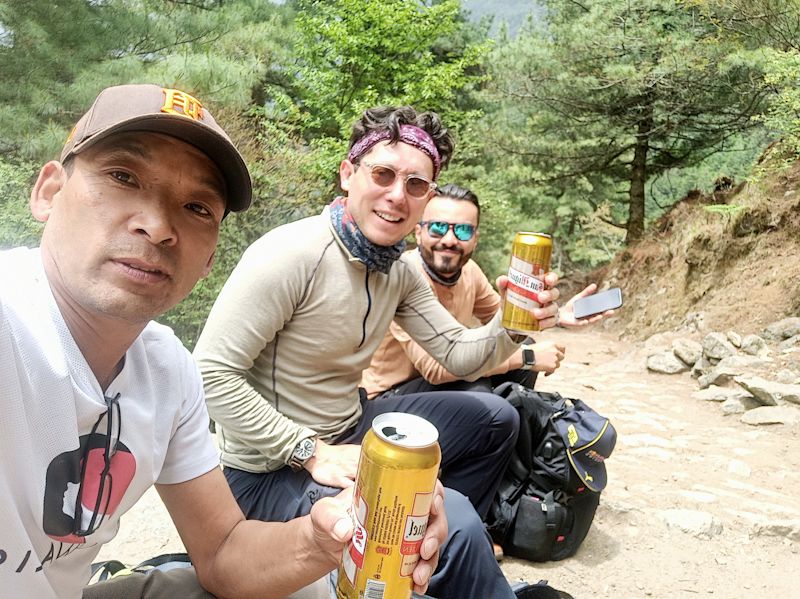
Some of our trekkers with their selfie-taking guide Angelu on the EBC trek
Navigating can include driving you
A tour guide also often drives you around. Or in some cases, they'll acquire a vehicle and driver for you.
This is a big help, saving your from the hassle of a car hire. You also won't have any heart-stopping moments when you pull out and realise you're facing oncoming traffic. And you won't ever come back to your vehicle to discover you didn't feed a hidden parking meter.

On safari, your tour guide is also your driver
2. Tour guides do your admin for you
This is a biggie. Tour guides take care of all of your admin for you, like:
- Preordering permits and pre-booking accommodation.
- Paying admittance fees beforehand, saving you the need to queue.
- Coordinating travel times for buses, trains, flights, etc.
- Overseeing the transfer of luggage.
- Ordering and collecting packed lunches, drinking water and the like.
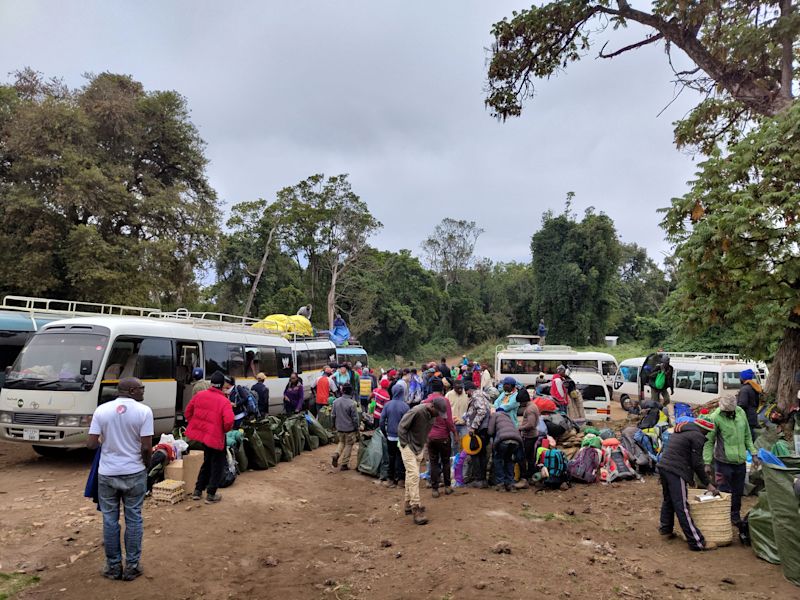
Some of our trips, like Kilimanjaro climbs, involve a LOT of admin!
3. Tour guides keep you safe
If safety was the only benefit of a tour guide, we think it would be enough for us to be super pro tour guides! A tour guide looks after you from arrival to departure.
It's worth pointing out that at Follow Alice we believe tour guides should be locals. One of the reasons for this (although there are certainly others as well) is that only locals can truly know the do's and don'ts of their society and environments in order to keep you safe.
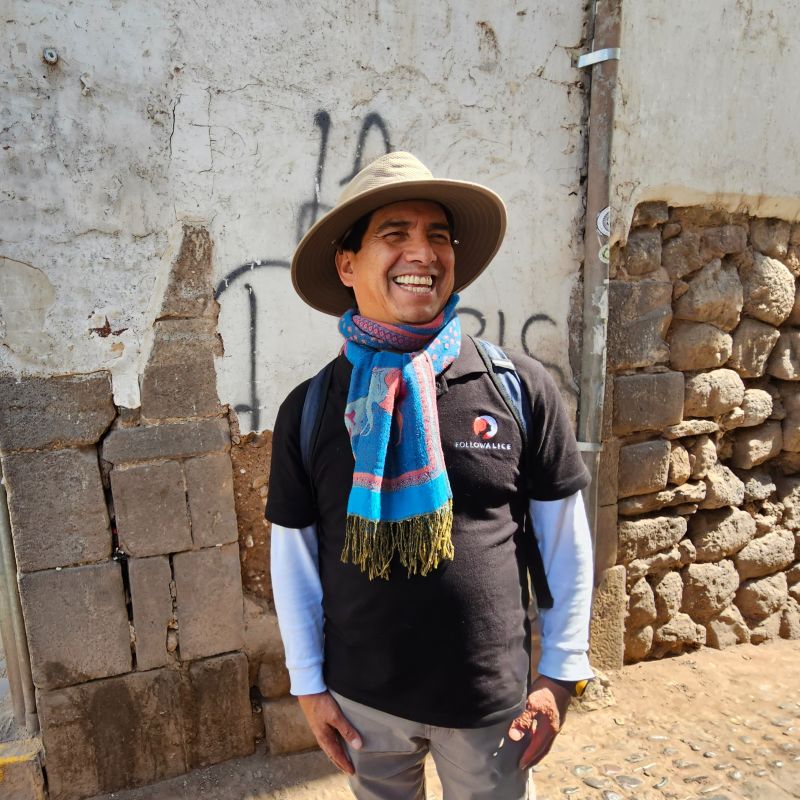
Mario is our Cusco and Inca Trail lead guide
Local tour guides are there with you to ensure:
- You don't go into any dangerous areas.
- You're not accosted by overly zealous vendors.
- Your belongings are kept safe.
- You don't get bamboozled by shysters.
- You don't pick a poisonous plant, or pet a treacherous animal.
The list could go on.
Tour guides also ensure you don't get 'little things' wrong, like wearing sandals on a day when they know you need closed, sturdy shoes.
Adventure tour guides are especially important
The adventure tour guide offers a whole other level of safety and security. Whether it's guiding you safely through islands on a kayaking adventure, or leading you through thick forest on a trekking trip, they're there to ensure you:
- Set out with the right clobber to protect you from the elements.
- Stay on path and don't get lost.
- Don't push yourself too hard (sometimes by monitoring your vitals).
- Receive timely and appropriate treatment (medical or otherwise) should you need it.
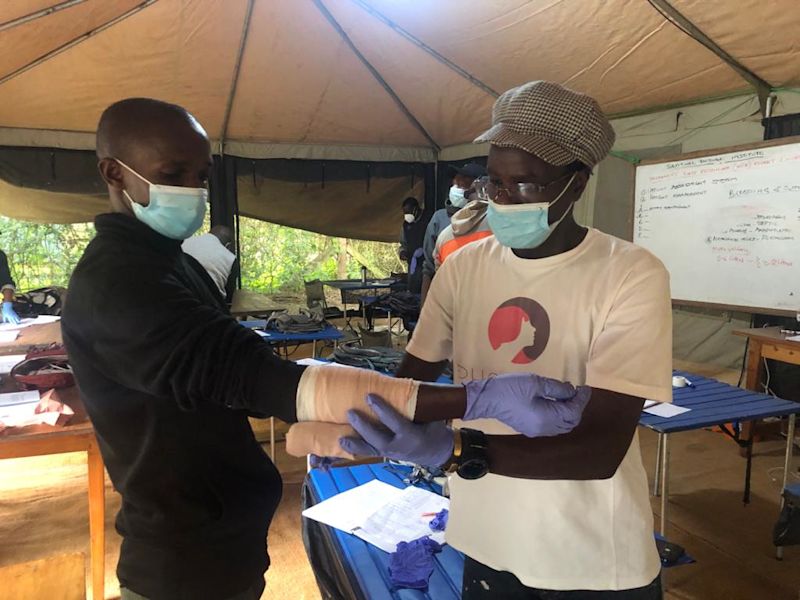
Chris, our Tanzania local leader, doing his refresher mountain first aid course
It's impossible to overstate the value of a tour guide in keeping you safe, especially on an adventure trip.
4. Tour guides are interpreters
A tour guide speaks the language of the locals, and as such is your ever-present translator. Without a tour guide, you wouldn't be able to communicate with some locals. You'd also miss out on many interesting insights and some beautiful moments of connection.

Brad and Rebecca opted to do a homestay in Rwanda through Azizi Life
Remember to always ask before taking photos of locals; your tour guide can assist in this to ensure nothing is lost in translation.
5. Good tour guides explain things to you
It's easy to find out the name of the bridge you're walking over. But do you want to know why it's called that? And yes, you can take a pic of a gorgeous tree and use an app to tell you it's name. But do you want someone there to explain why, for instance, the bark is stripped away near the base?
Tour guides are there to answer your questions, and also supply answers to questions you hadn't even thought to ask!

An Annapurna Circuit trek guide explaining tomorrow's route
Tour guides have intimate knowledge of the area and can drop all sorts of fabulous knowledge bombs.
Tour guides also give you insights into how locals feel about what's going on in their country and around the world. So from them you get to learn about some truly local perspectives. And we all know that logic isn't universal – what seems logical to one culture can be very different in another, and it helps to have a guide with you to illuminate such things.
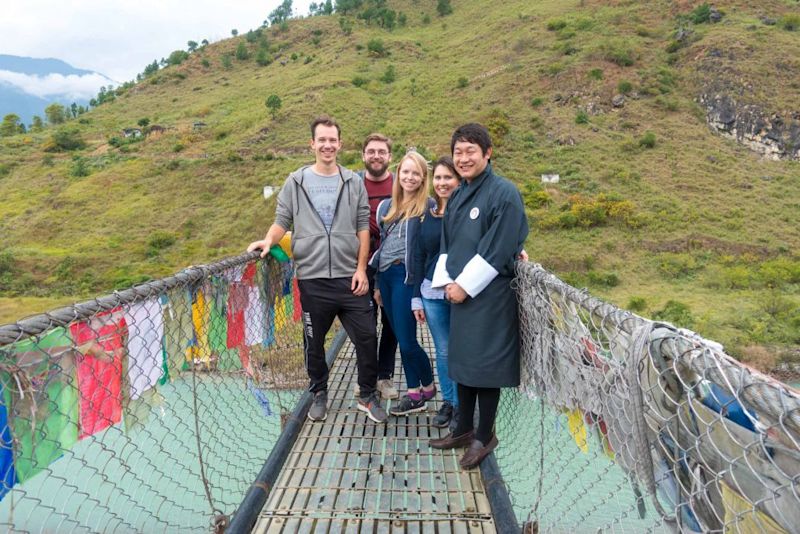
A Follow Alice group with their Bhutanese tour guide
Finally, tour guides are there to ensure you don't blunder unnecessarily in terms of local customs and sensitivities. They can also advise you ahead of time if you need to dress smartly or cover up in order to enter certain places.
6. Good tour guides get you good deals
When you travel with a tour guide, they (and the tour company they work for) are able to get you the best deals. They know which days have cheaper admittance fees, for instance. They can also sometimes get tour guide discounts that aren't available to tourists.
Finally, when you join a tour guide who's leading a large group, they're often able to get some sweet group discounts.
7. Good tour guides are photographers
Sometimes it's great to hand the camera to someone else to take a photo with you in it. 📸
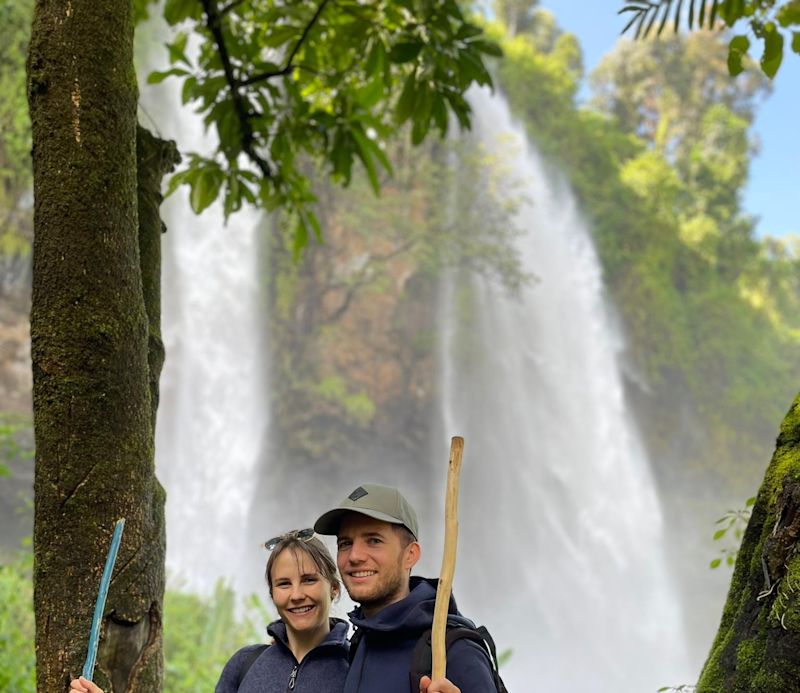
They can take a snap for you ...
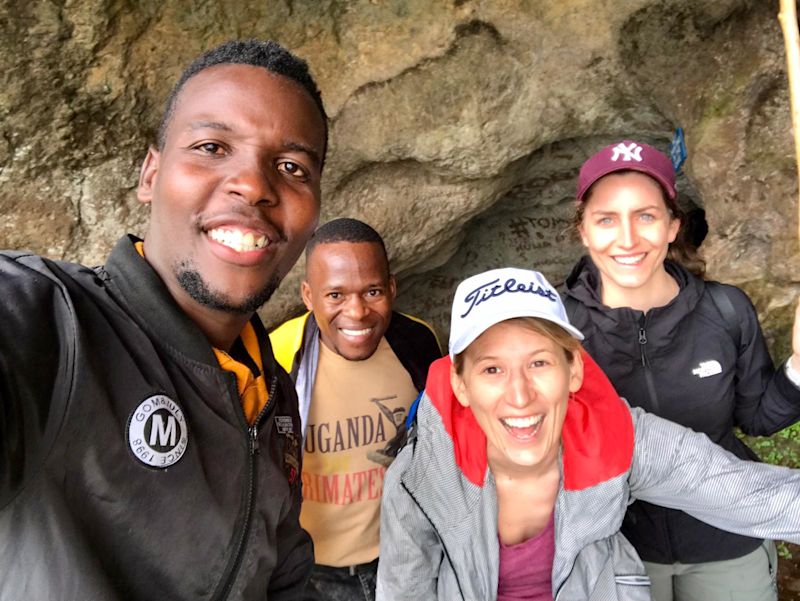
... or a selfie with all of you in it!
8. Good tour guides encourage you
On tough adventures like high-altitude trekking, most of us end up in need of some encouragement when the legs tire and the mind starts to tell you sneaky lies like you can't keep going. Your guide is invaluable is encouraging you in such moments. They can also provide little tips for the mind and body to help you to keep going.

One of our groups tackling the tough Kala Patthar near Everest Base Camp
A good tour guide believes in you and knows how to help you to believe in yourself.
We can't tell you how many folks have told us that they would literally not have made it to the summit of Kilimanjaro if it hadn't been for the support of their guides.
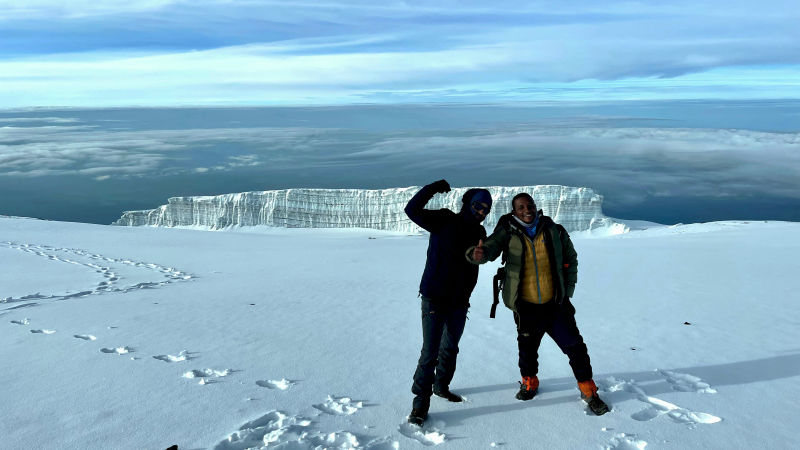
Our client George K. took this fab pic of two of his Kilimanjaro crew members
9. Good tour guides ensure you miss nothing
A tour guide knows the area intimately and knows of people, quiet spots and experiences that aren't discussed on any website. They're there to ensure you get the most out of your time, and have the most authentic experience possible.
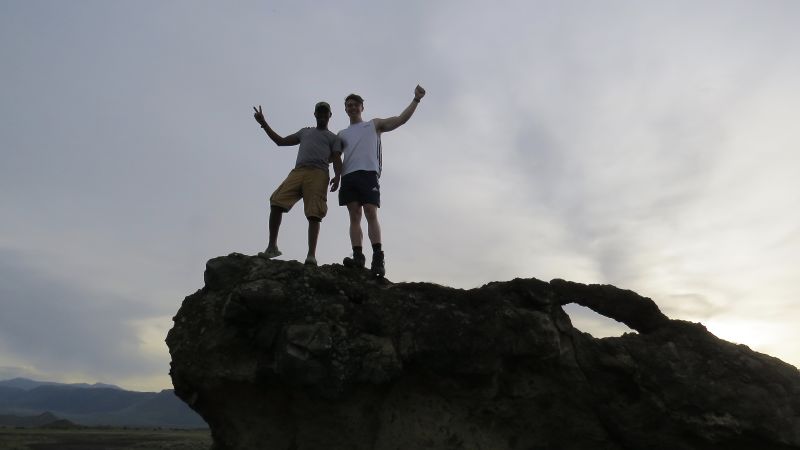
Dean with his safari guide Heri on a walk near Lake Natron
This includes seeing animals!
Safari guides are trained to spot hard-to-see animals that city-dwelling mortals would surely miss. It's amazing the number of camouflaged animals and birds that safari guides are able to point out to clients.
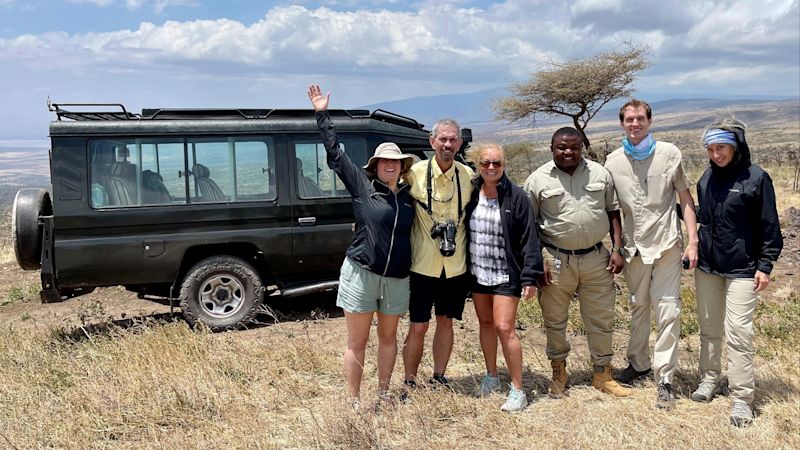
Dannielle took this pic with her group's safari guide in Tanzania
They give you recommendations
A tour guide can also be invaluable in terms of recommendations for markets and shops to pop into, museums, galleries and palaces to visit, gardens and parks to explore, and so on.
And the reverse is true too. They know what places to avoid because they're actually letdowns, overcrowded or overpriced.
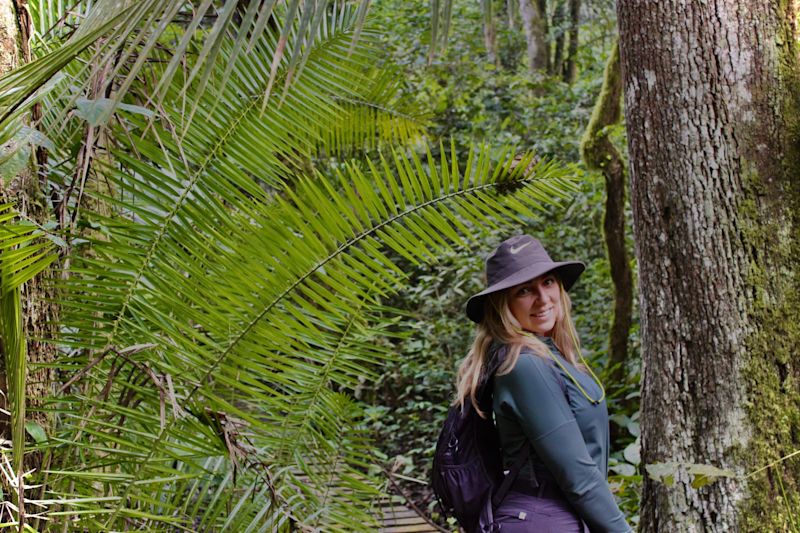
Amber on a chimp trek in Uganda
Tour guides also know where the locals like to eat – and those are often the places with the tastiest and best-prices meals. And when you have a local with you, there's no possibility of feeling awkward, like not knowing if you should seat yourself or wait to be seated. (Your tour guide is also a good person to ask about tipping customs.)
10. Good tour guides pivot when necessary
If you arrive somewhere and it's closed for renovations, or unexpectedly overcrowded, then your tour guide is able to pivot and suggest the next best option, or an alternative, to ensure you still maximise your time in the destination.
They really do take the headache out of travelling!
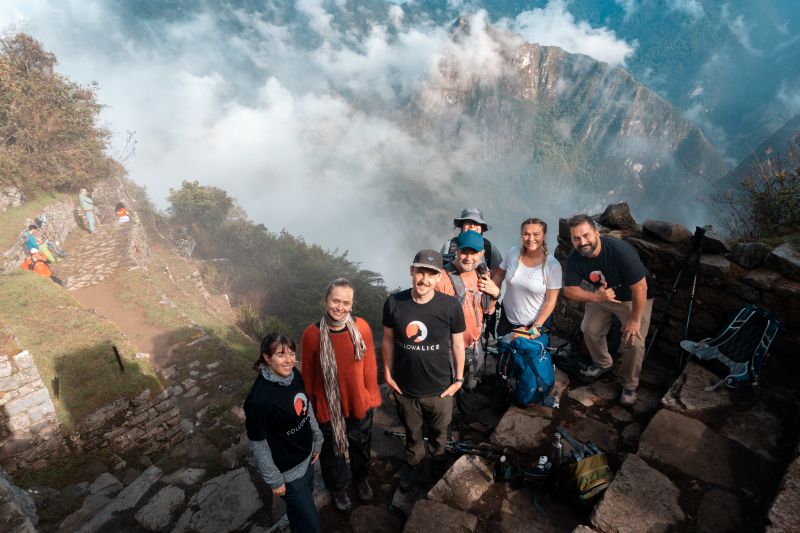
An experienced guide can pivot when necessary in a way that still gives you a memorable trip
11. Great tour guides celebrate your wins with you
A really great tour guide is invested in your trip. They want you to get the most out of the experience. And if it's an adventure trip with a set goal in mind, they want you to succeed in that!
Then, when you reach your mark, or push yourself beyond what you thought possible, a great tour guide is there to celebrate with you! They add to the victory moment by high-fiving you and generally making a fuss. 😄
Also, if you're a solo traveller, then it's especially wonderful to have another person there to make a noise about your win with you.
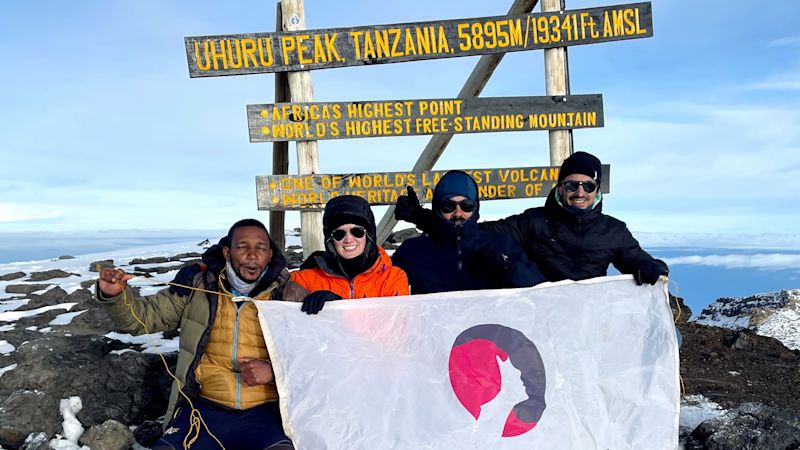
Tour guides are there to celebrate your achievements with you!
12. Great tour guides can even become friends
Sometimes, your tour guide adds so much to your trip, and you spend so much time together, that you end up becoming friends!
We cannot begin to tell you how many times this has happened on our trips. In their post-trip feedback, our clients often express not just gratitude for the encouragement and support of their guides, but also a genuine affection for these special people with whom they bonded and shared an incredible adventure.
One picture that perhaps best sums this up is this one below of Jack with one of his Kilimanjaro crew members at the end of the climb ...
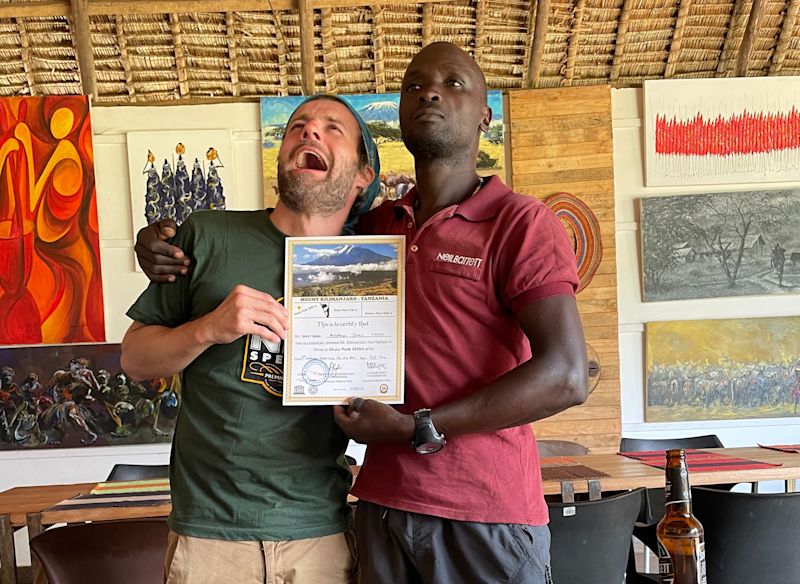
Jack and David celebrating with Jack's summit certificate
- Mobile Apps
- Stream on discovery+
- Program Guide
- Ghost Adventures
- Ghost Hunters
- Ghost Brothers
- Conjuring Kesha
The Dead Files
- Destination Fear
- Eli Roth Presents: A Ghost Ruined My Life
- Expedition Bigfoot
- Ghost Nation
- The Holzer Files
- Kindred Spirits
- Mountain Monsters
- Paranormal Caught on Camera
- Portals to Hell
- Amy Bruni and Adam Berry
- Destination Fear Team
- Don Wildman
- Ghost Adventures Crew
- The Holzer Files Team
- Jack Osbourne and Katrina Weidman
- Steve Dischiavi
- Watch Live TV
- Tips for Solo Travelers
- 4 Gorgeous Waterfalls
- 5 Extreme Swings
- World's 10 Best Swimming Holes
- Best BBQ in America
- Tilt! at 360 Chicago
Digital Exclusives
- Big City, Little Budget: New York
- Big City, Little Budget: San Francisco
- Bizarre Foods in the Kitchen
- One Bag and You're Out
From Our Shows
- Bizarre Foods
- Bizarre Foods: Delicious Destinations
- Booze Traveler
- Expedition Unknown
- Hotel Impossible
Mysteries at the Museum
Top domestic.
- New Orleans
- New York City
- Washington, DC
Top International
- Myrtle Beach
- Niagara Falls
- San Antonio
Explore By Region
- Asia Pacific
- Middle East & Africa
- North America
- South & Central America
Top Interests
- Amusement Parks
- Arts and Culture
- Food and Wine
- National Parks
- Health and Wellness
- Long Weekends
- Outdoor Adventure
By Traveler
- Family Travel
- Girls' Getaways
- LGBT Travel
- Solo Travel
Travel Tips
- Budget Tips
- Gear and Gadgets
- Hotels and Lodging
- Plan Your Bucket List
- Savvy Traveler
- Travel's Best
Pros + Cons: Travel Guide Services
Consider integrating a travel guide into your next trip, or try a fully guided tour to help you ease into international travel.

Related To:
This summer, I took a guided educational tour of Australia and New Zealand with my brother, mother and a group of almost forty travelers from our hometown in Tennessee. The group was a combination of high school students and adults with almost a one-to-one ratio. On the trip I held a koala (what a dream!), snorkeled in the Great Barrier Reef, toured the Sydney Opera House, visited Hobbiton, luged down a small mountain, learned first-hand about Djabuki and Maori cultures, surfed for the first time and ate some of the best food I've ever had. Luke, our amazing tour guide, was there all along the way to point us to the best food and attractions, answer our crazy American questions and teach us about Australian Rules football.
The trip was undoubtedly worth the price, and I know it could have been years before I would have planned and executed it on my own, especially as a beginner international traveler. Is a tour service the best way to experience Australia? Doesn't matter. It's the way that got us there. Of course, a fully planned and guided tour shouldn't always be your go-to for travel. Independent travel has so many virtues and benefits that can't be overlooked, but there are ways to incorporate guides without sacrificing these. Whatever your reason for traveling, there's likely some kind of guide service that can add to your experience.
Local Guides
So you're a budget independent traveler who scoffs at big tour groups and actively runs the other direction. I get it; you want to escape the tourist traps and really get to know a place. There are tours for you, too. Think small and local. Often found with a simple call to a tourism department, small operations offer day guiding and walking tours that cover significant historical sites. These guided tours can usually be booked day-of or at least the day before, offering flexibility and spontaneity to planning-averse travelers.
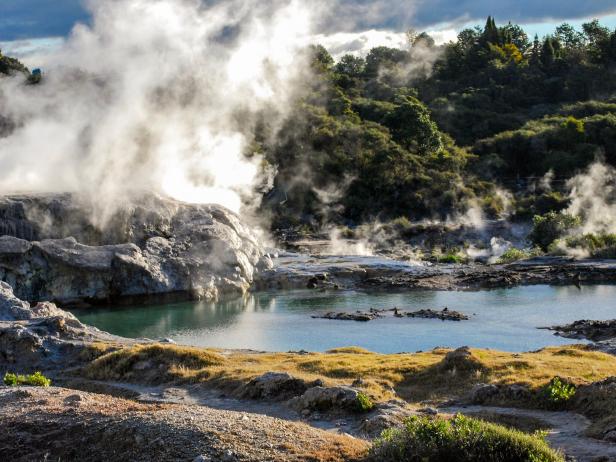
Whakarewarewa Thermal Village
Waiting for the geyser to spout during a local tour of Whakarewarewa Thermal Village in Rotorua, New Zealand.
Photo by: Carol Shannon
Carol Shannon
Local and personal guides are usually passionate about their towns and very well versed in local knowledge. Not only can they teach you about local history, culture and lore but also provide excellent advice on restaurants, bars and off-the-beaten-path experiences.
Adventure Guiding + Active Tours
Backpacking in the Andes, mountaineering in the Alps, rafting the Grand Canyon, cycling the West Coast, climbing in Patagonia — I go could on with the list of adventures I would love to have but am not experienced enough to undertake on my own. Adventure guiding services offered by REI , Adventure Unbound and thousands of local outdoor guiding services are integral to anyone who wants a unique and challenging outdoor experience but can't devote time to tackle it on their own.
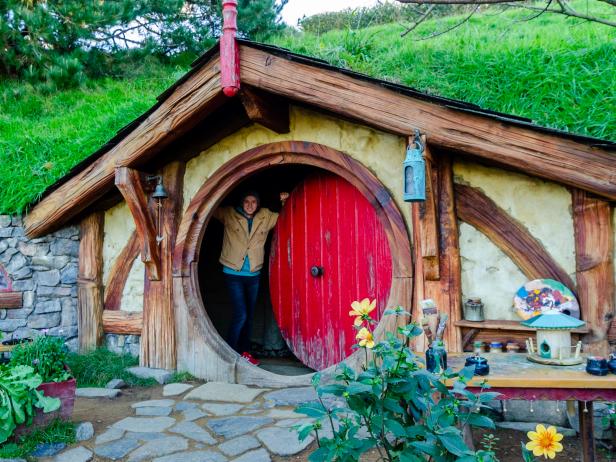
Enjoying Hobbiton on a semi-guided tour.
Too many people exclude themselves from incredible experiences like summiting a difficult 14'er or rafting treacherous rivers or camping in a desert because they lack experience. A proper guiding service will make up for inexperience and help you achieve your goal with the least possible risk. They can be hired for any level of adventure and budget from one of the 7 Summits to an overnight hike in an unknown part of the world.
Clay Britt, a friend who has traveled internationally on a budget over the last few years, prefers to rely on himself and knowledge picked up from locals on his adventures, but he makes a few exceptions for guiding services.
Clay says, "I used a guide on a five-day hike on the Salkantay Trek in Peru and on a camping trip in the Sahara Desert [in] Morocco. There is a certain sense of accomplishment when you complete something without help. However, for me there are certain cases where a guide is more beneficial in the long run. When trails are not easily navigable, and the knowledge of a local guide can provide you with more time enjoying the journey, I think a guide service is the best option."
On the other side of the coin, too many inexperienced people attempt ambitious and dangerous feats without guides and face severe consequences. Guided trips are the smartest way for most of us to check big adventures off the list.
Photography Workshops + Tours
Offered in hundreds of locations by as many professional photographers, these workshops satiate both the travel and photography bugs. Hobbyist and amateur photographers (pretty much anyone who knows how to use their camera) can spend 5-10 days developing their skills while exploring a new region or country with an experienced landscape or street photographer.

Sydney Opera House
Admiring the Sydney Opera House and the Sydney Harbour Bridge.
Leading photographers have often been to the destination multiple times and scouted for the most beautiful landscapes and the best street photography areas. You'll be on location every morning for sunrise, and you'll set up every evening to capture sunsets, but between those key timeslots, some trips allow you to enjoy the city, town or park you're visiting. Think of the time in-between shooting as your personal exploration time. A few major travel destinations for photography workshops include Iceland , Cuba , the Pacific Northwest and China .
Student Tours
Parents of students, pay attention. Student tours offered by companies like Education First and Brightspark can ignite a passion for travel and cultural education in many young people before they're old enough to travel independently. These tours often cover everything you would need to worry about: flights, transportation, lodging, most meals and great activities.
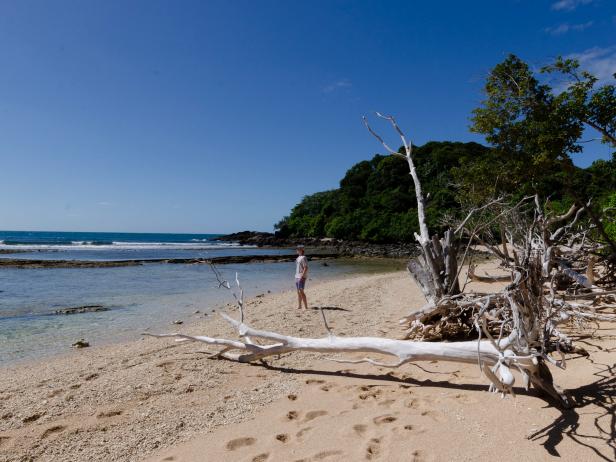
Franklin Islands National Park
Watching waves roll in on Franklin Islands National Park after snorkeling in the Great Barrier Reef.
Photo by: Clint Shannon
Clint Shannon
Kayla Kitts, managing editor at Discovery who has traveled in 13 countries on both independent and guided trips, first travelled internationally as a student ambassador to France, Italy and Malta.
"This trip ultimately fed my passion for traveling and inspired me to take even more international trips," Kayla says.
After a few guided and independent trips, Kayla was able to pinpoint her preferred style of unplanned and laid-back travel.
While the benefits of international tours and travel for students are numerous, a few stand out. They will learn how to adapt when surrounded by different cultures, better understand diverse cultures, expand their perspectives of the world and develop meaningful connections with friends and fellow travelers.
Yes, these tours can be pricey, but the value can't be beat. Tour groups often host fundraisers and recommend grants and scholarships to ease the burden of cost. When possible, these tours are great opportunities for parents to join and share a potentially life-changing experience with their children.
Educational + Cultural Tours for Adults
Although some people can book their first flight ever, head across the world, plunge into an unknown culture and thrive, most of us have to work up to independent travel, especially international travel. Fully guided tours are perfect for anyone wanting to break into the travel world but nervous about their first trip. While great for first-time travelers of all ages, middle-aged to elderly adults who are finally finding themselves with time to travel may especially benefit from these.
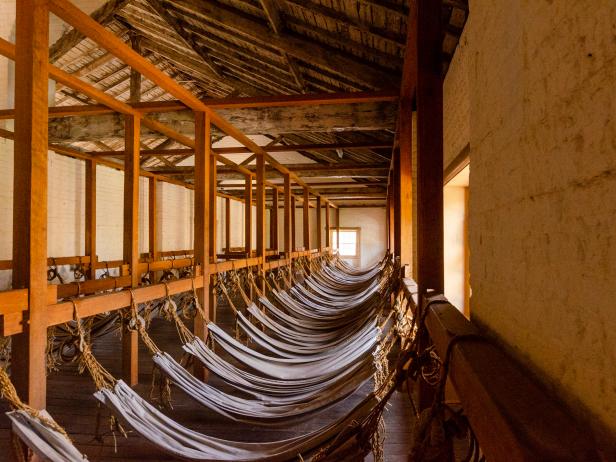
Hyde Park Barracks
Sun lights a restored prisoners' sleeping quarters in the Hyde Park Barracks in Sydney.
Road Scholar , Go Ahead Tours (a subgroup of Education First) and Artisans of Leisure are three notable companies offering guided tours to adults. Major museums like The MET and Smithsonian also offer tours to unique places. Like educational tours for students, these can come with a hefty price tag, but again, consider the value. Were you to spend weeks planning and booking the same trip with all the same experiences, opportunities and amenities, you will likely be paying the same, if not more.
These tours reduce your planning time to none, save you the hassle of figuring out transportation, solve language barrier issues, provide an opportunity to make great friends with fellow travelers and maximize the amount of experiences you'll have in a short period of time.
However, there are potential downsides to consider. If you prefer spontaneous and flexible travel, most of these trips aren't for you, but day guides and local tours can still offer so much.
Travel guides can and should be used by everyone to enhance an experience, even highly independent and spontaneous travelers. From education to adventure to culture, different levels of guiding and the right guide will help new travelers find their way and add value for experienced travelers.

Best US Factory Tours and Museums

Frank Lloyd Wright’s Chicago

Tours of Chicago

New York: TV and Movie Tour

Embrace '90s Nostalgia at These 'Sleepless in Seattle' Filming Locations

Thrilling Morocco Tours

Top 5 Key West Tours

Tour of Trastevere

5 Trips to Take If You're Having 'Game of Thrones' Withdrawals

What to Do in Morocco
More creepy content.

Paranormal-Themed Pajamas and Blankets for Your Next TRVL Binge Sesh 11 Photos

Jack Osbourne's Most Shocking Adventures 9 Photos

Plan the Perfect Summer Staycation 8 Photos

Tips to Avoid Hotel and Homestay Booking Scams 6 Photos

10 Over-the-Top Airbnb’s We’d Love to Stay in 11 Photos

The Best Travel-Size Toiletries to Bring On Your Next Trip 13 Photos

The Best Viral Travel Gear from TikTok 19 Photos

The Spirits in the Conjuring House Were Quick to Show Themselves Apr 7, 2023

Haunted History: A Shuttered Pennsylvania Nursing Home Is Home to Dozens of Trapped Souls Mar 30, 2023

Cult Leader Charles Manson Controlled People from Behind Bars Mar 24, 2023

7 Best Pieces of Evidence Recovered By the Expedition Bigfoot Team Mar 14, 2023

6 Things Witnesses Said About the Roswell Incident Mar 10, 2023

Creepy Urban Legends From Each State Nov 16, 2022

Unraveling The Mysterious Death of Marilyn Monroe Feb 24, 2023

Is Abraham Lincoln Haunting the White House? Feb 16, 2023

Top 5 States For UFO Sightings Feb 8, 2023

Amityville: Inside the Case that Rattled a Seasoned Paranormal Investigator Jan 30, 2023
.jpg.rend.hgtvcom.231.174.suffix/1674758726773.jpeg)
This Doll Might Haunt You Just Because You Saw Her Photo Jan 26, 2023

7 Times a Ghost Was Caught on Security Camera Dec 14, 2021

11 Eerie Urban Legends of New Jersey Jan 6, 2023

This Teddy Bear Can Tell You If Your House Is Haunted Dec 22, 2022

Gifts for the Aspiring Ghost Hunter in Your Life 9 Photos

Ornaments for the Paranormal and Supernatural Obsessed 11 Photos

Get To Know Chuck & Karama, Hosts Of The ‘Pop Paranormal’ Podcast Dec 13, 2022

12 Days of December UFO Sightings 13 Photos
Creepy urban legends from each state 50 photos.

A Massachusetts Family Fled Their Home After Chilling Door-Camera Footage Nov 22, 2022

6 Museums That Are Home To Creepy And Mysterious Artifacts Oct 31, 2022
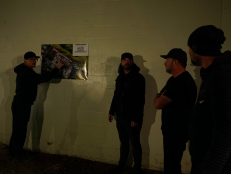
10 Terrifying Shows To Get You In The Halloween "Spirit" Oct 31, 2022

Meet Kimo, The High Seer Who Doesn’t Do Fear Oct 28, 2022
Follow us everywhere.
Join the party! Don't miss Travel Channel in your favorite social media feeds.
More From Travel
- Sweepstakes
- Stream Travel Channel
- Ways to Watch Travel Channel

- Privacy Policy
- Visitor Agreement
- Online Closed Captioning
- Accessibility
- Discovery, Inc.
- Do Not Sell or Share My Personal Information
- Food Network
- Travel Channel
- Cooking Channel
- Discovery.com
- © 2024 Warner Bros. Discovery, Inc. or its subsidiaries and affiliates. All rights reserved.
14 Pros and Cons of Being a Tour Guide
Home / Pros and Cons / 14 Pros and Cons of Being a Tour Guide
Get information on Travel Agent Training programs by entering your zip code and request enrollment information.
Trending Careers

So many people around the world love to travel and wish they had a job where they could do both simultaneously.
One such way to do so is to become a tour guide, which allows you to travel locally, domestically, or internationally and get paid to do so!
While this may sound like a glamorous dream job, there are some drawbacks as well as it is not just adventure and excitement every day.
To learn more about becoming a tour guide, it is important to consider the pros and cons before deciding. Keep reading to learn about this interesting career!
Table of Contents
1. Can Work in Different Locations
2. improve people skills, 3. interesting work, 4. learn about different destinations, 5. learn new languages, 6. no traditional office, 7. work with a variety of people, 1. deal with difficult people, 2. immediate changes in schedule, 3. low job security, 4. not lucrative, 5. reliant on seasons, 6. subjected to inclement weather, 7. work holidays and weekends, pros and cons of being a tour guide – summary table, should you become a tour guide, pros of being a tour guide.
Becoming a tour guide has numerous excellent benefits, with the best being:
Depending on the tour guide type, you could work in a variety of locations.
Some tour guides offer walking tours around the town or city, others manage tourists going on day trips to sites further away.
Some tour guides are involved with multi-day trips around their country while others travel internationally with groups.
The best tour guides get to embark on international trips with larger tourist groups.
As a tour guide, you really get to work on your soft skills through various interactions with tourists, other guides, and employees at different attractions.
Throughout your daily routes, you encounter countless individuals, some pleasant, some quiet, some difficult, some loud, and you learn how to deal with distinct types of people.
Since you get the opportunity to gain experience about all types of sites, attractions, and cultures, being a tour guide presents a variety of interesting experiences and interactions that lead to beautiful journeys.
No day will ever be boring or the same and there is a spontaneous aspect to being able to visit various locations.
As a result of these travels, you get to learn about different destinations.
Given that the tour company will give you specifics on what they want you to cover in the tour, you will likely master all the interesting details about your town or city first.
Next, you may move on to one day or multi-day trips, where you will learn about additional destinations and finally, you can graduate to the international circuit to learn about other countries, all of which make you a more well-rounded tour guide and individual.
Since you are meeting a variety of people, you pick up bits and pieces of different languages.
Some companies, they will pay for you to learn other languages since it is such a valuable skill that helps with the customer service you provide.
Other companies may not foot the bill, but there are plenty of apps and free online learning opportunities that can help you improve your tour guide service.
One of the best aspects of being a tour guide in the world is your office.
Many people are not built to sit in cube farms all day for their entire careers.
Some love being outside and looking at beautiful sites.
Best of all, you can work without a boss or colleagues watching over you, which can really take the stress off your back.
The final major benefit of becoming a tour guide is the opportunity to collaborate with people from different locations, countries, and backgrounds, with a variety of experiences.
Although you may only be together for a short time, you develop friendships and relationships with your clients.
This also allows you to gain experience more about different religions, languages, and cultures.
Learning more about your clients is an excellent way to cater the sites to them while providing exceptional customer service!
Cons of Being a Tour Guide
While there are many benefits to becoming a tour guide, it is important to also understand the drawbacks.
Whether you are a tour guide in your local city or a traveling tour guide, you will have to deal with different people with unique needs and personalities every day you work.
Sometimes, there are problematic and difficult individuals who are not well-behaved, complain about everything, or are generally miserable and want everyone to know.
To deal with this individual type, you must have excellent patience, professionalism, and customer service.
In many instances, being a tour guide is spontaneous, meaning there is little to no notice of schedule changes.
This is because clients’ schedules changes, there are cancellations, and often no-shows.
This can be incredibly frustrating when you need to make rent payments or have a major purchase approaching.
Being a tour guide has low job security, which can last for an extended period.
Tour guides can easily be replaced, especially if not great at their job.
There are many others in cities and towns across the world that can replace a tour guide.
If you are laid off or fired, it can be difficult to find another job.
Even in the largest cities, there are only so many tour companies, so word gets around about different employees within the industry.
One of the greatest issues of becoming a tour guide is it does not pay well.
As a result, you may need a second job to keep up with your payments and necessities.
This is especially the case in high cost of living areas.
That second job could be mundane and really not something that interests you.
Also, due to the low salaries, elderly poverty is an issue for many who can only afford to live, but do not have enough money to save for old age.
That means, you cannot be a tour guide your entire life, you need to have other skills.
The “high” travel season is typically over the summer between the end of May and the middle of September, depending on the location.
This is because children are out of school and teachers are off for the summer.
That means for tour guides, this is the busiest time of the year, and lucrative.
However, the remaining seasons are likely to be slow, so many companies temporarily lay off tour guides to save on costs.
Therefore, it is critical to have a second job as a backup for the offseason.
As a tour guide, you will spend most of your time outside, escorting groups to see beautiful natural landscapes, ancient monuments and architecture, and other local attractions.
That means, during inclement weather, you and your tour group may not get to see specific attractions, and you are subjected to rain and snow.
Aside from the tourist complaints about not being able to see a site, you could fall ill with constant exposure to the elements.
The final major drawback of becoming a tour guide is you will likely have to work holidays and weekends.
Your schedule is dependent on when tourists decide to book your services.
Most tourists are going to book in the summer, on weekends, and over holidays.
This could disrupt trips you want to take with your friends or family.
Instead, you must focus on strangers and ensuring they are having a good time.
Deciding whether to become a tour guide is a personal decision based on your individual preferences.
As a college student, this seems like a wonderful way to make money to put yourself through college.
However, as an older and more seasoned employee in any field, it may not be the best to make the career change, unless retired and looking for an interesting activity.
In any case, it is critical to weigh the pros and cons of becoming a tour guide before you decide.
Can you deal with a low salary for the rest of your life, or is this just a temporary, fun job?
Do you value knowledge and experience more than money?
While many of these questions relate to earning money.
It is a critical aspect of this job.
While there are many perks, if you cannot pay your bills then you will need to consider getting a second job, which you may hate.
Like with deciding upon any career path, many choices and considerations must be made to ensure you have a fruitful and enjoyable career!
Related Resources
- How to Become a Tour Guide
- 14 Pros and Cons of Being a Travel Agent
- 14 Pros and Cons of Being a Historian
- 14 Pros and Cons of Being a Flight Attendant
4 thoughts on “ 14 Pros and Cons of Being a Tour Guide ”
The role of a tour guide encourages continuous learning. You’re always researching, staying updated on local history and current events, which deepens your understanding of the destination.
Handling difficult situations can be challenging. Dealing with difficult tourists, emergencies, or unexpected situations can be stressful. Tour guides need to stay composed and handle situations with grace and professionalism.
Good read! Tour guides play a significant role in educating people about history, art, and local customs. This intellectual engagement can be personally satisfying.
Many tour guides enjoy the flexibility of their schedules, allowing them to pursue other interests or spend time with family and friends when there are no tours to conduct. It’s like a remote work.
Leave a Reply Cancel reply
Your email address will not be published. Required fields are marked *

13 Benefits of Guided Tours & Potential Disadvantages
W e have always been big advocates for independent travel, but we have realized that this is a type of travel that’s not for everyone.
Some people may prefer guided tours over independent travel, because they offer security, ease of planning, and the chance to meet others.
There have been certain times when we have considered taking guided tours instead, especially when we’re not sure about a place and how to get around.
We have come to realize there is no one right way to travel. Whether you take a guided tour or travel independently largely comes down to personal preference and what you want to get out of a trip.
So if you’re thinking about taking a guided tour over traveling independently, here is a complete guide to the benefits of guided tours so you can make an informed decision about whether it’s right for you.
Is A Guided Tour Better?
2. comfort levels, 3. meeting people, 4. information, 5. less hassle, 7. some areas suit guided tours, 8. helps with the local language, 9. completely planned itinerary, 10. discover hidden gems and local cuisine, 11. exclusive experiences, 12. creates great travel stories, 13. someone to take photos for you, 1. do your research, 2. be very clear on your travel goals, 3. check the age group and vibe.
- 4. Don't try to fit too much in
5. Check Their Safety Procedures
6. think eco-tourism, 7. get a clear outline of costs, 8. read reviews of the guides.
There are many benefits to travel with tour companies and they really do suit the purposes of a lot of travelers.
In fact, now that we have a child, I am more inclined to consider guided tours for specific regions.
I think back to me riding around on a pick-up truck on the wild and dangerous roads of Africa and I think, “do I really want my child to accompany me in difficult independent travel like this?”
Yes and No.
While I’d love my kids to have this cultural experience, this momma-bear-fearful-heart of mine probably could not stand the pressure.
For families with small kids looking to travel to remote locations and off the beaten path destinations, then a guided tour is probably better than independent travel.
Benefits of Guided Tours
Some people just do not have the time for independent travel. Let’s face it catching local transport often takes a whole day or more to get from one destination to another.
If you consider the fact that most Americans get on average only 2 weeks paid holidays, independent travel may not work.
Even those in other countries who can get 4-6 weeks off, with this limited time to travel independently you really have to stick to one small region in order to make the most of your stay.
This is where guided tours with tour companies can prove to be a great choice for those who want to see as much as they can in a small space of time.
Try to limit the number of countries you visit so you can experience more of the culture of your destination.
Independent travel is not easy. A lot of travellers, especially when first beginning their around the world adventures, start with group travel on guided tours.
This helps them to adjust to this new lifestyle, slowly stretching the comfort zones out until they feel confident enough to take it on themselves.
For some people the thought of trying to order local food in a foreign country causes them to faint at their knees.
Instead of never leaving the house, a guided tour would be a great way to travel within their comfort zone limits.
Many of my friends kicked off their living in London/ European tour with a Contiki tour. They made a lot of new friends because of it, which meant that they arrived in London to live already knowing someone.
This can be very reassuring to those shy first-time travellers who might not be so great at getting out there and meeting people on their own.
After my beerfest tour, we met up with our travel friends from the tour group several times upon return home to London. It was great to have so many new friends who all shared a common travel memory.
Sure, at first you are a bunch of strangers and there’s always the off chance that you don’t get on, but usually you’ll find that people you meet on group tours are like-minded people, and you don’t have to be an extrovert to fit in.
There is no better way to travel than with a group of friends, so if you’re a first-time traveller and worried about social interaction, this is one of the greatest benefits of group travel.
Even when I am traveling independently, there will be many times I will take a guided tour of an historical site or cultural experience .
This is because I want to learn more about the place I am visiting. And I don’t want to be walking around trying to read it from a guide book while I am there.
I want someone to point out certain features, tell me stories about the area and relay the important information. Guided tours are a great way to sit back, absorb the area you are in and allow someone else to tell you all about it.
Travel planning takes a lot of time and research and then of course you need to be constantly adapting and changing these plans as you are going along.
You have to decide how to get there, how to get around, where to stay, what to eat, what to see, how to change money and who to talk to for help.
The list of tasks never end, it can be tiresome, cumbersome and just plain irritating.
Taking a guided tour means removing all the hassle of the planning stage .
Someone can take you by the hand while you concentrate on the only thing you want to concentrate on exploring, learning, eating, drinking, shopping and having fun.
Many people fear travel as they believe the world is unsafe.
A guided tour may give a person like this the opportunity to travel as they feel much safer. There is always someone watching their back and people who they can turn to for comfort when feeling afraid.
As I mentioned above, now that I am mum this is a very important factor in making travel decisions for my family.
There are certain travel experiences and destinations that only lend themselves to group travel and guided tours.
For example, going to Antarctica would be extremely difficult without being on a tour.
In Africa, night time safaris can only be done by guided tours, Robbin island can only be visited through a group tour and trekking to base camp, I’m sure would be best to be done on a group tour.
Contrary to what you might think, there are some countries in the world where English is not widely spoken. Language barriers are still a thing and can be a huge headache on your trip.
It always helps to travel with someone who can speak the foreign language of that country, especially when you do travel as a large group.
If it’s your first trip abroad, having your entire itinerary planned for you is one way to make it stress-free.
Not only do they schedule all the attractions and travel experiences, but they also book your accommodation and transport, and even offer suggestions for the best places to eat.
This gives you peace of mind knowing you don’t have to plan a thing.
There will also be free time where you can enjoy some flexibility from the main itinerary.
This means you can explore more with your tourmates or simply hang out by yourself if you need a little me-time.
While you may have some bucket list experiences you want to cover, and tour companies do take you to them, they can also be a great way to discover hidden gems.
Whether you’re looking at a multi-day guided tour of a day tour, taking a tour with a knowledgeable local guide is a great way to find places that tourists don’t frequently visit. Like our guide in Petra who took us the back door in , which ended up being a spectacular 9 mile hike with it almost to ourselves.
Most tour companies hire local guides who know the areas well. They love to treat their guests with warm hospitality and insider’s perspectives of a country, as well as convenience.
This means you may have the chance to visit some exclusive attractions that other tourists cannot visit, such as visiting a homestay in one of the less touristy neighborhoods, or have a guided tour of a local farm.
Most of the time, the tour operator will have a partner in a destination who takes you on your travel experience, and they want you to get the full local experience.
What better way to get that than with a local themselves?
When I think back to some of my fondest travel memories, they are often funny stories that happened when we’ve traveled as a group.
Perhaps it’s a memory of sitting around a bonfire telling stories, or hiking up a mountain and cheering each other on when it gets tough, or snorkeling off a boat and seeing a turtle swim past.
Sharing these experiences with others is the most rewarding feeling.
When you’re traveling alone, it can be awkward and annoying setting up a tripod or using a selfie stick.
Traveling with a guided tour means you always have someone who can take nice shots for you.
You never know, they might even be better with a camera than you!
Tips for Choosing Tour Companies
Find those reputable companies that run guided tours through the destination you want to visit. Contiki are popular for Europe, but not for Asia. Ask around for advice and read reviews on travel message boards.
Also, most companies have a Facebook page, get on them and ask questions of past participants. Be absolutely certain that the tour company you choose is the best you can get for your travel budget.
Two guided tour companies we can recommend are G Adventures and Globus Travel. See next…
GLOBUS DISCOUNT JUST FOR YOU!
We’ve secured an exclusive yTravel discoun t: Save $100 per person on select 2023 and 2024 Globus and Avalon Waterway Vacations. Use the code: YTRAVEL when booking online at the Globus , Cosmos , and Avalon Waterways websites, by calling Globus and Avalon Waterways directly, or booking with a preferred Travel Advisor. Terms & Conditions .
What are your absolute must sees? What sort of experience are you looking for? Purely cultural, adventurous, photographic, or having a massive party?
Once you know what you really want, you’ll know the best tour company is for you.
Contiki is well known for its 18–35-year-old party type atmosphere. And on the flip side, one of my good friends will never forget unknowingly ending up on a guided tour of Europe that was full of pensioners.
Not really the experience his 25 year old self was looking for.
4. Don’t try to fit too much in
Do you really want to have a 5 minute ‘I was here’ experience, or do you want a more enriching experience? Less is more.
15 European countries in 15 days is going to leave you exhausted and you will not remember Germany from France . Trust me, you never want to get those two confused.
If you do your research properly and find a reputable company then I am sure you will discover they have adequate safety measures in place. Make sure they have the proper accreditation
Choose a company that not only respects the local environment, but the local culture as well. You want to make sure you are leaving a positive impact wherever you are going.
Make sure you know the costs, including any extras of your tour. Certain activities on tours may cost extra. You must know all this beforehand.
You would hate to turn up to the Serengetti on your African overland tour only to discover you needed to pay an extra $200, which you don’t have.
Know how many meals are included, what accommodation type is covered by the tour, transfers, etc. Tours should be able to give you a rough estimate of spending money you will need as well.
As discussed, a benefit of a guided tour is the knowledgeable tour guide who will be showing you the area and teaching you more about it.
Part of your research should be to find out what sort of guides the tours use and how knowledgeable they are.
We had a local Kenyan on our guided tour of the Massai Mara. He knew an incredible amount about the animals and the back roads he could take to find them. He really helped to make our first Safari experience a memorable one.
Final Thoughts on Advantages of Guided Tours
Whether you’re looking to travel long-term or simply looking to take a day tour from a city, you’ll find there are many advantages to guided tours over going independently.
We hope this guide helped you make a decision about whether to go alone or as a group.
Can you recommend any tour companies? Let us know in the comments.

9 Reasons to Choose a Guided Tour
A guided trip is a convenient and refreshing way to discover and immerse yourself in a new destination. All the trip details are already organized for you, and there’s a team to support you every step of the way. This allows you to get the most out of your travels without the hassle of planning transport, accommodations, and other logistics leaving you with time and energy to be fully present and appreciate the places and people you are visiting.
First thing first. When you book a tour with us, here’s what’s included:
- Round-trip Airfare – Except for our U.S. and Canada tours, you can book our group flight departing from the U.S. You may also choose to travel on a “tour only” basis to book your own airfare and meet the group at the destination.
- Transportation – Travel in a comfortable, air-conditioned motor coach with a professional driver. In-destination airport transfers (when joining the group flight), additional flights, and other required transportation are always included.
- Accommodations – All overnight stays are reserved in conveniently-located, first-class hotels.
- Many Meals – Enjoy daily breakfasts as well as select lunches and dinners. We often leave a few meals open for you to go out and choose your own culinary adventure.
- Sightseeing Tours – Admissions and reservations to the destination’s top highlights are all taken care of before you depart.
- Tour Director – A professional, English-speaking local tour guide is with you throughout the entire trip. These passionate individuals, a local from the destination you’re visiting, elevate our tours making them truly unforgettable experiences.
There are many reasons why signing up for a guided tour makes more sense than trying to go it alone. It’s helpful to understand what to expect. Read on as we unpack nine reasons you should choose a guided tour!
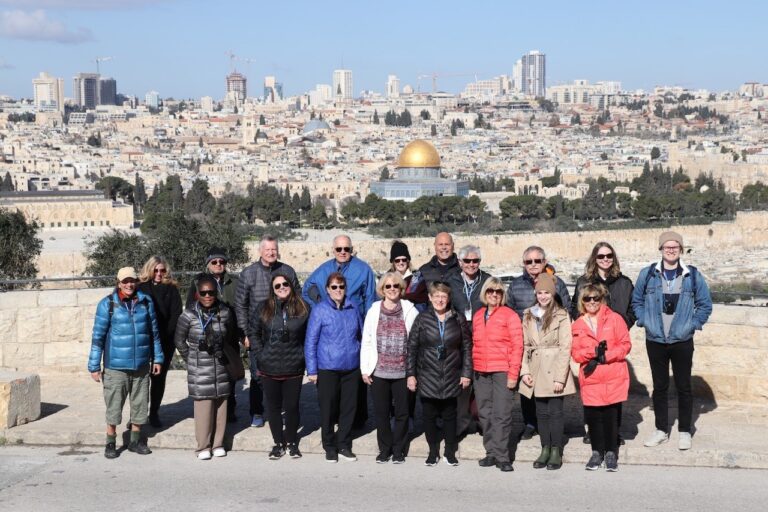
Convenience
Spend less time planning and more time exploring.
The great thing about a guided tour is that all the work is done for you. Our goal is for you to be whole-heartedly invested in your experience-which means the less you have to worry about, the better your trip will be. That’s where we come in; we combine all the components that make up the perfect trip, from hand-picked accommodations and comfortable transportation to the best sightseeing and experiences. No researching and booking multiple hotels, worrying about check-in times, or concerns about what transportation is best. And no wandering around aimlessly trying to get your bearings or waiting in long lines for tickets. Our well-organized itineraries make sure you see all the best sites and hidden gems with free time mixed in too.
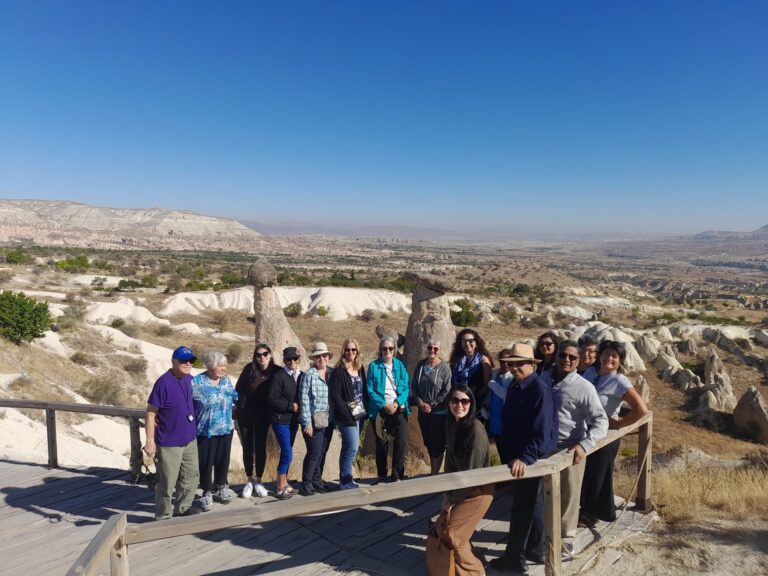
We know what’s best!
Our group of travel experts work hard to put together guided tour packages that tick all the boxes for a perfect vacation. Years of experience and connections around the globe make it possible for us to create itineraries that are well paced, educational, and include the ideal mix of iconic sites, hidden gems, and leisure time to explore independently.
We know how to minimize long travel days, ensure the pacing aligns best with the destination, find special tours you might not find yourself, and so much more. When we do the planning, you won’t waste a single movement of your trip!
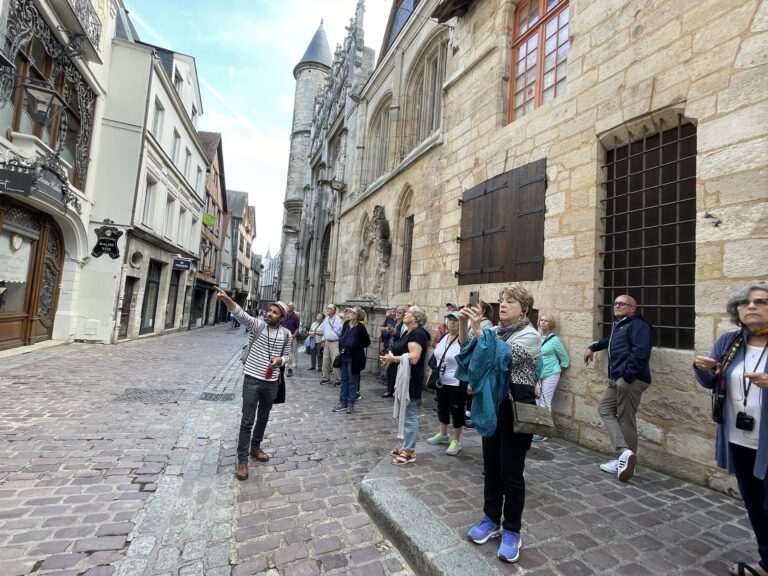
Our professional team of local guides and tour leaders enhance your adventure!
The benefits of traveling with an expert guide are arguably the best part of this touring style. The number one thing we hear from our travelers is how much they loved their guide and what they brought to the trip. It’s one of the reasons we see our guests return over and over again because it’s hard to go back to traveling on your own after you’ve experienced it.
It takes a special kind of person to be a tour guide. Ours are friendly, engaging, and passionate individuals who are there for you every step of the way. They speak English as well as the local language and are an invaluable resource that gives advice on everything and anything. They will share tips about what to do in your free time, show you the best restaurants and shopping in the area, and provide other helpful information. Tour guides are a wealth of knowledge and are happy to answer all your questions. They’ll do everything they can to ensure you have the very best experience when in their care.
While your local tour guide is along for the whole trip, you’ll also have the opportunity to interact with local guides throughout the tour. On these occasions, the guides will provide specialized information about the specific city or site you’re visiting.
Don’t forget about your driver! While you’re relaxing in the air-conditioned motorcoach as you travel between cities, your experienced and vetted driver will be at the wheel. They’ll know how to navigate the roads, how to avoid traffic, and where to park to get you to all your sites safely and on time.
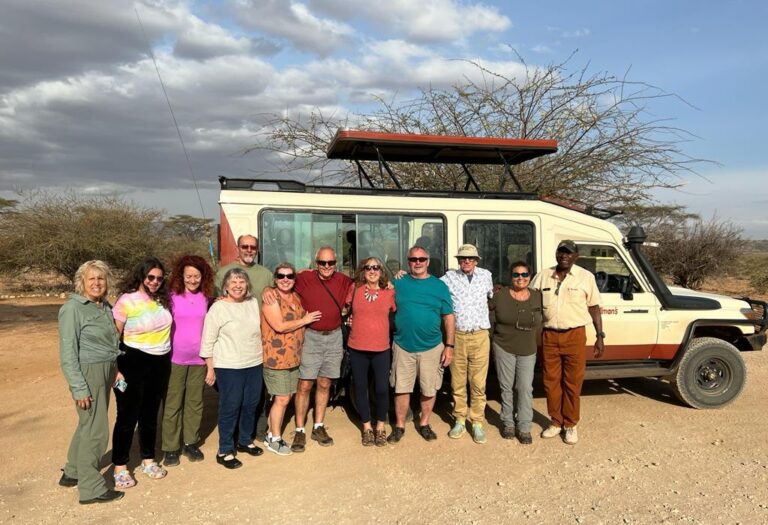
Participating in group travel opens up more opportunities!
Guided group tours cover the most exciting and interesting sights in a time-efficient manner. Tickets and visit times are pre-arranged, eliminating long waits or the chance of something selling out. We’re also able to secure entrance to places that can be difficult to confirm on your own, set up immersive interactions that connect you with local communities, and get access to special experiences that might not be offered to everyone.
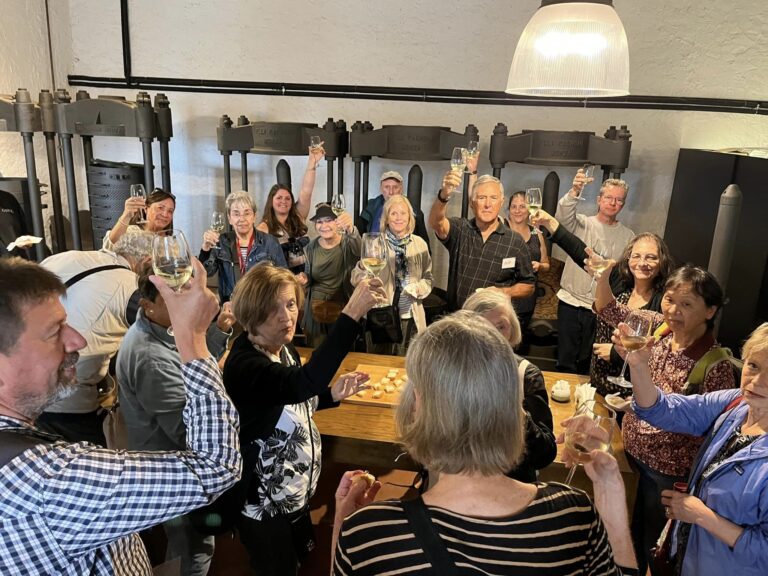
Cultural Immersion
Get first-hand knowledge of the destination’s customs, traditions, and people.
Many of our itineraries include visits to family homes or small businesses where you can meet and talk with locals beyond the usual traveler interactions with hotel personnel, restaurant servers, and other travelers. On our guided group tour of Italy with Sorrento and the Amalfi Coast , for example, you get the opportunity to stop at local wine and food spots to learn more about the cuisine and culture. This provides a more authentic experience than traveling on your own.
Also, tour guides will often give you personal insights about themselves. How they live, their religion and beliefs, what they do for fun, and other experiences they’ve had. You can learn a lot about the local culture by talking to your tour guide.
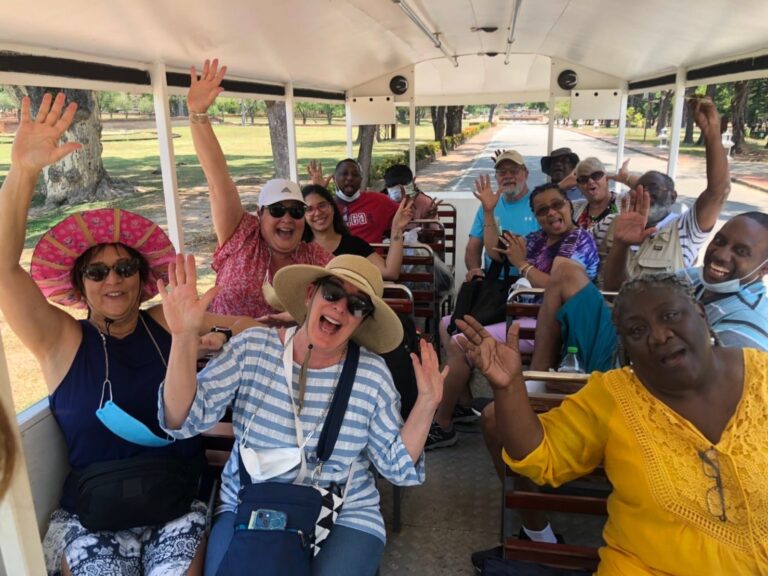
Companionship
A great way to meet others.
While we ensure that our group sizes are never too large, there is something special about traveling with other people that have mutual interests. Whether you’re traveling solo, with a spouse, other family members, or with friends, you’ll get to enjoy the company of others that are sharing the same experience as you. Our guests have forged life-long friendships with their groupmates, many even traveling together again on their next trip!
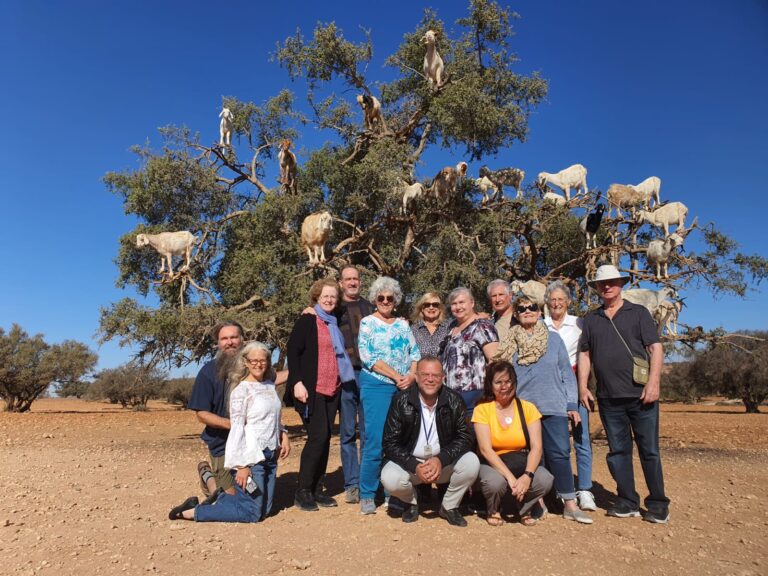
A full team of travel experts with you every step of the way!
From the first time you call to returning home from your trip, we are here to help you through every part of your journey. We’ll answer questions before you book and provide information as your tour is approaching, including visa and other entry requirements. And during your trip, not only do you have a professional guide with you, but we also have partners on the ground and an entire team located in the U.S. that’s ready to assist. The peace of mind you get from having round-the-clock support makes the trip even more enjoyable!
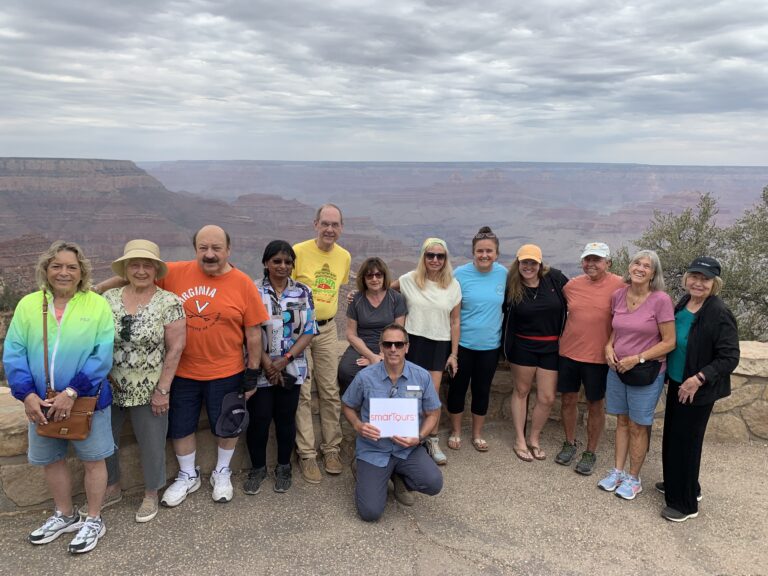
We negotiate the best rates for you to get the most value out of your package!
Some people think guided trips cost more than going on your own, but that’s not the case. Our team is able to secure group deals on flights, lodging, meals, admissions, and more and package them together, creating incredible savings for you! Guided trips save you money and provide the best value for the most inclusions without sacrificing quality. You can see the most incredible sights and have the best time without worrying about breaking the bank- what’s better than that?

Someone always has your back!
Guided tours are a safer way to travel than exploring on your own. We carefully vet our hotels and itineraries with safety in mind. Tour guides are fluent in the local language and are trained to problem-solve in difficult situations, including medical emergencies. Having them around is extremely beneficial should things not go as expected. When you travel with a group, you have peace of mind knowing you’re under the care of people who know what they’re doing.
Ready to join a group tour?
If you want to take the hassle out of planning and stop worrying about the safety and logistics of your trip, then signing up for a guided tour is a great choice. The comfort and ease of having everything organized for you add to the already incredible value a group tour offers. Plus, the extra support and experience of a guide, and the chance to travel with and meet like-minded people, make a guided group tour even more special. Join us and experience it for yourself!
Whenever you’re ready to take a guided tour for your next vacation, reach out to us – we know how to see the world!

- North America
- South America
- Health & Safety Information
- Passports & Visas
- Travel Insurance
- Travel Smart Blog
- Senior Travel
- Solo Travel
- Travel Alerts
- Frequently Asked Questions (FAQs)
- Deals Newsletter
- Refer a Friend
- Veterans Discount
- smarTours Catalog
- Why We’re Different
- How We Travel
- In the News
- Terms and Conditions
- Privacy Policy
Destinations
Ways to save.
- Find a Roommate
Join Our Email List

The Pros and Cons of Guided Tours
As travel bloggers, we face a very real dilemma: Do we try to see and experience as much as possible during our trip, or do we allow ourselves more time to explore and wander at our leisure?
Both approaches have their own unique benefits and drawbacks – and if you find yourself wondering which is right for you, this blog will help you decide!
The Pros of Guided Tours
1. you get to see all the major points of interest. .
We took a tour bus to Mount Rainier National Park and were able to see all the items on our bucket list:
- Mt. Rainier (of course)
- Grove of the Patriarchs
- Reflection Lake
- Christine, Myrtle and Narada Falls
2. You always have someone to take your photo.

What’s more annoying than getting home from your trip only to realize all you have on your camera are selfies of your giant face with few recognizable details in the background?
Gone are the days of the selfie stick and, with them, all the semi-decent shots of you and your fellow traveler(s). But fear not! When traveling in a group, you can ask your tourmates to snap a few shots for you.
Disclaimer: OK, so the photos might not always be great, but at least they show more than your right arm and face.
3. [For extroverts only] You get to meet other travelers.

There’s something special about sharing an adventure with a bunch of strangers. During a guided tour to the Loire Valley in France, we ate a private, family-style meal at Château de Nitray with our tourmates, and it ended up being one of our favorite parts of the entire trip!
4. You don’t have to worry about transportation.
There are few things more terrifying than navigating public transportation in an unfamiliar destination, especially one in which you don’t know the local language.
We found ourselves in Paris trying to navigate the RER for a trip to Versailles. Though we successfully purchased our train tickets at the kiosks, the digital screens didn’t show any trains going to Versailles. Turns out, the announcements they were playing on the overhead speakers (in French) alerted travelers that there would be no trains to Versailles that day.
When we got back to the land of free wifi (thank you, Hotel Regina!), we booked a coach bus. We were thankful to have reliable – and air conditioned – transportation on this trip and many others!
5. You get the inside scoop.
With a local tour guide, you get more than just what’s written on the brochure. You get an insider’s perspective and opinion on the locale’s history, impact, people, traditions, celebrations and more. You discover the hidden gems and the funny stories that give each destination its character.
The Cons of Guided Tours
1. it always feels rushed..

No matter what tour you take or how long you’re at your destination, a guided tour always feels rushed. We’ve missed out on photo ops and off-the-beaten-path adventures by taking guided tours during which there’s no time to stop for these last-minute detours.
The photo above was taken through a bus window during a guided tour. We wanted to beg the driver to please pull over and stop so we could capture this beautiful scene, but we were on a time budget and couldn’t afford to do so.
2. There are usually people in your footage.
If you’re traveling with a large group, chances are that some of your tourmates will photobomb you. In Mount Rainier National Park, Mike was carefully setting up a shot of me walking across a bridge, under which was a beautiful waterfall.
As I was “acting” my way to the other side of the bridge, a group of our tourmates thought I was lost and swiftly entered the shot to guide me to a different location. Bye bye, dreamy footage. Hello, photobombers.
3. [For introverts only] You have to spend time with other travelers.
For some travelers, being with a group of strangers all day is a nightmare. It really depends on the crowd – we’ve had wonderful tourmates and we’ve had loud, obnoxious ones (who you can hear in every video we shot).
If you have time, call the tour company in advance and ask about the size of the tour group. This will help you decide which tour to take – or whether to take one at all.
4. Certain tours might not be worth your investment.
Guided tours range in price, but some can be pretty expensive depending on your destination. In some cases, they might not be worth your investment at all.
Consider this: We booked our Mt. Rainier day trip in advance and figured the weather probably wouldn’t be great. What we didn’t know is that when the weather isn’t great, it affects your chances of seeing the mountain at all, which was the main reason we booked the day trip.
When I asked our tour guide what our chances were of seeing Mt. Rainier, he wouldn’t even say. For a tour that cost $130 per person, that was a pretty risky gamble!
Read more about our hunt for Mount Rainier .
5. Guided tours can be exhausting.

I know, I know – first-world problems. But guided tours can seriously take a toll on you!
Most of our tours have been 12-hour day trips. We get up at the crack of dawn, head to the meet-up spot with nothing but a cup of coffee in our stomachs and set off on a long and often draining tour.
This is usually the trade-off when you decide that you want to see everything on your bucket list.
Whether you’re booking a guided tour or not, we wish you happy travels and hope this blog post helps you plan your next adventure!
We’re going to spend some time roaming on our own during our next vacation in Anaheim, California. Be sure to subscribe for updates and follow us on Instagram at @travtwogether .
Share this:
- Click to share on Pinterest (Opens in new window)
Emily Malott
3 responses to “The Pros and Cons of Guided Tours”
So true about yours. I’ve always felt rushed and exhausted. So I book time a few days before and after your in the country I toured!
[…] Guided tours that are included in packages afford you the opportunity of exploring the surrounding area. As useful as it is to have a local tour guide showing you the sights, it can limit where you can go. Pre-booked excursions are particularly applicable to first-time visitors, as they can experience the best of the local attractions on offer. However, returning visitors may find it rewarding to add a window of flexibility in their itinerary to do some of their own exploring. […]
thanks for the pros and cons about tour .
Discover more from Traveling Twogether
Subscribe now to keep reading and get access to the full archive.
Type your email…
Continue reading

Traveling Without a Passport

8 Reasons Why Being a Tour Guide is the Best Job

Everyone is telling you to quit your day job, live the dream, escape your office cubicle and travel the world, right? You’re sitting at your desk reading this, dreaming of open roads and stunning sights, but probably wondering ‘how the hell can anyone afford that?’
The answer, my friends, is to earn while you’re travelling.
There’s a number of different paths to earning as you travel; teaching English overseas, working remotely for your company, becoming a virtual assistant or even travel blogging – but only one option that will enrich your travel experience. Becoming a tour guide is one of the most rewarding and exhilarating ways to see the world, learn about a country’s culture and history while sharing your love of travel with people just like you.
Here’s 8 reasons why being a tour guide is the best way to travel the world and still earn a living.
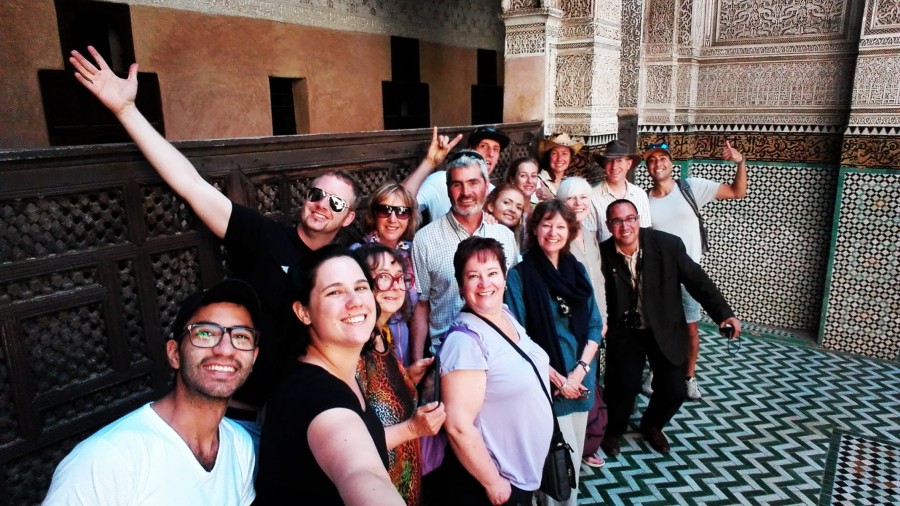
1. You’ll learn a valuable skill set for a future career
Tour Guides wear multiple ‘hats’ while running a trip. It may look like your guide is having a relaxed holiday alongside the group, but the reality is that a tour guide is a travel agent, therapist, accountant, event manager, historian, conflict resolution manager, tax and currency expert and professional public speaker. All skills which carry across impressively to any future career.
Depending on what types of tours you decide to lead, you’ll also be required to become certified in a few different core competency areas which are irreplacable skills to possess for your own travels as well.
2. You will see more countries & cities than you ever thought possible
In most cases, a tour guide does not just do the same tour loop for an entire season. A fully trained tour guide will have the opportunity to guide many different itineraries for their tour company – meaning you will visit, study and experience new destinations multiple times! Start racking up that country count, you’re about to become a professional full-time traveller.
See Also: The Truth About Being a Tour Guide: Exposed
3. You will be living the dream
You will be paid to travel. Your job, every day, will be to show first-time travellers their way around a new destination. As a tour guide, ‘work’ means being a part of someone’s happiest holiday memories. You are actually required to have fun for a living while travelling! Be warned – most of your friends back at their desk jobs will be insanely jealous of your daily updates from Monaco, Barcelona and Bali.

4. You’ll become an expert on history, art and architecture
To be a truly excellent tour guide, you need to know your stuff, which means studying up on architectural styles, historical fun facts and the best places to eat, drink and party. This isn’t your boring old history teacher studying – think researching the funniest stories of a royal family or the perfect recipe for goulash to share with your groups.
Pretty soon you will be an expert in Corinthian columns, traditional eating habits in multiple countries and the hilarious history of inter-country grudges. Your pub quiz score is going to go through the roof once you’ve become a tour guide!

5. Your colleagues will be just like you!
Forget trying to make friends with Steve from HR who just doesn’t understand your wanderlust obsession. When you work in the travel industry, all your colleagues are as crazy about travel as you are! You will finally be surrounded by people who understand and encourage your need to see the world and experience new cultures. It will be a relief and inspiration all at once. (Sorry Steve)
See Also: The 11 Best Travel Jobs In The World
6. You can save while travelling
When you are guiding, your transport expenses, accommodation and some meals are all covered – meaning half of what you earn can be saved. With no rent, car payments or gas bills, you can accrue a decent amount in savings while you travel. This means that at the end of a season of guiding you will have some cash stashed for your own travel adventures!

7. You will become a destination expert
Knowing a destination inside out means you’ll know all the best restaurants, bars, cafes and insider tips to maximize the fun you’ll have while also getting the best possible price on meals and drinks.
8. You’ll have friends all over the world
Just like anyone who takes a tour, at the end of a trip you are best friends with the other people who shared the experience with you. That means, as a tour guide, you will have hundreds of best friends who were on your tours scattered across the world.
Next time you go backpacking in Australia, Mexico, South Africa or Canada you’ll have local friends from your tours ready to show you their home towns, and maybe even a free couch to crash on. What an excellent excuse to do even more travelling!
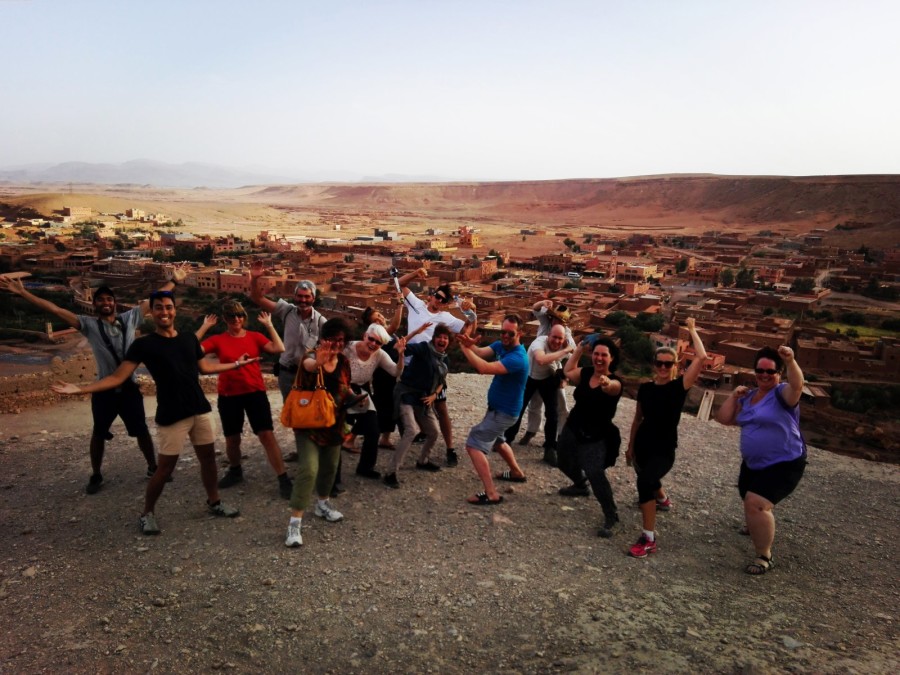
Becoming a tour guide isn’t easy, there are some intensive training and a long interview process, but if you manage to score the job, it is undoubtedly the best way to travel the world and still earn the cash you need to enjoy it!
So, are you ready to abandon the 9 to 5?
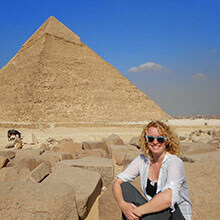
Carly Hulls
Carly Hulls writes at Austrian Adaptation about her expat life in Vienna and the places she discovers on her part-time travels. She is an Australian writer, traveller, brunch-fiend and book-nerd who can’t resist a good castle or historic monument. After 5 years travelling to over 34 countries she currently calls Vienna home, facing the daily struggle of the German language! You can follow her adventures on Facebook , Twitter and Snapchat @CarlyHulls.
Related Articles
- Destinations
- Tips & Tricks
Top Countries You Haven’t Been (Yet!)
Ever felt like you're being fed the same destination over and...
- Central America
Is Costa Rica Safe to Visit Right Now?
Costa Rica, known for its stunning beaches, lush rainforests, and abundant...
- Destination Guide
- North America
- South America
Your 4 Must-Visit Inclusive Destinations
Nothing connects people from different parts of the world and disparate...

How to Make the Most Out of Luscious Laos
Get unlimited access to the world's best travel stories. subscribe now., privacy overview.

Shopping Cart
Why good tour guides are important.
- July 28, 2023

The importance of good tour guides for a successful travel experience
When customers book a travel experience with your business, they come with expectations. They rely on your expertise, your local knowledge, and your ability to provide them with an amazing experience.
In case they booked a travel experience that involves a tour guide, they want to travel worry-free. With someone else having the responsibility. The quality of the guide is therefore essential for satisfied customers. A good guide is able to boost the travel experience and add additional value. While a lesser guide does the opposite: leaving customers disappointed and dissatisfied.
A good tour guide does not only boost the travel experience for customers. But they are also responsible for making sure the trip creates positive impact on the destination and minimises negative impact.
“Local tour guides and drivers are the principal interface between tourists, the travel experience, the local community and the environment, and therefore have a huge responsibility.”
In this article
- The importance of good tour guides
The qualities of a good tour guide
Tour guides and sustainability, sustainable tour guide training, reminder guidelines.
- The significance of personal connection
Value your good tour guides
Tour guides have a huge responsibility during the travel experience. Not everyone is or can become a good tour guide. We’ve listed six most important qualities for a good tour guide to take into account.
1. Outgoing and engaging
To make travellers feel comfortable during a travel experience, the tour guide needs to be enthusiastic, outgoing, and engaging. Their task is to involve all people in the group and to create a happy and safe environment. They should be easily approachable for questions or concerns and also invite travellers to be curious and ask more questions.
2. Good communication skills
Besides being outgoing and engaging it’s important the tour guide has good and clear communication skills. This is necessary to make sure everyone is aware of the (day) planning and what’s expected of them. Good communication skills also come in handy when explaining specific do’s and don’ts in a sensitive destination.
3. Knowledgeable and passionate
The true added value of a good tour guide is their local knowledge. When visiting a destination, travellers are interested in for example local habits, foreign fruits, and history facts. They will always look at the guide first for further explanation and background information. Preferably, the tour guide is an expert and passionate about the destination.

4. Organised and punctual
Travellers having to wait on their tour guide because they’re late, are often stressed. And might be dissatisfied about the start of the travel experience. So, it’s important for the guide to always be on time, to have a clear structure and to follow the set itinerary . In case the customer requires a change, this could be possible but only when feasible and well-planned.
5. Patient and able to manage a crisis
Not all travellers are easy-going and flexible. A good tour guide knows how to take care of slower or difficult people. They have to remain patient at all times. They also know what to do in case of an emergency: handling the crisis while maintaining a calm atmosphere where possible.
6. Trained and qualified
It’s not a fundamental quality of a good tour guide, but it does add value to have trained and qualified guides. Guides with an official guide training and/or license are professionally trained to be a tour guide. They are able to organise and run a travel experience following official guidelines.
“We know that it’s not possible to provide an unforgettable travel experience without an excellent tour guide” – Anna Grodzki, manager of Matoke Tours Uganda.
When you are invested in good tourism , you want your travel experiences to be operated in a responsible way. Your tour guides are at the front of the operations and responsible for what actually happens during the travel experience. Therefore, it’s important they are aware and trained on your sustainability policy and practices.
In terms of sustainability, there are five main tasks of a tour guide during a travel experience. By adhering to these guidelines, they’re ensuring a responsible and good travel experience.
1. Treating local communities respectfully
Especially during community-based travel experiences, but also when simply visiting a local market, treating locals with respect is key. Tourism should benefit the local communities and provide positive impact. The tour guide sets the right example by treating locals with respect and ensuring the travellers do as well. A good guide also encourages authentic interaction.
2. Protecting the natural resources
Same as treating locals with respect, natural resources should be protected and well taken care of. This entails not touching and taking any protected flora and fauna from the environment, staying on the tracks, and always taking (plastic) waste out of nature . The guide is responsible for making sure travellers adhere the same guidelines.

3. Ensuring animal welfare
Travel experiences with wildlife are always sensitive and for the sake of the animals, tour guides have to make sure they’re treated well. Not only do they again set the right example, they’re also responsible for reporting mistreatment of animals. Their role is to explain to travellers why certain (captive) animal travel experiences are a no-go and highlight the animal-friendly alternatives.
4. Driving safe and responsible
When driving, the tour guide needs to follow responsible and safe driving guidelines. Keeping to the speed limits, staying on the designated roads, and turning off the engine when standing still are basic aspects. Also, the use of mobile phones is not responsible driving behaviour. In case of safaris , the guide is expected to keep a clear distance from wildlife and to always give them right of way.
5. Raising awareness and educate travellers
During the travel experience, it’s the tour guide’s responsibility all travellers behave responsibly. Even though they should already be informed before their trip, the guide’s task is to remind them and to explain certain rules and regulations. It’s about raising awareness and encouraging travellers to contribute to good tourism during their travel experience.

The most efficient way to make sure your tour guides are following your good tourism practices is training. Provide them with your sustainability policy and explain its practical implementation. Include tasks and guidelines they can relate to and also easily put into practice.
Tour guides are more likely to comply to (new) guidelines and rules if they’re part of the development process. And if they feel they’re contributing to a good cause. Organise a brainstorm session or workshop, ask for their opinion and give them a say. They have more local knowledge and can come up with interesting practices that are useful for everyone.
Best practice example
Matoke Tours’ specialised travel guide training program helps local guides excel in cultural tourism and outdoor adventure tours in Uganda.
To remind them about their training, develop a short one-page document with the practical sustainability guidelines. These guidelines can either be a reminder or a supplement of the actual training. It’s also very valuable to provide to new or freelance tour guides you’ve never worked with before.
By providing tour guides with physical guidelines, they’ll know exactly what’s expected of them on the job. Include the guidelines in their contract but also place them in the vehicles. Not only are they be reminded of it all times, but travellers also notice your effort and their commitment.
If you don’t work with local tour guides directly, make sure your local partner informs and trains them on your basic (good tourism) principles.
“90% of travellers want to experience a destination ‘like a local’ – GetYourGuide”
The significance of authenticity and personal connection
Tourism today is all about authenticity and personal connections, making incredible travel experiences possible. Beyond having knowledgeable and responsible guides, it’s the genuine stories they share that truly captivate travellers. People no longer just want to sightsee; they yearn to experience a destination “like a local.”
A recent survey by GetYourGuide revealed that 90% of travellers express a strong desire to explore a destination from a local’s perspective. Notably, over 60% of millennials emphasize the importance of authenticity in their experiences. This highlights the growing significance of genuine encounters that resonate deeply with travellers. And who could be better suited to foster these connections than knowledgeable guides who possess unique insights into the destination?
Establishing a personal connection with travellers is essential. When travellers bond with their guide, they feel at ease, allowing them to immerse themselves in local culture with curiosity and enthusiasm. The guide becomes a cherished companion, sharing personal stories, historical backgrounds, and adjusting narratives spontaneously based on the travellers’ interests.
To cultivate this essential connection, we present four key tips:
1. Showcasing guides on your website
Provide potential travellers with a glimpse into the personalities and expertise of your guides by featuring them on your website . Introduce each guide, highlight their unique backgrounds and experiences. When travellers can familiarise themselves with the guide beforehand, it boosts excitement and comfort right from the beginning of the journey.
2. Inquiring about travellers’ interests
Prioritise understanding your travellers by asking about their interests after booking. A brief, optional survey with multiple-choice questions about their favorite foods, animals, and other relevant preferences can offer valuable insights. Armed with this knowledge, your guides can create personalised experiences tailored to each individual’s interests.
3. Embrace flexibility in itineraries
To foster authentic and personalised connections, avoid strict scripts and itineraries. Allow your guides to integrate the travellers’ interests gathered from the survey and tailor the experience accordingly. While ensuring essential experiences are covered, the flexibility to accommodate spontaneous detours, such as visiting a local food market or discovering a hidden gem, will enhance overall satisfaction.
4. Encourage engaging conversations
Motivate your guides to engage in meaningful conversations with travellers throughout the experience. By actively listening to their needs, preferences, and curiosities, guides can better understand the group dynamics and adjust their storytelling accordingly. This creates an environment where open dialogue is valued, fostering cultural exchange and authentic connections.
Good and responsible tour guides are hard to find but worth so much if you have found them. Invest time or money in working with reliable partners or train guides yourself. Taking good care of your guides benefits your business and make you more successful long-term.
Committed and happy guides do their best to provide your travellers with the trip of their lifetime by taking that extra step. When done well, this results in satisfied and hopefully repeating customers.
You must be logged in to post a comment.
You have been working all days and you have been good to me and helping me with your good institution learning and guide me through good profession
Great to see you’re benefitting from our content. Looking forward to support you in completing the online course Samuel!
Good article on tour guide. I personally liked this article and will train our local tour guides as mentioned in this article. Once again thanks for sharing this article.
For ur kind information I’m a tour operator based here in Kathmandu, Nepal.
Very good to hear you liked the article and that you’re going to put it into practice. Good luck!
Very practical and informative guidelines. Ii has added alot to my knowledge as tour guide.
Very good to hear Adam!
Anne de Jong

Start your journey with our free resources
Get free tools to transform your travel business, delivered right to your inbox.
Explore free resources
Read our latest library additions

How to communicate sustainability effectively

How to integrate sustainability across your website


Understanding Gen Z travel needs and demands

African Safari Tours
- Arusha, Tanzania
- [email protected]
- Call/ Whatsapp +255 745504340
12 Reasons Why Good Tour Guides Are So Important
Top 12 reasons why good tour guides are so important.
A good tour guide can make or break a travel experience. Whether you’re exploring the ancient ruins of Machu Picchu, navigating the bustling streets of Tokyo, or embarking on a safari in the Serengeti, the quality of your guide profoundly impacts your journey. Here are 12 reasons why good tour guides are so essential to a memorable travel experience.
Reasons 1: In-Depth Knowledge
A good tour guide is a walking encyclopedia of the destination. They provide rich, in-depth knowledge about the history, culture, and significance of the places you visit. This expertise transforms a simple tour into an educational experience, allowing you to understand the deeper meaning behind what you see.
Reasons 2: Storytelling Skills
It’s not just about facts and figures; it’s about how they are presented. Great tour guides are exceptional storytellers. They weave historical events, local legends, and personal anecdotes into a narrative that captivates and engages you, making the experience more immersive and memorable.
Reasons 3: Personalized Experience
A good tour guide can tailor the experience to your interests and needs. Whether you’re fascinated by architecture, cuisine, or wildlife, they can adjust the itinerary and focus on what excites you the most. This personalization ensures that you get the most out of your tour, making it unique to you.
Reasons 4: Cultural Bridge
Tour guides act as a bridge between you and the local culture. They help you understand customs, traditions, and social norms, preventing cultural misunderstandings. This cultural insight enriches your experience and allows for more meaningful interactions with locals.
Reasons 5: Safety and Comfort
Traveling in unfamiliar places can be daunting, but a good tour guide ensures your safety and comfort. They navigate complex logistics, from transportation to accommodation, so you don’t have to worry. Their presence provides reassurance, allowing you to relax and enjoy the journey.
Reasons 6: Access to Hidden Gems
One of the greatest advantages of having a good tour guide is gaining access to hidden gems that are off the typical tourist path. These guides often have insider knowledge of lesser-known attractions, local eateries, and secret viewpoints that you might never discover on your own.
Reasons 7: Enhancing the Group Dynamic
If you’re traveling with a group, a good tour guide plays a crucial role in enhancing the group dynamic. They ensure that everyone feels included and engaged, managing group dynamics and pacing the tour so that all participants are comfortable and satisfied.
Reasons 8: Problem-Solving Skills
Unexpected challenges can arise during any trip, from lost luggage to sudden changes in weather. A good tour guide is adept at handling such situations, using their problem-solving skills to adapt the itinerary and ensure the group’s well-being. Their ability to think on their feet can save the day and keep your adventure on track.
Reasons 9: Building Connections
Good tour guides often have established relationships with local communities, vendors, and businesses. These connections can enhance your experience. Offering you opportunities to engage with the local culture in ways that might not be possible otherwise. Whether it’s a behind-the-scenes look at a traditional craft or a special interaction with a local family. These connections add depth to your journey.
Reasons 10: Educational Enrichment
For those who travel to learn, a good tour guide is indispensable. They provide context and background that turn every stop into a learning opportunity. From explaining the significance of a historical site to discussing environmental conservation efforts in a national park. Their insights deepen your understanding and appreciation of the destination.
Reasons 11: Language and Communication
Language barriers can be a significant challenge when traveling in foreign countries. A good tour guide often serves as a translator, helping you communicate with locals and navigate through linguistic challenges. This ensures smoother interactions and a more enjoyable experience, allowing you to connect with the destination on a deeper level.
Reasons 12: Creating Lasting Memories
Ultimately, a good tour guide is a key factor in creating lasting memories. Their passion, knowledge, and ability to connect with their group elevate the entire travel experience. Long after the trip is over, it’s often the guide’s stories, humor, and insights that stay with you. Aaking your journey truly unforgettable.
Explore more about Tanzania Safaris
- Journeys: Tanzania Safari Experience
- Family Tanzania Safaris | Luxury Bespoke Holidays,
- Honeymoon Tanzania safari and Zanzibar packages
- Tanzania Safaris & Tours | Best Trips to Tanzania
In conclusion, a good tour guide is more than just a leader or an information source. They are the heart and soul of your travel experience. They have the power to transform an ordinary trip into an extraordinary adventure. Ensuring that you leave with not just photographs, but memories and insights that will last a lifetime. So, the next time you embark on a journey, remember the importance of choosing a tour guide who can elevate your experience to new heights.
Latest Posts

Featured Posts

5 Essential Tips for Planning a High-End Vacation Experience

Serengeti Osupuko Camp

Tarangire Osupuko Lodge
- Work with us
- Favorite travel blogs
- netherlands
- switzerland
- family travel
- food and wine
- trip planning resources
- accommodation guides
- travel gear guides
- itineraries
- packing guides
- travel gifts
- health and safety
cultural travel , tours
10 reasons to hire a local tour guide and take a tour on your travels.
This article may contain compensated links. See our full disclosure here
Paris, 1995. I saw all the sights. I climbed the Eiffel Tower, walked the Champs Elysée, took in the view from the tower at Notre Dame and was entranced by the scene playing out in the shadows of the Sacre Coeur.
I had “done” Paris. Or so I thought.
I liked travelling independently and figuring things out for myself. I never considered hiring a local tour guide.
Many visits later I know that I had barely scratched the surface of the iconic city.
My travel style has changed. These days I like to seek out local tour guides and experiences in the places I travel to. Here are the reasons why.
What's in this article
Learn about history and context from your local tour guide
Discover unique details and stories about a destination, learn about the local food culture, support the local community, uncover lesser known places of interest, take in the views from another angle, meet fellow travellers, learn about local art and artists, gain a fresh perspective from your local tour guide, save time and skip the line, favourite local tour guide and experience resources, my tour and experience wish list.
Michelangelo’s David is an incredible sculpture complete with intricate and precise anatomical detail. It is beautiful in its own right but your fascination only grows when you discover more about its background.
The process behind making the statue and the politics behind how Michelangelo was able to create his art are incredible stories I learned when I visited Florence and took a cultural tour.
Favourite history tours
London: Tour of the Houses of Parliament with afternoon tea Berlin: Discovering East Berlin by bike Florence: Accademia and Uffizi Gallery tour
DISCOVER: the best tours to take in Rome
Uncovering the stories and details of the places you visit make them come alive and cement them in your memory. Walking around Venice you notice stone structures in all the campi or squares.
These are the cisterns that ensured the city had fresh water. Some of them are elaborately decorated and beautiful but without them the city would not have thrived as they were the only means of accessing drinking water. We learned this on a walking tour as well as many other interesting details about Venice .
For me the stories behind what we see are important in making our trips special.
I think if you could only do one tour in the destinations you are visiting it should be a food tour.
We love tasting new foods on our travels. Apart from being delicious, food is central to most cultures.
Taking a tour with a local guide means you learn about the importance of ingredients and dishes to the local people. You go to local cafés and restaurants and avoid mass produced tourist traps.
While I love simply browsing produce markets we learnt so much about how the Rialto market is central to life in Venice on a recent tour. Plus we were able to try the most delicious figs.
All over the world food tours and experiences are the perfect way to learn about cultures and cuisines. One of my favourite experiences in Vietnam was a cooking class in Hoi An .
Vietnamese food is so fresh, tasty and delicious and the class opened my eyes to this thoughtful and balanced cuisine.
Eating a meal prepared by a local home chef is another food experience growing in popularity.
Sites like BonAppetour offer you the opportunity to find home dining experiences around the world. What a fantastic way to appreciate a destination and support local communities.
Favourite local food tours
Madrid: Tapas tour Venice: Rialto Market and food tour Italy: Local food festival Vietnam: Hoi An cooking class
Local tour guides and companies offering local experiences are predominantly local businesses. This means your travel spend is directly impacting the local community.
Why is this important? Recently I was shocked to learn about the impact of short trip tourism on local economies.
The pretty Belgian city of Bruges welcomes 7 million visitors a year however only 1 million of those stay overnight. Day trippers contribute very little to the local economy meaning that maintaining historical sites is difficult and the local way of life is under threat.
Choosing a local tour means you are directly supporting the local economy and people, helping to preserve the sights for future visitors. Some tours offer a deeper and more immersive experience connecting travellers with local communities.
London’s Unseen Tours works with homeless and ex-homeless people to provide unique tours of the city.
To discover tours that benefit local communities around the world go to Visit.Org
Favourite tours for supporting local communities
Thailand: Elephant sanctuary visit and tour London: Tour of the secret streets of Shoreditch Bordeaux, France: A wine tour of the Medoc region
Do you get a bit of a thrill when you discover a new place that is out of the way and a bit unusual?
I love searching beyond the obvious and finding places that aren’t on the popular tourist routes. One of my favourite discoveries on our Berlin bike tour was the hauntingly beautiful Soviet Memorial in the east of the city.
I am quite sure we would never have visited this monument had we not taken the bike tour.
While I am a big fan of simply wandering around a city exploring, sometimes your feet need a rest from walking.
It seemed 2016 was the year of visiting cities on canals and we enjoyed boat cruise tours in Amsterdam, Berlin, Strasbourg and a once in a lifetime gondola ride in Venice. Sitting back on a boat is one of my favourite ways to appreciate a city.
Bike tours are another great way to discover cities and regions as often a bike can take you to places that you can’t reach by bus and are too far to walk to. Many European cities like Copenhagen are incredibly bike friendly and touring by bike lets you experience the local lifestyle in a unique way.
In Paris we enjoyed a private tour of lesser known locations in the Marais and Latin Quarter in a Citroen 2CV. Zipping around the streets in an open top classic car was so much fun.
Favourite tours on wheels and water
Berlin: Bike tour of East Berlin Copenhagen: DIY city bike tour Amsterdam: Canal cruise and Rijksmuseum Paris: 2CV tour of hidden Paris in a vintage car
If you are travelling solo or extending a business trip a tour is a great way to connect with people on your travels. Hiking and food tours in particular offer a wonderful opportunity to sit and chat over a delicious meal and lovely wine. There is something about sharing a meal that connects people.
I made some firm friends on a tapas tour of Madrid. It was the day after Spain won the World Cup and the atmosphere was electric. After the tour some of us made plans to join in the huge celebration party. I probably would not have done that if I was on my own and would have missed one of my all time travel highlights.
Art tours are one of my favourite ways to discover a city’s street scene and galleries. Sure you can spend time on your own appreciating paintings and murals but they come to life when you understand the background to the work, techniques used and personal histories of the artists. On a recent street art tour of London we saw an incredible mural created by our tour guide and learnt about his process and motivation for creating the art.
Favourite art tours
London: Street art tour of London’s Shoreditch district Florence: Best of Florence: Accademia and Uffizi London: The National Gallery’s free one hour guided tours take place every day
Tour guides are usually very talented and interesting people. It takes a certain amount of confidence and passion to be a tour guide and I have rarely come across one that does not add deep insight and a sense of fun into their tours – often in a second or third language.
Our cheeky and irreverent guide on a recent tour of the Houses of Parliament ensured we had a wonderful time full of laughs while we toured one of the world’s most interesting buildings.
Given the skills needed to do this job I also commend Unseen London for supporting people who are homeless or have been homeless to become tour guides. Beyond the iconic sights of London there is a living city waiting to be discovered.
Favourite tours with fun and interesting tour guides
London: Houses of Parliament tour London: Hidden London by Fun London Tours London: Unseen London tours
If you are short on time or low on patience many tours offer skip the line or fast track options.
This is a great way to visit many attractions without the time wasting frustration of standing in a queue. As a horribly impatient person I choose this option wherever possible.
I also recommend these tours for people with health issues that mean standing for long periods of time is uncomfortable.
Top tours for avoiding lines
Paris: Priority access for the Eiffel Tower
New York: Express pass for the Empire State Building
London: St Paul’s Cathedral skip the line
Checking the offerings at the local tourist office and at your accommodation when you arrive is a good idea however I find many of the best tours are booked before you arrive. Make sure you prepare and book well in advance. The quickest and easiest way to do this is using online resources.
I am afraid Google is not your friend when trying to find local tours and experiences. Many local business do not have the experience and resources to rank highly in searches. I find the following sites useful for finding and booking tours all over the world.
What you get when you use these sites is the ability to compare tours, read objective reviews and choose activities that are monitored and vetted by experts. Some of these, such as Get Your Guide , have useful apps that hold all your ticketing information and allow you to book last minute tours on the go.
Remember when using these services the price may be a little higher to cover tour vetting and administration costs but I have found the convenience of using a one stop shop to compare tours and book tickets more than justifies that additional expense. Many of these sites offer a lowest price guarantee regardless.
Get Your Guide
Book tours, attractions, and activities online with the world’s biggest collection of things to do. Get Your Guide lists almost 30,000 activities in destinations from the four corners of the world and has a handy app allowing you to book tours and activities on the go.
READ: our full review of Get Your Guide tours platform
Authentic and immersive travel experiences from hand picked not for profit organisations around the world. If you want to support local communities when you travel Visit.org has the best list of tours and experiences.
TripAdvisor I always check TripAdvisor quickly for reviews of all the activities and hotels we choose when we travel. Now you can book tours directly on the site making it perfect for those who like to plan their trips using fewer resources.
Bon Appetour I think my favourite new food travel experience is the concept of home dining with a local cook. Bon Appetour connects travellers with home chefs for one the most memorable travel experiences you are likely to have.
Attractiontix This site offers great deals on tours and attractions worldwide.
I have a growing list of tours and experiences I would love to take with a local tour guide. Here is a list of some of the tours I covet. I hope it provides some inspiration for your next trip.
✪ A hot air balloon ride over Cappadocia in Turkey
✪ An Amazon cruise discovering local wildlife and learning from the local community in Peru
✪ Discovering local food producers on a food tour of Emilia Romagna and Bologna in Italy
✪ Taking in the sights and heady smells of the lavender fields tour of Provence
✪ A home cooked meal by a chef in Rome overlooking the Vatican City
✪ Watching the sunrise at Uluru the spiritual centre of Australia with a local guide
I’d love to know. Do you take local tours and seek out unique experiences on your travels? What has been your favourite unique tour experience so far?
This post contains affiliate links. This means I may receive a small commission if you click these links and choose to make a purchase. There will be no additional cost to you. As always, all thoughts and opinions are my own based on personal experience. You can read more about our affiliate policy on our disclosure page .
As seen in:
The creator, writer and photographer behind Untold Morsels , Katy has been travelling and tasting the world since she was a teenager.
Now the proud mum of twins, she hopes they grow up to share her passions of great food, wine and travel. Favourite destination: Italy
The Benefits of Travel Guides
By: Author Valerie Forgeard
Posted on Published: June 26, 2023 - Last updated: July 1, 2023
Categories Travel
When planning a vacation , there are many things to consider. One of the most important aspects of any trip is deciding what to do and see. A travel guide can be an invaluable resource in this process. Travel guides provide information on everything from attractions and restaurants to nightlife and shopping. They can help you make the most of your time away and ensure you experience all your destination offers. This blog post will discuss the benefits of using travel guides when planning a vacation. We’ll also provide tips on choosing the best guide for your needs.
Why Use a Travel Guide
Travel guides like the Lonely Planet or the Rough Guide help you decide the best time to travel, which places are worth your time and money, and what activities and attractions are available. They also provide background information about the place or culture you will visit.
A Travel Guide Will Help You Decide When Is the Best Time to Travel
When is the best time to travel?
When is the best time to travel? Well, it depends. In some cases, the answer is simple. If you want to visit a place where sunshine and warm weather are guaranteed, you should travel during the summer. You should visit during the festive season to experience the best of a country’s culture. But what if you are not sure when to go on your trip? What if you are not interested in festivals or the weather?
That’s where a travel guide comes in handy! A good travel guide will give you all sorts of information about different cities around the world and what makes each city unique
It Gives You Insight Into the Places You Should Visit
Whether visiting a city for the first time or an old hand, a travel guide can help you find the best places. It gives you insights into the best places to visit in any destination, from hotels and restaurants to stores and attractions.
A good guidebook will help you decide where to go and what to do there and give you an overview of local laws and customs so you know what is expected of visitors. For example, suppose you’re visiting a Maori in New Zealand. In that case, you may want to ask if there are restrictions on taking pictures or if credit cards are accepted everywhere in South America. You could also ask if tipping is necessary for all of North America.
A Good Guidebook Will Help You Decide Which Activities and Attractions Are Worth Your Time and Money
A good guide will help you decide which activities and attractions are worth your time and money. It gives you insights into places of interest and recommendations on where to stay.
It can also save you a lot of time by not having to do extensive research before your trip. With a good book, all your questions will be answered in one place, so you do not have to spend hours searching for answers on websites or forums.
It Provides Information About the Place and the Culture
To get the most out of your travel experience, it is important to understand the culture of the place you visit. A good travel guide will help you learn about the customs and traditions of a country or region and understand better the cultural differences visitors experience. He or she will also give you information about etiquette and social situations that may occur during your stay.
For example, is it customary to greet each other with a handshake or bow? Do people resent you if you greet them in the wrong way? Do they prefer small talk at meals, or do they want to eat in silence?
It Gives Recommendations for Accommodation
In a travel guide, you will always find recommendations on where to stay, from luxury hotels to Airbnb to camping if you’re on a walking tour or traveling by car. The recommendations are based on the authors’ research and their experience in the region of your travel destination. If you are looking for a cheap place with good WiFi, a guide will tell you where to find that.
You’ll Get Information About Great Restaurants and Cafes and Even Where They Are Located
You can get information about the best restaurants, cafes, street food, and even where they are located. This means you do not have to spend time walking around on Trip Advisor or around the city to find out where the good restaurants are. You’ll know exactly where to go when you are hungry and where you can get good food any time of the day or night.
You can also find out about different parts of the city. So if you want to eat something specifically for dinner, there is probably a place nearby that will suit your needs. Since these guidebooks are often updated from time to time by their authors, who have traveled extensively in the region in question, they offer not only up-to-date information but also unique insights into local customs and traditions that may be completely absent from other sources!
A Travel Guide Can Help You Find the Best Places to Go and the Best Stores to Visit
When you are traveling, you may want to go shopping. Some people like to store souvenirs when they go on vacation. Others like to buy gifts for family members or friends back home. If this is what will make your trip memorable, then you must have a list of things that need to be purchased before you leave.
It can be difficult to buy things while traveling if you do not know where to go and what items are available there. You do not want to waste time driving around town trying to find something that may not be available in the area you are staying in during your vacation!
A good guidebook will help you find the best places to store, such as markets, malls, and the best shopping areas, with a great selection of souvenirs and gifts for everyone back home!
A Good Travel Guide Will Give You Tips on How to Stay Safe
When traveling to a foreign country, you should first learn how to stay safe. Travel guides do not take you around a city or country. Instead, they tell you how to stay safe while you are on your own. However, they will still give you tips on how to stay safe. Here are some examples of advice you might find in your guidebook:
If someone tries to rob or attack you, give them what they want – it’s not worth risking your life over something material! And if the attacker already has a weapon (e.g., a knife), fight back only if necessary – there’s no point in hurting yourself any more than necessary!
Children should never be left unattended for fear of being kidnapped or otherwise harmed.
Do not go into dark alleys or other secluded areas alone. It is much safer to stay in well-lit areas with many people.
Why Choose a Tour Guide
When planning your next trip, remember that a great tour guide can be invaluable.
A good tour guide will show you where and what to do during your visit. He or she will help you avoid getting lost and ensure that you make the most of your time in the region.
A good tour guide will also give you information about the places they show you and give you an insider’s perspective on the history or culture of the place.
For example, if you visit Rome for the first time, a tour guide can tell you stories about how the ancient Romans lived and what they ate. With this knowledge, you can better understand why each place is important today.
A Great Tour Guide Also Makes It Easier for You to Interact With Locals
He can help you meet people and make friends if you are traveling alone. He can give you tips on where to stay and eat and even help you avoid scams that tourists might otherwise get ripped off with. They can also give you an insight into the local culture that is not possible for most tourists who only visit a place once or twice in a lifetime.
Having a Good Tour Guide Allows You to Ask Questions
As a traveler, you will probably have a lot of questions. You can ask to your tourist guide. Here are just a few examples:
A tour guide can also answer any questions about local transportation, including busses, trains, cabs, and more.
You Do Not Have to Worry About Getting Lost or Missing Anything Important
If you are worried about traveling alone, a tour guide is probably the best way to ensure you do not get stranded.
If you are traveling with friends or family, you can hire a tour guide to ensure everyone stays together and no one gets lost or separated from the tour group. However, remember that it is not a tour guide’s job to watch over unsupervised children; that is your sole responsibility.
You Save Yourself the Trouble of Organizing Private Transportation
If you have a full-time tour guide, transportation will likely be arranged by the tour operator as part of the package you book. This means you do not have to worry about your transportation and can focus on the fun parts of your vacation.
This can be especially useful if you have limited mobility or difficulty with language barriers. Also, if you are traveling with children or elderly relatives, it is often easier to have someone else drive, so they do not get tired or frustrated as quickly when trying to find their way around new places.
They Give the Latest Advice on Safety Precautions
Tour guides are well-informed about what is happening in the area and are trained to keep their tour members safe. Tour guides are well-informed about what is happening in the area; if crime has increased recently, they probably know about it.
In most Western countries, tour guides often must take a first aid course to know what to do in an emergency.
Do not be afraid to ask questions! If you have safety concerns, you can talk to your tour guide before or during your trip.
They Have a Wealth of Knowledge
The best tour guides will ensure you see all the major sights and attractions on your trip. This way, you will not miss any must-see sights while visiting a tourist destination. It is also a good idea to choose an experienced tour guide because they know the best places to visit and how long it will take you to see these attractions.
Group tour guides are known for helping tourists in popular areas, but they also know things you would not find in guidebooks. They have a wealth of knowledge about the places they take visitors to and can share that knowledge with their clients. This can be invaluable for those looking for something new and different.
They Can Help You Better Understand the Local Culture
When traveling to a new country, it’s always good to have someone who can help you better understand the local culture. Many people travel to learn about other cultures. Group tour guides are experts in their field and know everything about their country or city. They also have a lot of stories to tell.
If you want to learn all the local customs, traditions and culture, you should hire a tour guide to help you. You will be able to see things you would not have seen if you were traveling alone or with other people who do not know much about the place they are traveling.
A Travel Guide Book vs. A Tour Guide
If a guidebook is a book that tells you what to do and where to go, then a travel guidebook is a book that helps you figure out where to go and what to do.
A tour guide has everything planned out for you. At the same time, a travel guidebook does not tell you where, when, or what, but it gives tips on how to get around, what transportation is available, what other activities are available nearby, and so on.

Advantages and Disadvantages of Being A Tour Guide
Looking for advantages and disadvantages of Being A Tour Guide?
We have collected some solid points that will help you understand the pros and cons of Being A Tour Guide in detail.
But first, let’s understand the topic:
What is Being A Tour Guide?
A tour guide is a person who helps visitors explore and understand new places. They share interesting facts, stories, and directions. They make sure visitors are safe and enjoy their trip.
What are the advantages and disadvantages of Being A Tour Guide
The following are the advantages and disadvantages of Being A Tour Guide:

Advantages of Being A Tour Guide
- Meet people from around the world – Being a tour guide lets you interact with folks from various corners of the globe, enriching your understanding of their unique backgrounds and perspectives.
- Learn about different cultures – You can delve into diverse cultures, learning about their traditions, customs, and ways of life, which broadens your worldview.
- Improve communication skills – As a tour guide, your communication skills get a boost. You learn to convey information effectively, handle queries, and manage groups.
- Explore new places – You get the opportunity to discover new places. This not only satiates your wanderlust but also makes every working day an adventure.
- Boost your knowledge about history – Your understanding of history expands as you delve into the past of different places, enhancing your knowledge and making you a better storyteller.
Disadvantages of Being A Tour Guide
- Long working hours – Being a tour guide often means working beyond the typical 8-hour shift, which can lead to fatigue and burnout.
- Low pay for hard work – Despite putting in a lot of effort and energy, tour guides may not always be compensated fairly, which can be demotivating.
- Dealing with difficult tourists – Tour guides frequently encounter challenging tourists, which can test their patience and interpersonal skills.
- Lack of personal time – Personal time is scarce in this profession as guides are usually busy ensuring a good experience for tourists.
- Stress from constant travel – Constant travel, though exciting at first, can become a source of stress over time due to frequent adjustments to different environments and schedules.
- Advantages and disadvantages of Being A Teenage Mother
- Advantages and disadvantages of Being A Teacher
- Advantages and disadvantages of Batteries
You can view other “advantages and disadvantages of…” posts by clicking here .
If you have a related query, feel free to let us know in the comments below.
Also, kindly share the information with your friends who you think might be interested in reading it.
Leave a Reply Cancel reply
Your email address will not be published. Required fields are marked *
Save my name, email, and website in this browser for the next time I comment.
National Geographic content straight to your inbox—sign up for our popular newsletters here

- INTELLIGENT TRAVEL
So You Want to Be a Tour Guide
Here's how to travel for a living.
When people say “I wish I could travel for a living!” I start talking about the sheer number of opportunities out there.
Before settling into travel blogging and journalism (I’m actually using my college major!), I spent some time as an international tour director and guide, learning firsthand what goes into leading groups of people through some of the world’s most famous sights. It can be a dream job if you know what you’re getting into. I felt like I earned my master’s degree in European history from everything I learned, and often served as a makeshift therapist for travelers. We’d even come up with nicknames, like “QNE” for Questions Never End.
The truth is there’s no one way to go about landing your dream job. But it does help to pick as many brains as possible.
I sat down and chatted with Carrie Fitchett , a sought-after tour director working with Educational Travel Adventures , about what to know if you’re thinking about pursuing her line of work. “When I researched jobs that said ‘TRAVEL FOR A LIVING!,’ they were all things where people go, stay in the hotel, drink bad coffee all day, and wear heels,” she said. “I didn’t want to do that or sit in an office with a headset and sell places I’ve never been to. That’s why this job made sense,” she said.
Know the Lingo: Tour Director vs. Tour Guide A tour director is the one responsible for logistics, confirmations, planning, damage control, and group dynamics. They also give commentary on history and culture. A tour guide gives specific narration in a place, often joining the tour group for just a couple of hours. If you want to dip into this world, local guiding is great, and perfect if you want to go home each night. There is also long-term contract work available on cruises, from big ships to smaller river cruises.
Know the Pros If you’re in a rut at your current job, here’s a chance to do something different each and every day. This is a job that can take you all over the world to events like the Olympics and the World Cup . “It’s the ridiculous things I get to do every single day — whether it’s museums, shows, or eating dinner in the Eiffel Tower — but it’s also the dynamic of people,” Fitchett said. “When someone waits their whole life to go to Paris, I get to take them. It’s the look on their face as they experience it for the first time, and I’m a part of that memory.”
Know the Cons Most tour directors are freelance, which brings its own set of challenges, like needing independent health insurance and struggling to cobble together enough work — especially at the beginning. You’ll also be getting very little sleep when you’re confirming the next day’s activities and studying commentary. “True colors come out on tour,” Fitchett said. “Sometimes people are ungrateful or bossy or think they know more about a place than you…But even if I think it’s the silliest question I’ve ever heard in my life, I have to answer it so they feel good about it.” Scheduling may keep you away from home for weeks or month at a time, so you might have to skip important events, like weddings or funerals.
Consider Training The International Tour Management Institute (ITMI) is a well-known guide program, offering two-week trainings in San Francisco and an annual symposium to connect tour companies with guides. The high price tag (around $3,500 for tuition) doesn’t include housing or meals, but the pay off can be well worth it. “The money will come back to you in your first couple of tours,” Fitchett said. “Plus, I made amazing friends and priceless contacts.” There is also the International Guide Academy in Colorado, as well as many online options.
Adults vs. Students Most tour directors choose to work a mix of adult and student tours. Student tours provide a way to make money in the spring in places like Boston, New York, and D.C., when adult tours run less frequently. Adult tours, usually clustered in summer and fall, can take you all over the world. But there’s a difference: “With kids, you affect and change lives. Maybe they’ve never traveled and you show them what’s out there,” Fitchett said. On the other hand,with adults, “the whole trip is more chill, but in the downtime you might be freaking out over what question they’ll ask next.”
- Nat Geo Expeditions
Going Off Road You may burn out or get tired of always being on the road. That doesn’t mean your career in the tour business is over. There are behind-the-scenes roles to be played at tour companies — like developing product, which involves choosing the right hotel, transportation, and activity partners, as well as sales, event planning, and social media.
Bottom Line: Is It Right for You? “For this job, you have to love every part of travel, and know you will be living out of a suitcase and never sleeping,” Fitchett said. “But I absolutely love what I do, and I don’t need the stability right now.” But, like anything, timing is everything. “In the meantime, love the job you have!” she said. “Try a class, start locally, and talk to as many people as possible who have done it or are doing it.”
Annie Fitzsimmons is Intelligent Travel’s Urban Insider , giving you the dish on the best things to see and do in cities all over the world. Follow her travels on Twitter @anniefitz .
Related Topics
- PEOPLE AND CULTURE
- EDUCATIONAL TRAVEL
Become a subscriber and support our award-winning editorial features, videos, photography, and more—for as little as $2/mo.
- Environment
- Paid Content
History & Culture
- History & Culture
- Terms of Use
- Privacy Policy
- Your US State Privacy Rights
- Children's Online Privacy Policy
- Interest-Based Ads
- About Nielsen Measurement
- Do Not Sell or Share My Personal Information
- Nat Geo Home
- Attend a Live Event
- Book a Trip
- Inspire Your Kids
- Shop Nat Geo
- Visit the D.C. Museum
- Learn About Our Impact
- Support Our Mission
- Advertise With Us
- Customer Service
- Renew Subscription
- Manage Your Subscription
- Work at Nat Geo
- Sign Up for Our Newsletters
- Contribute to Protect the Planet
Copyright © 1996-2015 National Geographic Society Copyright © 2015-2024 National Geographic Partners, LLC. All rights reserved
Traveling as a Tour Guide: Pros & Cons
For travel fanatics like me, working as a tour guide seems like a dream job. You mean, someone will pay me to travel?! Yes, please 🙂 I’ve worked as a tour guide in a couple of different capacities. There are certainly a lot of cool perks to the job, but it’s not all fun and adventure, that’s for sure! This post will explore the life of tour guide, including both the pros and the cons. If you’re thinking of trying out this profession or are interested in the guide’s perspective on the tours you take, read on!
Tour Guide v. Tour Director/Manager v. Trip Leader
First off, a definition clarification. I’m using the term “tour guide” as a broad classification, though “tour director” , “tour manager” , or “trip leader” would be better terms for what I’m talking about in this post. All three of those titles basically describe the same position: someone who travels with a group of tourists to multiple destinations, coordinates their travel, hotels, and activities, and is with them the entire multi-day trip. Technically, a “tour guide” is a better description for a slightly different role: someone who is a specialist in one destination, sight, or activity, who stays in one place, sharing the same information with multiple different tour groups who visit that place.
I have experience in both of these roles. I was a zip line tour guide, leading three groups a day through a 2.5-hour treetop canopy tour. I followed the same course, giving roughly the same information to each group, tailored slightly to their interests. I was a tour guide . In another position, I lead groups of foreign tourists on adventure camping tours lasting 1 to 3 weeks each, to multiple destinations on a road trip across the United States. I drove the group in a van, gave them basic information about each of our itinerary stops, and coordinated all meals, hotels, campgrounds, and activities. I was a trip leader , though could also be called a tour director or manager. The pros and cons in this post will focus on this style of trip leader role, though some may also relate to a tour guide role.
Free Travel
I mean, this is the main pro, right? Gotta love free travel! There are lots of ways to get some aspect of your travel for free ( travel hacking , house sitting , hitchhiking , work exchange , Couchsurfing , free-food bins , to name just a few I’ve written about…) but to combine them to have every aspect of your trip free would be a bit of a challenge. That’s basically what you get as a tour director, though. You may have to pay for some of your own meals, while others are included, and, of course, any souvenirs or personal items you buy would be at your own expense. But all transportation and accommodation are completely free for the trip leader.
Opportunities for Amazing Experiences
As a budget traveler, I often have to choose which sights and experiences are most important to me. I can’t afford to do everything and some things are eternally out of my price range. As a tour manager, you don’t get to do everything your group does, especially optional excursions, but you do get to do most of them. And sometimes, the vendors will want the trip leaders to have experienced their optional excursions so that they can better sell them to their guests. This means they let the trip leaders try them for free.
In just one summer leading groups around the US, I got to take helicopter flights over the Grand Canyon and the Las Vegas strip, multiple “party limo” rides up the Vegas strip, and multiple sunset catamaran sails under the Golden Gate Bridge. I attended two difference Cirque du Soleil shows, slept under the stars after a Native American dinner and performance in Monument Valley, and got free entry into 20+ national parks. All incredible, once-in-a-lifetime experiences that were essentially perks of my job.
Meet People from All Over the World
You never know who you’re going to meet in your tour group. People from various countries and backgrounds come together in a situation where they are regularly having conversations with you and asking you questions. It’s a great way to get to know a lot of different cool people who are specifically interested in what you have to say and getting to know you. It’s a great way to learn about other cultures and sometimes you can make friends and stay in touch.
No Expenses
Depending on how long your trips are and how many you do back to back, you may be able to get away with not only no travel expenses, but no living expenses also. I was on the road as a trip leader for months on end and I did not maintain a residence or vehicle during that time. No rent or mortgage, no utilities, no car payments, gas or insurance. I didn’t need them! For some tour directors, however, trips can be spaced far enough apart or you only do them seasonally in the summer, for example, so you do want to maintain a permanent residence. In that case, you can’t cut living expenses entirely, but perhaps you can reduce them by looking for a tenant, subletting, or getting someone to help you run an Airbnb rental while you are away.
Earnings Can Be High (+ Tips!)
Depending on the style of trips you do, tour managers typically make between US$100 and US$200 per day. Plus tips! And having limited or no expenses mean you can save everything you earn. It can be a great way to save a lot in a short amount of time.
Great Learning Opportunities
As a tour director, you are the first authority your group will go to for any and all information about your destination in general and all of the specific sights on your itinerary. Some tour companies arrange for “hop on” local guides who come in just for the day or lead your group around one particular attraction and can provide much more detailed information. Even if this is the case, as the trip leader, you need to have some basic facts about everywhere you go. This means a lot of research but also a lot of cool new knowledge. And if you do get local guides, you’ll learn even more from them!
Potential to Rack Up Major Credit Card Points
This one is not always the case, but can sometimes be a cool bonus perk. Tour managers are given a certain amount of money to cover expenses (entrance fees, tips, meals, etc.) as they come up on the tour. You might have a company credit card, a prepaid credit card, cash, or some combo. The company I worked for gave us our allotted budget for each trip upfront and allowed us to deposit it into our own personal bank accounts if we wanted.
We could then put all tour related expenses (which could be thousands of dollars per trip) on our personal travel rewards points credit card. The company cash would then be in our accounts to pay for the credit card bill when it came. This way we could “spend” a ton of money and gain a lot of points quickly , which we could then translate into free flights and hotels for personal trips. If you are allowed to do this, you will still have to be accountable for every penny. Keep track of all expenses as you go so that you never overspend and can withdraw any unused funds to return to the tour company at the end of the trip.
It’s a LOT of Work!!!
People travel with group tours for convenience. All the work is done for them and they can just enjoy the trip. As the tour manager, you are the one doing all that work. You are coordinating all travel, vendors, sights, tours, hotels, not just for yourself, but for a large group. And that is on top of all the hours interacting with the group, planning, doing paperwork, and researching each destination. The company I worked for had their trip leaders double as drivers, so I couldn’t do paperwork, relax, or sleep in the van like my passengers. I had the added work of planning a route, gas and rest stops, navigating to places I’d never been before, and keeping the van clean.
Plus, my tours were adventure camping tours, so we cooked many of our meals over a camping stove or fire at the campgrounds. This meant I also had to meal plan and grocery shop for 2-3 meals per day for up to 12 people, some with particular dietary requirements. Any time I had away from my group was spent doing the extra planning, research and shopping that was “behind-the-scenes” of my job. There are no lunch breaks as a trip leader. It was so much more work than I ever thought it would be! This is probably an extreme example of a particularly taxing travel style, but even luxury tours require a ton of work than the group never sees.
You’re Not a Tourist – No Time for Sightseeing
Even though I was traveling to tons of cool places and bringing my group to amazing sights, a lot of the time I did not get to enjoy them myself. In order to accomplish my other tasks, if the style of attraction allowed, I would drop groups off to explore on their own while I got the van cleaned, went grocery shopping, looked up where the heck we were supposed to go that afternoon, or sometimes tried to get a quick power nap. When I did go with my group, I was supposed to be the authority on the sight, showing them the highlights. There was no time to explore different areas I might want to see. This can vary, depending on the tour company, the tour itinerary, and if you get local guides or not. In some cases, you may be able to play the tourist to a point but it’s not your role. You won’t have time to take photos and selfies everywhere. In fact, you’ll probably be taking tons of group shots for your travelers on their cameras instead.
Always “On”
This was one of the biggest cons for me. From the moment you pick up your group to the moment you say goodbye to them, you are “on” 24 hours a day. Even when they have time to explore on their own or after you are in your hotel room for the night, if they have a question or an issue, they will come to you and you have to deal with it. You can’t say, “Sorry, I’m on a break,” or “I’m off duty for the evening.” As a camping trip leader, I had the further obligation of hanging out around the campfire with my group every night. I couldn’t close a hotel door and at least have some privacy and downtime. Tents are not soundproof… Even if you are generally enjoying the trip and your group, this can get super exhausting. I was already burnt out from being “on” all the time about a month into my job. As an introvert who absolutely needs my alone time to recharge, this was especially difficult.
Don’t Get to Choose Your Group
You never know who will be in your group. Most of my travelers were nice people having fun but there were often one or two people who were… difficult. From making off-color jokes or getting drunk every night, to being extra inquisitive and demanding or just clashing personalities. You still have to be nice, friendly and accommodating to these people while attempting to manage their behavior so it doesn’t negatively affect the rest of the group. You can’t walk away and you’re the one people will complain to.
Don’t Get to Choose Your Itinerary
While there may be some freedom within certain trips, for the most part, the itinerary will be set by the company. This is to make sure everything is booked and that everything they’ve promised their clients will be included. If you particularly want to visit a place that’s not on the itinerary, you most likely can’t. If you absolutely loathe one of the stops, you can’t skip it. There’s not a lot of travel freedom or room for spontaneous choices, as you would have on your personal travels.
Must Solve Not Just Your Travel Problems, But Everyone’s
Inevitably, something will go wrong when you travel. A flight will be delayed. It will rain on your nature walk. Someone in your group will get lost or hurt or robbed. As a tour manager, their problems are your problems! You have to deal not only with any issues you personally come across but those of your entire group. Sometimes dealing with one person’s problem creates a larger problem for everyone else, such as a delay, detour, or missing an activity. It can be tricky to balance everything so everyone is happy.
Earning Can Be Low (Per Hour)
I know, I know, I listed a high wage in my pros column, and that’s totally true. As a whole, you can make and save a lot. But if you look at it in comparison to the hours you work and the amount of responsibility you have, it’s actually not that great. Let’s say you make US$150 per day. That sounds pretty decent, right? And it absolutely would be for a typical 8-hour workday. But as a trip leader, you work much longer hours and are technically “on” 24 hours a day. US$150 for 24 hours of work is only US$6.25 per hour. That’s way less than minimum wage! You’ll have tips, too, but even then, the hourly breakdown is very low and they are not guaranteed.
Bottom Line
Your success and ability to handle the intense demands of a trip leader position will probably be dependent on your personality. If you are outgoing, love being around people all the time, and are good with stress-management, it can be a really cool job. For those people, the benefits would probably outweigh the drawbacks. For me, as an introvert and a very independent person, however, it actually turned something I absolutely love, travel, into a total nightmare. Tour guiding , on the other hand, where I could share a cool experience I was very knowledgeable about with different people each time, then say goodbye and clock off, was a total blast. If considering a tour director job, think about not just the free travel, but if your personality and stamina are suited to the role. Or next time you take a tour, you’ll have more insight into your guide so hopefully both you and they will have a better experience.
*This post includes one or more affiliate links. I earn a small commission (at no extra cost to you!) if you purchase a product or service through one of these links. Find out more here . *
Related Posts
- 5 Ways to Work Abroad
- Become a Digital Nomad: 5 Jobs Anyone Can Do Anywhere
- Teaching English Abroad: DOs & DON’Ts
Want more from The Global Gadabout? Sign up for the newsletter and get access to exclusive printable freebies!
Leave a Reply Cancel reply
Your email address will not be published. Required fields are marked *
sorry! Javascript is not enabled
Need Quick Answers? We Call Back in 5 Seconds!
Call Center
Available Now

- Home /
- Blog /
- Turkey /
The Importance of The Tour Guide

What is a Tour Guide?
Top 7 reasons why good tour guides are so important, tour guiding skills, have an amazing travel experience with safaraq.
A tour guide is an individual who specializes in leading and accompanying travellers or tourists throughout various destinations, providing them with informative and engaging experiences. These knowledgeable professionals possess a deep understanding of the history, culture, attractions, and local customs of the places they guide visitors through.
They play a crucial role in ensuring that tourists have an enjoyable and enriching journey by offering insights, answering questions, and offering assistance along the way. Moreover, tour guides often act as cultural mediators, facilitating interactions between travellers and locals, promoting cross-cultural understanding, and enhancing the overall travel experience.

- Navigation: Good tour guides serve as expert navigators, ensuring that you don't get lost and helping you make the most of your time in a new destination. They know the best routes, landmarks, and hidden gems, allowing you to explore with confidence.
- Administrative Support: Tour guides handle administrative tasks, such as organizing transportation, managing flight bookings , and coordinating schedules. This frees you from logistical hassles, enabling you to focus on enjoying your trip.
- Safety and Security: One of the essential roles of tour guides is to prioritize your safety. They are familiar with the local environment, potential risks, and safety protocols, ensuring that you feel secure throughout your journey.
- Interpretation: Tour guides act as interpreters, bridging the language and cultural gaps between travellers and the local community. They facilitate communication, provide cultural context, and offer insights into the historical and cultural significance of the places you visit.
- Access to Deals: Experienced tour guides have established relationships with local vendors, hotels, and attractions. This enables them to secure the best deals and discounts for you, helping you save money and get the most value out of your travel experience.
- Photography Assistance: Good tour guides often have a keen eye for capturing memorable moments. They can help take photos of you and your group at iconic landmarks, ensuring that you have high-quality mementos of your trip.
- Comprehensive Experience: With their extensive knowledge and attention to detail, good tour guides ensure that you don't miss out on any important sights, attractions, or experiences. They plan itineraries carefully , ensuring that you get a comprehensive and well-rounded exploration of the destination.

Tour guiding requires a diverse set of skills to effectively engage and assist travellers. Here are some essential skills that proficient tour guides possess:
Communication: Excellent communication skills are crucial for tour guides. They must be able to convey information clearly and effectively, adapting their communication style to suit diverse audiences. They should have strong verbal and non-verbal communication skills to engage and connect with travelers.
Improvisation: While tour guides often follow a planned itinerary, unexpected situations may arise during a trip. Being able to think on their feet and adapt to changing circumstances is a valuable skill. Quick problem-solving and improvisation skills enable tour guides to provide seamless experiences, even in challenging or unforeseen situations.
Powerful Memory: Remembering facts, historical details, names, and anecdotes is essential for tour guides. They must possess a strong memory to recall and deliver information accurately, ensuring an enriching and informative experience for travellers.
Time Management: Tour guides need excellent time management skills to ensure that the itinerary is followed and all scheduled activities and visits are completed within the allotted time frame. They must strike a balance between providing enough time for exploration and adhering to the planned schedule.
Sense of Humor: A sense of humour can greatly enhance the tour experience for travelers. It helps create a relaxed and enjoyable atmosphere, fostering a positive connection between the guide and the group. A well-placed joke or a lighthearted approach can make the tour more engaging and memorable.
These skills, including effective communication, improvisation, a powerful memory, time management, and a sense of humour, contribute to a tour guide's ability to provide an informative, entertaining, and enjoyable experience for travellers.
Check out our offers for the best tours in Turkey .
Are you ready to embark on an unforgettable travel adventure? Look no further than Safaraq to ensure an amazing travel experience from start to finish. Safaraq is a leading travel agency dedicated to curating exceptional journeys that cater to your unique interests and desires. Here's why Safaraq should be your go-to choice:
Tailored Experiences: Safaraq understands that each traveller is different, with distinct preferences and interests. We go the extra mile to personalize your trip, designing itineraries that align with your specific needs. Whether you seek cultural immersion, adventure, relaxation, or a combination of all three, Safaraq will craft a journey that exceeds your expectations.
Expert Guidance: With Safaraq, you're in the hands of seasoned travel professionals who possess extensive knowledge and expertise in the destinations we offer. Our team of experienced tour guides ensures that you receive insightful and engaging commentary, adding depth and meaning to your travel experiences.
Seamless Logistics: Leave the logistics to Safaraq and enjoy a hassle-free journey. From transportation and accommodations to ticket bookings and dining arrangements, we handle every detail, ensuring a smooth and seamless travel experience. Relax and savour every moment, knowing that Safaraq has taken care of all the practicalities.
Authentic Cultural Immersion: Safaraq believes in providing authentic and immersive cultural experiences. We take you off the beaten path, introducing you to local communities, traditions, and hidden gems. Immerse yourself in the vibrant fabric of your destination, creating meaningful connections and memories that will last a lifetime.
Safety and Security: Your safety is of utmost importance to Safaraq. We carefully select trusted partners, maintain high standards of safety protocols, and stay updated on travel advisories. Travel with peace of mind, knowing that Safaraq prioritizes your well-being at all times.
Exquisite Accommodations and Dining: Safaraq ensures that your accommodations reflect the essence of your destination, be it a luxury resort, a charming boutique hotel, or an immersive cultural stay. We also curate culinary experiences that showcase the local flavours and gastronomic delights, tantalizing your taste buds with authentic cuisine.
Memorable Extras: Safaraq goes above and beyond to make your journey truly exceptional. From surprise experiences and exclusive access to unique attractions to special celebrations and thoughtful touches, we add those extra magical moments that make your trip unforgettable.
Get ready to embark on a remarkable travel experience with Safaraq. Let us transform your dreams into reality as you explore new horizons, forge connections with different cultures, and create memories that will last a lifetime. Safaraq is your gateway to extraordinary travel adventures.
Watch the follwing video to learn how to plan a nice trip for you and your family:
Featured tourist services
We offer top tourist services with the highest standards of quality and luxury with 24/7 follow-up.
Flight reservations
Tourist programs
Hotels and Resorts
Car Reservation
Group Tours
VIP Services
Enjoy Top Tourist Programs With Safaraq
Let Us Contact You
Subscribe To Our Newsletter
Find More About The Latest Safaraq
Choose Tourism Programs
Choose the tour program for you and your family.

Thanks you for your trust
Thank you, your message was sent successfully. We will contact you as soon as possible
- Submit Your Request To Get The Best Tourism Offers Ever

Contact your tour advisor
to find out about the best offers and tourist information
Let's call you
Completely free consultations
Honeymoon offer in Turkey
Honeymoon Experience
Your promo code:
Send Your Information to Enjoy your offer

7 advantages of guided tours for first-time travelers
Check out why first-time traveler Lydia loved going guided, and why you will, too!

by Emily Houston
August 4, 2021
Who out there dreams of seeing the world, but doesn’t quite know how to travel internationally for the first time? Well, meet traveler Lydia. She set off to Europe for the first time on our London, Paris & Rome trip and came home ready to spread the word about the benefits of group tours for your first time abroad. Check out why she loved going guided, and why you will, too!

1. You’ll have an expert Tour Director leading the way
Ask anyone who’s gone on a guided tour about the top benefits of traveling in a group for the first time and we bet they’ll give a glowing recount of the guides. They help you not just see, but discover each destination you visit.
“I loved the Tour Director—he made everything so easy,” said traveler Lydia. “It was very nice to have that knowledge and to have somebody there with us at each place to help. It wasn’t just like, ‘Here’s your tickets. Go and figure it out.’ He even got us into a cab and was talking to the cab driver in French! I feel like he was always there when we needed him. It just made the whole experience.”
In addition to the expert Tour Director included on every trip, you’ll have local guides to lead you on sightseeing tours in each destination. “That introduction to the places that we were going to was so helpful,” said Lydia. “I really loved that we knew what we were looking at when we were walking around. It just made the experience so much more real to us.”
Tips for first time international travel: While your Tour Director is there to give amazing recommendations for what to see, do, and eat on tour, the guides who lead your sightseeing tours are also a great resource. Since they live in the places you’re exploring, they have hyper-local expertise and tips to offer!

2. It’s a great way to celebrate a special occasion
Are you waiting for that perfect time to finally plan your first trip out of the country? Follow traveler Lydia’s lead and plan your getaway around a birthday or anniversary—or both! “I knew for my 40th birthday I wanted to go to Europe and my husband and I were also celebrating our 20th wedding anniversary that year,” said traveler Lydia. “We had dinner reservations in the Eiffel Tower on my 40th birthday.”
Going abroad is already a special occasion, but planning it around a special event gives you even more of an excuse to treat yourself to a splashy night out or unique experience, which makes the trip even more memorable. Plus, one of the benefits of guided tours for your first time abroad is that your Tour Director can help you make reservations so you can bring those special moments to life.
“It just blew me away that we were even there, that I was able to make this trip happen. I’ve always wanted to be at the Eiffel Tower. Not only was I there, but I was having dinner up there. I got all dressed up and that was the best way to spend my 40th birthday. All I needed was fireworks to happen! That was my best memory, in addition to being able to spend time with my husband.”

3. You have a team to help you plan your perfect itinerary
One of the advantages of guided tours for first-time travelers is that you can work with our Tour Consultants to compare and contrast each itinerary to find the one that fits your interests and price range. Being able to work with an expert to get personalized travel recommendations is a nice perk. Plus, our Tour Match quiz makes it fun and easy to find a tour that fits your interests.
“I already knew for sure it was going to be Paris,” said traveler Lydia. “I wasn’t sure if it was going to be the London, Paris & Rome tour I chose, because Go Ahead had so many different options for trips to Paris .”
If you’re like Lydia, you may want to visit additional places before or after your tour. You can easily tack any location on to your trip. Plus, you won’t have to worry about making sure your flights fit your travel plans when you book your airfare with us . “Every time I called, your team said, ‘Sure, just let me know where you’re going and the dates that you need to get in,’” said traveler Lydia. “We went to Amsterdam first and then we went to Scotland and then we started our tour in London. Then, at the end of our trip Go Ahead flew us back from Barcelona, which we flew to after the tour ended in Rome.”
Tips for traveling abroad for the first time: Want to extend your trip, but still want the expert guidance of your Tour Director? Add the extension! Daily breakfast, transportation, and hotels are included, too.

4. Affordable payment plans keep your budget intact
When you book with AutoPay , our interest-free payment plan, you’ll lock in your spot on tour for $99 and monthly payments will automatically come out of your account on a date that works for you. This makes it easy to budget for a vacation if you’re thinking about how to travel internationally for the first time. “I can’t just be flying everywhere I want to. I have kids. We have work,” said traveler Lydia. “I had to make sure, if I’m going to set this up, it’s going to fit and that’s what Go Ahead offered with a payment plan. It’s so easy!”
One of our best tips for traveling internationally is to download the trusty EF Go Ahead Tours app . You can view your flights and hotel info without WiFi, see your tour information instantly upon booking, and make safe and secure payments—which Lydia loved. “Closer to the trip, somebody contacted me saying we can go on the app and make payments and that was like, ‘Oh, sweet!’” said Lydia. “As a person who doesn’t travel, I think what helped the most was the options that Go Ahead gave to set up my itinerary and pay for my tour.”
Best tips for traveling internationally: Not only is AutoPay the easiest way to pay off your trip, it’s also the most affordable. That’s because we’ll automatically extend your final payment date when you enroll. You’ll have about two more months to spread out your payments, making each of your monthly payments smaller.

5. You’ll get to skip all the lines
Yes, you read that correctly. Of all the group travel benefits for your first time abroad, getting a fast pass to enter iconic sites like the Colosseum and the Vatican may just top the list.
“We did the Vatican tour and my friends happened to be in Rome at the same time, so we met them for dinner and they were like, ‘What did you guys do today?’” said traveler Lydia. “We’re like we did this, we did that, we did this. She was just like, ‘What the heck! I’ve been here a week and I haven’t even done that. It took me a whole day to get through the Vatican!” “I was like well, because our tour guide had this VIP badge they got to walk right in and bypass lines.”
Not only does skipping the lines actually make you feel like a VIT (very important traveler), it means you spend less time standing around and more time seeing the sites that inspired you book your trip in the first place. “Whatever special passes Go Ahead has going on where you wave your magic wand or badge, [it makes it so] you fit everything in. I didn’t have to sit there and waste time. It’s the ease of doing everything you want. All you have to do is have good walking shoes and water!”

6. The peace of mind you get makes the trip more enjoyable
We know that planning your first international trip can be overwhelming. You have to pick where to stay, which flights to take, how you’re going to get around, and so much more. Or do you? One of the benefits of group travel for first-time travelers is the fact that hotels, flights, and transportation are included. You’ll spend 0% of your time figuring out logistics and 100% of your time enjoying yourself in your destination.
“You have the fear of going someplace and everything falling apart,” said traveler Lydia. “Go Ahead has that itinerary so it was the peace of mind of knowing I’m going out of the country and everything is taken care of. You get to go on vacation and be stress-free. Sometimes you can’t do that. I feel like Go Ahead offered that piece of mind. I truly, truly got to enjoy the vacation.”

7. It’s the easiest way to start seeing the world
Anthony Bourdain once said, “Travel isn’t a reward for working, it’s an education for living.” This is Lydia’s travel motto—and her tour made it easy for her to put these words into action, even as a busy adult. “People are probably looking at me like, ‘How are you doing all this? You’re supposed to do that when you’re retired!’” said traveler Lydia. “I love making memories now. I’m not going to wait until I’m old and can’t walk around and do stuff. So, if you can make it happen, make it happen.”
One of the greatest advantages of traveling in a group for the first time is that you have a team of people to lean on as you make travel happen. From the Tour Consultant who answers your questions when you start researching trips to the Tour Director who leads you on tour, you’ll have a team of people cheering you on and helping you out every step on the way.
“I remember walking up to the Eiffel Tower that night when we arrived and I was like I can’t believe I’m standing here in my life. I’m 40 years old. I know it took me a long time, some people can travel there anytime they want to, but the fact that I made it there I was just like, ‘I can’t believe this is happening.’ I just took it all in.”
Like our Facebook page and follow us on Instagram to connect with first-time travelers and hear more about the benefits of group travel from experienced explorers.
About the author
Emily Houston
Emily loves the simple travel moments—like watching hours pass by in minutes while sharing a meal and a laugh (or many) with her friends and family. Outside the office, you'll find Emily listening to anything and everything John Mayer, attempting to cook a New York Times recipe, or dreaming up her next trip.
Related tours
More travel inspiration, stay on vacation don’t mind if we do..
Save up to $350 on tours, plus save an extra $50 with code EXT50 on tour extensions for 2025 bookings.†
Travel Guides, Info & Tips Blog
The Top 25 Qualities of an Effective Tour Guide-Guiding the Way
Are you passionate about travel and enjoy sharing your knowledge with others? Becoming a tour guide might be the perfect career path for you. Being a practical tour guide requires a unique set of skills and qualities that go beyond simply knowing the facts about a destination. In this article, we will explore the 25 qualities of a practical tour guide and how they contribute to creating memorable and enriching travel experiences.
Being an effective tour guide is not just about knowing the destination but also about possessing a range of qualities that enhance the overall experience for travelers. From excellent communication skills to a deep passion for the subject matter, a practical tour guide can make all the difference in creating memorable and meaningful experiences for their guests.
In this article, we will explore 25 essential qualities for any tour guide looking to excel in their profession. Whether you are already a tour guide or aspiring to become one, this comprehensive guide will provide valuable insights and tips to enhance your skills and become an exceptional tour guide.
Table of Contents
What Qualities Do I Need To Be A Tour Guide?
To be a successful tour guide, there are several essential qualities that you should possess.
- Firstly, strong communication skills are vital. As a tour guide, you will need to convey information to your clients clearly and engagingly effectively. Excellent verbal and written communication skills will help you effectively communicate historical facts, local customs, and interesting anecdotes.
- Secondly, a deep knowledge and passion for the subject matter is crucial. Whether you are guiding tourists through a historical city, leading a nature hike, or conducting a food tour, you should have a thorough understanding of the area’s history, culture, and attractions. This knowledge will not only enhance your credibility as a guide but also enable you to answer questions and provide interesting insights to your clients.
- Lastly, being personable and friendly are essential qualities for a tour guide. You will interact with people from various backgrounds and cultures, so being approachable and adaptable is critical. Your enthusiasm and positive attitude will not only make the tour more enjoyable for your clients but also help create a welcoming and inclusive environment.
In conclusion, to be a successful tour guide, you should possess strong communication skills, a deep knowledge and passion for the subject, and be personable and friendly. These qualities will help you effectively engage and connect with your clients, making their experience memorable and enjoyable.
What Skills Make A Tour Guide With 5-Star Quality?
Regarding being a tour guide with 5-star quality, several critical skills are essential. Firstly, excellent communication skills are crucial. A tour guide must effectively convey information, engage with their audience, and answer questions. Clear and concise communication is essential to ensure tourists have a memorable and enjoyable experience.
In addition to communication skills, a tour guide should also have extensive knowledge and expertise in the area they are guiding. This includes historical facts, cultural insights, and local tips and recommendations. A 5-star tour guide is well-prepared and can provide accurate and exciting information, enhancing the tour experience.
Furthermore, a tour guide with 5-star quality must possess exceptional customer service skills. They should be friendly, approachable, and able to create a positive and welcoming atmosphere. A great tour guide understands the importance of personalizing the experience for each tourist and goes above and beyond to ensure their satisfaction. From anticipating needs to providing an exceptional level of service, these skills are vital in creating a memorable tour experience.
What Is The Most Important Quality Of Becoming An Effective Tour Guide?
When it comes to becoming a practical tour guide, several qualities are important to possess. However, one of the most crucial qualities is knowledge. A tour guide must have extensive knowledge about the destination they are guiding tourists through. This includes knowing about the history, culture, landmarks, and other important aspects of the place. Being well-informed allows the tour guide to provide accurate and interesting information to the tourists, enhancing their overall experience.
In addition to knowledge, communication skills are also essential for an effective tour guide. Communicating clearly and concisely is important in delivering information to the tourists. A tour guide must be able to articulate their thoughts and ideas in a way that is easily understandable to a diverse group of people. Good communication skills also involve listening to the tourists’ questions and feedback and being able to respond appropriately.
Lastly, enthusiasm and passion for the job set apart a great tour guide from an average one. A tour guide who is genuinely excited about the destination and their role in showcasing it will be able to create a positive and engaging atmosphere for the tourists. Their enthusiasm will be contagious, making the tour more enjoyable and memorable for everyone involved.
What Are The 5 Roles Of A Tour Guide?
A tour guide plays multiple roles in ensuring a successful and enjoyable travel experience for their guests. Here are the five primary roles of a tour guide:
1. Informer: The primary role of a tour guide is to provide accurate and relevant information about the destination. They should be knowledgeable about the history, culture, landmarks, and other significant aspects of the place. Tour guides should be able to answer questions, share interesting facts, and engage their guests in informative discussions.
2. Interpreter: Tour guides bridge the gap between different cultures and languages. They act as interpreters, translating information and conversations for their guests. They ensure effective communication between locals and visitors, enhancing the understanding and appreciation of the destination.
3. Organizer: Tour guides are responsible for planning and organizing the itinerary. They arrange transportation, accommodation, and activities, ensuring a smooth and efficient travel experience. They handle logistics, such as coordinating schedules, managing reservations, and running any unforeseen circumstances that may arise during the trip.
25 Qualities Of An Effective Tour Guide Pdf
To view a PDF document that provides more detailed information on these 25 qualities of a practical tour guide, please click the link below: 25 Qualities of an Effective Tour Guide PDF.
25 Qualities Of An Effective Tour Guide Ppt
https://www.slideshare.net/jen199629/qualities-of-an-ideal-tour-guide
Skills Of A Tour Guide
- Communication Skills:
- Clear and confident speaking voice
- Appropriate language for the audience
- Ability to engage and connect with travelers
- Responsive to questions and concerns
- In-Depth Knowledge:
- Strong understanding of the destination’s history, culture, and attractions
- Staying updated on current events and changes in the area
- Organization and Time Management:
- Creating well-planned itineraries
- Efficient coordination of transportation and accommodations
- Handling unexpected situations effectively
- Interpersonal Skills:
- Building rapport with clients
- Friendliness and approachability
- Patience and attentiveness
- Sense of Humor:
- Creating a relaxed and enjoyable atmosphere
These skills and qualities collectively contribute to a tour guide’s ability to offer travelers an exceptional experience during their journey.
Characteristics of an Exceptional Tour Guide
- Knowledgeable: Possesses in-depth knowledge of the destination’s history, culture, and attractions.
- Excellent Communication Skills: Communicates information clearly and effectively to travelers.
- Enthusiastic: Inspires excitement and engagement among tour participants with their passion for the subject matter.
- Flexible: Adapts easily to unforeseen situations and changes in the itinerary.
- Organized: Ensures a smooth and efficient tour experience through careful planning and preparation.
- Problem-Solving Abilities: Capable of finding solutions quickly and efficiently, especially in challenging situations.
- Multilingual: Speaks multiple languages to cater to a diverse group of travelers.
How to Become an Effective Tour Guide
- Gain Extensive Knowledge: Conduct thorough research to acquire a deep understanding of the destination you’ll be guiding.
- Develop Communication Skills: Practice and consider attending public speaking courses to improve your ability to convey information effectively.
- Cultivate Enthusiasm: Stay curious and continuously learn about new attractions and experiences to maintain a high passion for your subject.
- Enhance Adaptability: Seek opportunities to work in different environments and practice handling unexpected situations to become more flexible.
- Improve Organizational Skills: Create detailed itineraries and proactively plan logistics for a well-organized tour.
- Sharpen Problem-Solving Abilities: Participate in scenario-based training programs or seek advice from experienced tour guides to become a more effective problem solver.
- Learn Additional Languages: Consider taking language courses or participating in immersion programs to become multilingual.
10 Characteristics Of A Tour Guide
- Knowledgeable
- Communication skills
- Flexibility
- Organizational skills
- Interpersonal skills
- Problem-solving
- Professionalism
- Sense of humor
As A Tour Guide, How Will You Manage Tourist With High Expectations?
Strategies for Managing Tourists with High Expectations
1. Listen Actively: Listen to tourists’ expectations, interests, and preferences.
2. Manage Expectations: Be transparent about what the tour can realistically offer and set clear expectations.
3. Provide Detailed Information: Ensure tourists have comprehensive information about the tour itinerary, attractions, and activities.
4. Be Knowledgeable and Professional: Demonstrate expertise in destinations, history, culture, and local customs.
5. Offer Personalized Experiences: Tailor the tour to cater to individual preferences, arranging special interests-based activities.
6. Maintain Effective Communication: Keep tourists informed about changes and provide alternative options.
7. Handle Complaints Professionally: Address dissatisfaction empathetically, offering solutions to resolve concerns.
8. Seek Feedback: Encourage tourists to provide feedback after the tour to improve future experiences.
What makes a great tour guide and host? | Rick Steves | TEDxSeattleSalon
In conclusion, a practical tour guide is vital in crafting unforgettable travel experiences. With extensive knowledge, excellent communication, and adaptability, they enrich journeys and create lasting memories. Beyond information, they foster a sense of camaraderie and storytelling, making them essential for exceptional adventures.
In conclusion, an effective tour guide plays a vital role in crafting unforgettable travel experiences. With qualities such as extensive knowledge, excellent communication, and adaptability, they enrich journeys and create lasting memories. Beyond information, they foster a sense of camaraderie and storytelling, making them essential for exceptional adventures.
Winter is here! Check out the winter wonderlands at these 5 amazing winter destinations in Montana
- Travel Guide
How To Be A Successful Tour Guide
Published: December 14, 2023
Modified: December 28, 2023
by Jenelle Speck
- Plan Your Trip
- Travel Tips
Introduction
Being a tour guide can be an incredibly rewarding and exciting profession. It allows you to share your passion for travel and adventure with others while immersing yourself in different cultures and exploring new destinations. Whether you’re leading a group trek through the Amazon rainforest or guiding tourists through the ancient ruins of Rome, being a successful tour guide requires a combination of knowledge, skills, and a genuine love for adventure.
In this article, we will discuss the essential requirements and qualifications needed to excel as a tour guide. We’ll explore the importance of researching and planning captivating tours, as well as the effective communication skills necessary to engage and connect with your guests. Additionally, we’ll delve into the art of building rapport with your guests, handling difficult situations, and ensuring their safety and satisfaction throughout the entire journey.
To be a successful tour guide, it’s crucial to maintain professionalism and adhere to ethical standards. We’ll provide insights on how to continuously enhance your knowledge and expertise to stay ahead in the ever-evolving travel industry. Lastly, we’ll touch on the importance of marketing and promoting your tours to attract new clients and grow your business.
Whether you’re a seasoned tour guide looking to refine your skills or someone considering a career in adventure tourism, this article will provide valuable information and tips to help you become a successful tour guide, delivering memorable experiences to your guests.
Requirements and Qualifications
Becoming a tour guide requires a combination of skills, qualifications, and personal attributes. While there may not be any set criteria or formal education requirements, possessing certain qualities can greatly enhance your chances of success. Here are some of the key requirements and qualifications to consider:
- Passion for Adventure: A deep love for travel, exploration, and adventure is the foundation of being a successful tour guide. Your enthusiasm will be contagious and inspire your guests to fully embrace the experience.
- Knowledge and Expertise: A comprehensive understanding of the destination you are guiding in is crucial. This includes history, culture, geography, local customs, and attractions. Continuously expand your knowledge through research and firsthand experiences.
- Communication Skills: Excellent communication skills are essential for delivering engaging tours. From clear and concise explanations to storytelling, your ability to captivate and connect with your guests is paramount.
- Language Proficiency: Fluency in the language(s) spoken by your guests is highly advantageous. If you plan to lead tours internationally, consider learning popular languages like English, Spanish, or Mandarin.
- Physical Fitness: Tour guiding often involves physical activities like hiking, walking, or cycling. Being physically fit allows you to endure the demands of the job and provide assistance if needed.
- Organizational Skills: Planning and coordinating tours require excellent organizational skills. From managing logistics to creating detailed itineraries, staying organized ensures smooth and enjoyable experiences for your guests.
- Interpersonal Skills: Building rapport and creating a positive rapport with your guests is crucial. The ability to connect with people from diverse backgrounds and make them feel comfortable is a valuable asset.
- Problem-Solving Abilities: As a tour guide, you may encounter unexpected situations or challenges. Quick thinking, adaptability, and problem-solving skills will help you handle such situations with ease and maintain guest satisfaction.
While academic qualifications may not be mandatory, pursuing relevant courses or certifications in tourism, hospitality, or outdoor activities can enhance your credibility. Additionally, gaining practical experience through internships, volunteering, or working as an assistant guide can provide valuable insights and practical skills.
By possessing these requirements and qualifications, you will be well-prepared to embark on a successful career as a tour guide, delivering unforgettable experiences to your guests.
Researching and Planning
One of the most critical aspects of being a tour guide is the ability to research and plan captivating and well-organized tours. Your guests rely on you to provide them with a seamless and unforgettable experience. Here are some essential steps to follow when researching and planning your tours:
- Destination Familiarization: Familiarize yourself with the destination you will be guiding in. Research its history, culture, attractions, and hidden gems. Get to know the local customs, traditions, and etiquettes to ensure a respectful and immersive experience for your guests.
- Understanding Your Audience: Determine the demographics, interests, and preferences of your target audience. Will your guests be adventure enthusiasts, history buffs, or nature lovers? Tailor your tours accordingly to provide a personalized and engaging experience.
- Selecting Key Sites and Activities: Identify the must-see sites and attractions in the destination. Consider both popular landmarks and off-the-beaten-path locations to provide a well-rounded experience. Research and select exciting activities and experiences that align with your guests’ interests.
- Creating a Detailed Itinerary: Craft a detailed itinerary that outlines the day-to-day activities, including transportation, accommodations, meal options, and specific timeframes for each activity. Build in flexibility for unexpected changes or additional opportunities that may arise.
- Ensuring Safety and Accessibility: Prioritize the safety and accessibility of your tours. Research hazard-prone areas, weather conditions, and any potential health risks. Account for the physical abilities and limitations of your guests, providing suitable alternatives or adjustments when necessary.
- Engaging Guides and Experts: Connect with local guides or experts who can provide unique insights and enhance your guests’ experience. Collaborating with knowledgeable individuals adds depth and authenticity to your tours.
- Considering Logistics and Timing: Pay attention to logistical aspects, such as transportation arrangements, ticket bookings, and crowd management. Plan your tours to avoid peak tourist seasons or crowded times to ensure a more enjoyable and comfortable experience for your guests.
Remember to continuously update your knowledge by staying informed about current events, new attractions, and changing regulations. Embrace feedback from previous tours to refine and improve your planning process. By conducting thorough research and careful planning, you can create tours that leave a lasting impression on your guests.
Creating Engaging Tours
As a tour guide, it is your responsibility to create engaging and immersive experiences for your guests. By curating tours that leave a lasting impression, you can ensure their satisfaction and increase the likelihood of them recommending your services. Here are some tips to help you create captivating and memorable tours:
- Storytelling: Narrate captivating stories and anecdotes about the destination and its attractions. Make history come alive, add local legends, or share personal experiences to engage your guests emotionally and intellectually.
- Interactive Experiences: Provide opportunities for your guests to actively participate and engage with the destination. Incorporate interactive elements like hands-on activities, tastings, or cultural demonstrations to create a deeper connection and understanding.
- Sensory Experiences: Appeal to your guests’ senses by highlighting the sights, sounds, smells, tastes, and textures of the destination. Encourage them to fully immerse themselves in the local culture and environment.
- Variety of Activities: Offer a variety of activities to cater to different interests and preferences. Whether it’s hiking, biking, exploring historical sites, or indulging in culinary delights, provide a diverse range of experiences to appeal to a broader audience.
- Flexibility and Spontaneity: While it’s essential to have a well-structured itinerary, leave room for flexibility and spontaneity. Embrace unexpected opportunities or interests that arise during the tour and adapt your plans accordingly to provide a memorable and personalized experience.
- Engaging with Locals: Encourage interactions between your guests and the local community. Arrange visits to local markets, workshops, or community initiatives where they can engage with locals, learn about their daily lives, and support local businesses.
- Unveiling Hidden Gems: Go beyond the typical tourist hotspots and unveil hidden gems that showcase the destination’s unique charm and character. Whether it’s a secluded beach, a secret viewpoint, or a lesser-known historical site, surprise your guests with hidden treasures.
- Share Insider Tips: Provide insider tips and recommendations to make your guests’ experience even more enriching. Share your favorite local restaurants, shops, or lesser-known trails, allowing them to discover the destination like a local.
Remember, the key to creating engaging tours is to cater to your guests’ interests, evoke their curiosity, and create a sense of wonder and excitement. By incorporating storytelling, interactive experiences, and a variety of activities, you can create tours that leave a lasting impact and keep your guests coming back for more unforgettable adventures.
Effective Communication Skills
As a tour guide, effective communication is the key to engaging and connecting with your guests. It allows you to share information, convey your passion for the destination, and create an enjoyable and informative experience. Here are some essential communication skills to master:
- Clarity and Enunciation: Speak clearly and enunciate your words to ensure that your guests can understand you easily. Use simple language and avoid jargon or complex terminology that may be unfamiliar to your audience.
- Active Listening: Practice active listening by giving your full attention to your guests. Encourage them to ask questions or share their thoughts and opinions and respond attentively. This helps create a positive and interactive atmosphere.
- Body Language: Pay attention to your body language, as it can greatly impact how your message is received. Maintain an open and welcoming posture, use appropriate gestures, and make eye contact to establish a connection with your guests.
- Use of Visuals and Props: Support your verbal communication with visual aids and props. Maps, photos, or physical objects can enhance understanding and make your explanations more engaging and memorable.
- Adaptability: Adapt your communication style to suit the needs of your guests. Consider their language proficiency, cultural background, and any accessibility requirements. Ensure that everyone can fully engage and understand the information you are sharing.
- Personalization: Tailor your communication to your audience by using personal anecdotes, addressing individuals by name, or referring to their interests. This personal touch creates a connection and makes the experience more memorable.
- Storytelling Skills: Master the art of storytelling to captivate your guests’ attention. Use vivid descriptions, emotions, and suspense to bring the destination to life and create a memorable experience.
- Engage with Humor: Incorporate humor into your communication to create a relaxed and enjoyable atmosphere. Light-hearted jokes or funny anecdotes can help break the ice, maintain interest, and foster a positive connection with your guests.
Remember to gauge your guests’ engagement and adjust your communication as needed. Ask for feedback and encourage them to share their thoughts and questions throughout the tour. By honing your communication skills, you can ensure a memorable and engaging experience for your guests, leaving them with a deeper appreciation for the destination and their time with you.
Building Rapport with Guests
Building a strong rapport with your guests is essential for creating a positive and memorable experience. When guests feel comfortable and connected with their tour guide, they are more likely to engage, ask questions, and fully embrace the journey. Here are some tips to help you build rapport with your guests:
- Warm Welcome: Start the tour with a warm and friendly greeting. Make eye contact, smile, and introduce yourself to create a welcoming atmosphere from the very beginning.
- Active Engagement: Engage with your guests throughout the tour by asking open-ended questions, encouraging their participation, and actively listening to their responses. This shows genuine interest and makes them feel valued.
- Personalize the Experience: Take the time to learn your guests’ names and use them during interactions. Remember their interests or special occasions they may be celebrating. Personalizing the experience makes them feel special and acknowledged.
- Share Personal Stories: Share personal anecdotes or experiences related to the destination or the tour activities. This creates a connection and allows guests to see you as not just a guide but also a fellow traveler.
- Empathy and Emotional Intelligence: Show empathy by understanding and addressing your guests’ needs and concerns. Be attentive to their emotions and adapt your approach accordingly. This helps create a comfortable and supportive environment for open communication.
- Respect Cultural Differences: Be mindful of the cultural diversity within your group. Respect different beliefs, customs, and values, and encourage guests to share their own cultural backgrounds to foster a sense of inclusivity and appreciation.
- Be Approachable: Be approachable and accessible to your guests. Encourage them to ask questions, seek guidance, or share their thoughts and experiences. Showing a willingness to interact and help creates a welcoming and supportive environment.
- Show Genuine Enthusiasm: Express your passion and enthusiasm for the destination and the tour activities. Your genuine excitement will be contagious and inspire guests to fully immerse themselves in the experience.
- Flexibility and Adaptability: Remain flexible and adaptable to meet the individual needs and preferences of your guests. Be open to suggestions, adjust the pace if necessary, and accommodate reasonable requests to ensure their comfort and satisfaction.
Remember, building rapport requires genuine interest, active engagement, and a willingness to connect with your guests on a personal level. By establishing a strong rapport, you create a trusting and enjoyable atmosphere that enhances the overall tour experience for everyone involved.
Handling Difficult Situations
As a tour guide, it is essential to be prepared for and effectively handle difficult situations that may arise during your tours. Whether it’s a sudden change in weather, a medical emergency, or guest dissatisfaction, your ability to stay calm, proactive, and empathetic is crucial. Here are some tips for effectively handling difficult situations:
- Remain Calm and Composed: Stay calm and composed, even in challenging situations. Your guests will look to you for guidance and reassurance, so maintaining a calm demeanor helps instill confidence and minimize panic.
- Assess the Situation: Quickly assess the situation and prioritize the safety and well-being of your guests. Identify any immediate risks or concerns and take necessary steps to address them promptly.
- Communicate Clearly: Effectively communicate with your guests, providing clear instructions and information about the situation at hand. Keep them informed of any changes, updates, or alternative plans, ensuring they feel informed and involved.
- Show Empathy and Support: Display empathy and understanding towards your guests’ concerns or discomfort. Listen attentively, acknowledge their feelings, and address their needs to the best of your ability. Offer support and reassurance throughout the situation.
- Follow Emergency Procedures: Familiarize yourself with emergency procedures and protocols specific to the destination or activity. This includes knowing the location of emergency services, medical facilities, and evacuation routes.
- Seek Expert Advice if Needed: If the situation requires specialized knowledge or assistance, seek advice from local authorities, medical professionals, or relevant experts. Act promptly to ensure the safety and well-being of your guests.
- Maintain Open Communication: Encourage guests to voice their concerns or questions openly. Listen attentively, respond empathetically, and address their concerns transparently. Open communication helps build trust and allows for timely resolution of issues.
- Provide Alternative Options: In case of unexpected changes or disruptions, offer alternative options or activities to make up for any inconvenience. This demonstrates your commitment to ensuring your guests have a satisfactory experience, even in challenging circumstances.
- Document and Report: Keep a record of any incidents, complaints, or feedback received during the tour. This information will be valuable for improving future tours and providing insights to your organization, if applicable.
- Learn from the Experience: Reflect on difficult situations and learn from them to enhance your future tour planning and management. Evaluate what worked well and identify areas for improvement, ensuring that you are better prepared for similar situations in the future.
Remember, while handling difficult situations can be challenging, your ability to remain calm, communicate effectively, and prioritize the safety and well-being of your guests is vital. By demonstrating empathy, proactivity, and professionalism, you can navigate through challenging circumstances and ensure a positive experience for your guests.
Ensuring Guest Safety and Satisfaction
As a tour guide, the safety and satisfaction of your guests should always be a top priority. By implementing proactive measures and creating a positive environment, you can ensure that your guests have a safe and satisfying experience. Here are some key aspects to consider:
- Thorough Risk Assessment: Conduct a comprehensive risk assessment before each tour to identify potential hazards and develop appropriate safety measures. Consider factors such as weather conditions, terrain, activities, and the physical capabilities of your guests.
- Provide Safety Briefings: Start each tour with a safety briefing to educate your guests about any potential risks, safety protocols, and emergency procedures. Make sure they know how to use any equipment provided and encourage them to ask questions or express any concerns.
- First Aid and Emergency Preparedness: Carry a well-stocked first aid kit and be trained in basic first aid techniques. Familiarize yourself with the nearest medical facilities and emergency services in the area. Be prepared to handle common emergencies and provide appropriate assistance.
- Regular Equipment Maintenance: Regularly inspect and maintain all equipment used during the tour, such as hiking gear, vehicles, or water sports equipment. Ensuring they are in good working condition reduces the risk of accidents and malfunctions.
- Monitor Weather and Environmental Conditions: Stay informed about weather forecasts and environmental conditions. Modify plans if necessary to avoid exposure to extreme weather or unsafe conditions. Have a backup plan in place for unexpected changes.
- Proactive Communication: Keep your guests informed about any changes to the itinerary, safety updates, or relevant information throughout the tour. Maintain clear and open communication channels, allowing your guests to raise any concerns or ask questions at any time.
- Encourage Feedback: Regularly seek feedback from your guests to understand their needs, preferences, and concerns. Actively address any feedback received and use it to improve future tours and tailor the experience to meet their expectations.
- Ensure Accessibility: Accommodate the accessibility needs of your guests, such as mobility restrictions or dietary requirements. Modify activities or provide suitable alternatives to ensure that everyone can participate and feel included.
- Create a Positive Environment: Foster a positive and inclusive atmosphere where all guests feel welcomed and respected. Encourage interaction and mutual respect among the group, creating a supportive environment for everyone to thrive.
- Exceed Expectations: Strive to exceed your guests’ expectations by going the extra mile. Surprise them with little touches, personalized gestures, or unexpected experiences to create a lasting impression of satisfaction and delight.
Remember, ensuring guest safety and satisfaction requires careful planning, effective communication, and a responsive approach. By taking proactive measures, prioritizing their well-being, and aiming to exceed their expectations, you can provide a exceptional experience that leaves your guests happy, fulfilled, and eager to recommend your services.
Maintaining Professionalism and Ethics
As a tour guide, maintaining professionalism and ethical standards is crucial for building trust with your guests and ensuring a positive experience. Upholding a high level of professionalism and ethical conduct not only reflects positively on you but also contributes to the reputation of the entire tourism industry. Here are some key principles to guide your behavior:
- Expertise and Knowledge: Continuously update and expand your knowledge about the destinations you guide in, including history, culture, and current affairs. Be well-informed and able to provide accurate and insightful information to your guests.
- Respect for Cultural Sensitivities: Show respect for the culture, customs, and traditions of the destinations you operate in. Promote responsible tourism practices that preserve and celebrate the local heritage, environment, and communities.
- Professional Appearance and Conduct: Present yourself in a professional manner by dressing appropriately and maintaining a neat appearance. Demonstrate professional behavior by being punctual, attentive, and responsive to your guests’ needs.
- Confidentiality: Respect the privacy and confidentiality of your guests. Do not disclose personal or sensitive information without proper consent. Safeguard any information obtained during the tour to maintain confidentiality and trust.
- Honesty and Integrity: Be honest and transparent in your interactions with guests. Provide accurate information, including pricing, expectations, and potential risks. Do not engage in misleading practices or make false claims that may compromise guest trust.
- Empathy and Inclusivity: Treat all guests with respect, regardless of their background, nationality, or beliefs. Foster an inclusive and welcoming environment, ensuring that everyone feels valued and included.
- Conflict Resolution: Handle conflicts or disagreements with professionalism and diplomacy. Listen to all parties involved, seek understanding, and work towards a fair resolution. Maintain composure and remain neutral when mediating disputes.
- Environmental Responsibility: Be mindful of the impact your tours may have on the environment. Promote sustainable practices such as reducing waste, respecting wildlife and natural habitats, and encouraging responsible behaviors among your guests.
- Accountability: Take responsibility for your actions and mistakes. Address any guest concerns or complaints promptly and professionally. Learn from feedback and strive to continuously improve as a tour guide.
- Compliance with Legal and Ethical Standards: Familiarize yourself with and adhere to local laws, regulations, and industry guidelines. Avoid engaging in any illegal or unethical activities that could tarnish your reputation and that of the tourism industry.
Maintaining professionalism and ethics ensures that you provide a trustworthy and reputable service. By practicing these principles, you not only enhance the guest experience but also contribute to the sustainable development of the tourism industry.
Enhancing Knowledge and Expertise
As a tour guide, continuously enhancing your knowledge and expertise is crucial for staying ahead in the ever-evolving world of adventure tourism. By deepening your understanding of destinations, honing your skills, and staying up-to-date with industry trends, you can provide a higher level of service and enrich the experiences of your guests. Here are some strategies to enhance your knowledge and expertise:
- Continual Learning: Embrace a lifelong learning mindset by seeking opportunities to expand your knowledge. Read books, articles, and travel guides about the destinations you guide in. Attend seminars, workshops, and conferences to stay informed about the latest industry developments.
- Destination Familiarization: Explore your guiding destinations extensively. Visit different sites, engage with locals, and immerse yourself in the culture. This firsthand experience will not only deepen your knowledge but also allow you to share enriching stories and insights with your guests.
- Seek Feedback from Guests: Regularly seek feedback from your guests to understand their perspectives and areas for improvement. Use their insights to address any shortcomings and refine your guiding techniques. Actively engage in conversations with your guests to learn from their experiences and gather valuable feedback.
- Network and Collaborate: Connect with other tour guides, travel professionals, and industry experts. Join professional associations or online communities to exchange ideas, insights, and best practices. Collaborate with fellow guides on joint projects or share knowledge through mentorship programs.
- Develop Specialized Skills: Consider developing specialized skills or expertise in specific areas of interest. This could include gaining certifications in wildlife conservation, cultural heritage, or adventure activities. This specialized knowledge will enhance the uniqueness and quality of your tours.
- Technology and Digital Skills: Embrace technology and develop digital skills relevant to your role. Utilize online resources, apps, and platforms to enhance your guiding capabilities. Stay updated with social media trends to effectively market and promote your tours to a wider audience.
- Language Acquisition: Learn additional languages to expand your communication capabilities with a wider range of guests. Being able to speak the language of your guests builds rapport and allows for a more immersive experience.
- Keep Up with Industry News: Stay informed about the latest industry news, travel trends, and sustainability initiatives. Subscribe to industry publications, follow reputable blogs, and engage with industry influencers and experts on social media platforms.
- Engage in Cultural Exchange: Immerse yourself in cultural exchange opportunities to gain firsthand knowledge about different cultures, traditions, and customs. This can be achieved through volunteer work, homestays, or participating in local community activities.
- Reflect and Evaluate: Set aside time for self-reflection and evaluation. Assess your strengths and areas for improvement as a guide. Regularly reassess and update your tour itineraries, activities, and delivery techniques to ensure they meet the changing needs and expectations of your guests.
Remember, the pursuit of knowledge and expertise is a lifelong journey. By embracing continuous learning, seeking feedback, and connecting with others in the industry, you can enhance your guiding skills and provide exceptional experiences for your guests.
Marketing and Promoting Your Tours
Effective marketing and promotion are essential for attracting clients and growing your tour guiding business. By utilizing various marketing strategies and channels, you can reach a broader audience and showcase the unique experiences you offer. Here are some key tips for marketing and promoting your tours:
- Create a Compelling Website: Develop a professional website that showcases your tours, highlights your expertise, and provides easy access to information and booking options. Ensure that your website is visually appealing, mobile-friendly, and optimized for search engines.
- Utilize Social Media: Leverage social media platforms such as Facebook, Instagram, and Twitter to promote your tours. Share engaging content, including stunning photos, videos, and captivating stories. Interact with your audience, respond to comments, and use relevant hashtags to increase visibility.
- Partner with Travel Agencies and Hotels: Collaborate with local travel agencies, hotels, and accommodations to establish mutually beneficial partnerships. Provide them with detailed information about your tours and offer commission-based referrals to attract potential clients.
- Create Compelling Content: Publish informative and engaging content relevant to your tours on your website, blog, or social media platforms. This can include destination guides, travel tips, and personal stories that highlight the unique experiences you offer. Optimize your content with relevant keywords to improve search engine visibility.
- Offer Special Promotions and Packages: Create exclusive promotions, discounts, or package deals to attract new clients or encourage repeat bookings. Collaborate with local businesses to offer unique add-ons or experiences as part of your tours.
- Collect and Showcase Testimonials: Encourage your satisfied guests to provide testimonials and reviews of their experience. Display these testimonials on your website and social media platforms to build trust and credibility with prospective clients.
- Attend Travel Exhibitions and Events: Participate in travel exhibitions, fairs, and conferences to showcase your tours and network with potential clients and industry professionals. Distribute brochures, business cards, and promotional materials to leave a lasting impression.
- Build Relationships with Travel Bloggers and Influencers: Collaborate with travel bloggers, influencers, and vloggers who align with your target audience. Offer them complimentary experiences in exchange for honest reviews, social media exposure, or collaborative content creation.
- Optimize for Search Engines: Implement search engine optimization (SEO) strategies to improve your website’s visibility in search engine results. Research relevant keywords and incorporate them into your website content, meta tags, and headlines.
- Provide Excellent Customer Service: Deliver exceptional customer service throughout the entire guest experience. Respond to inquiries promptly, provide detailed information, and be attentive to guest needs. Word-of-mouth referrals and positive reviews can be powerful marketing tools.
Remember, marketing and promoting your tours require a multi-channel approach. Continuously assess the effectiveness of your marketing efforts, monitor analytics, and adjust your strategies accordingly. With a targeted marketing plan, you can attract more clients and position yourself as a trusted and sought-after tour guide in the industry.
Becoming a successful tour guide in the adventure tourism industry requires a combination of knowledge, skills, and a genuine passion for travel and exploration. By meeting the requirements and qualifications, researching and planning captivating tours, effectively communicating with guests, and building rapport with them, you can ensure memorable experiences. Handling difficult situations, prioritizing guest safety and satisfaction, maintaining professionalism and ethical standards, enhancing your knowledge and expertise, and implementing effective marketing strategies are all integral to your success as a tour guide.
Remember that continuous learning, adaptability, and a commitment to providing exceptional service are key. Embrace new technologies, stay informed about industry trends, and constantly seek to enhance your knowledge and skills. By creating engaging tours, fostering positive connections with guests, and promoting your services effectively, you can attract clients and build a strong reputation within the industry. Through professionalism, ethical conduct, and a genuine love for adventure, you can create unforgettable experiences and become a sought-after tour guide.
So, embark on this exciting journey with a mindset of constant improvement and a dedication to delivering exceptional adventures. As you guide your guests through remarkable destinations, remember that you have the power to inspire, educate, and create memories that will last a lifetime.

- Privacy Overview
- Strictly Necessary Cookies
This website uses cookies so that we can provide you with the best user experience possible. Cookie information is stored in your browser and performs functions such as recognising you when you return to our website and helping our team to understand which sections of the website you find most interesting and useful.
Strictly Necessary Cookie should be enabled at all times so that we can save your preferences for cookie settings.
If you disable this cookie, we will not be able to save your preferences. This means that every time you visit this website you will need to enable or disable cookies again.
Need help reading on this site?
Text-to-speech reader:
Business Guidance
Why would you want to become a Tour Guide?
- Would you like to become a Tour Guide?
What do Tour Guides Do?
How to develop and grow a viable and sustainable tourism business, there are a number of advantages and challenges when becoming a tour guide, here we take a look at what these include., professional support in northern ireland and around the world.
There is a network of support for tourist guides offering advice, continuous professional development, promotion and marketing.
In Northern Ireland there are two main tourist guides associations:
- Northern Ireland Tourist Guides Association (NITGA)
- Tour Guides Northern Ireland (TGNI)
There are two international federations for tourist guide associations:
- European Federation of Tourist Guide Associations (FEG)
- World Federation of Tourist Guide Associations (WFTGA)
- Search Please fill out this field.
- Newsletters
- Trip Planning
- Budget Travel
10 Reasons to Use a Travel Agent
Many consumers might not realize what they are missing out on when they travel and don't use a travel agent . Here are just a few things that your travel agent can do for you.
Buena Vista Images/Digital Vision/Getty Images
Travel agents know the market and, if they listen to what you want, will be able to match you with a better product than you can find on the Internet.
trotsche/E+/Getty Images
If something goes wrong on your trip, a good travel agent will go to bat for you—no matter who is at fault—and try to get your vacation back on track.
Aitormmfoto / Getty Images
Travel agents have access to a variety of tools that the average consumer is not able to use or doesn't know about. They can sometimes get you a better seat on an airplane, added amenities at hotels, room upgrades, event tickets, and plan activities for you.
Convenience
Van Loh/Getty.
Your time is valuable and you shouldn't have to spend it searching for the right vacation. A travel agent can do that for you. They can match you with the vacation that you actually want, not the one that you saw on television. There is a difference between travel inspiration and actual travel desires. Destinations may look good on TV but not actually be ideal for you personally. Travel agents can help you define what it is you want to get out of a vacation.
Relationships
webphotographeer / E+/Getty Images
As you develop a relationship with your travel agent, they are able to target the right trips for you without even having a conversation. Ideally, a simple phone call or email could result in your next vacation—already planned.
Courtney Keating/E+/Getty Images
Often, travel agents can save you money based on their supplier relationships—or at least match the price you find—while saving you time and effort. There are also hidden savings built into trips. A travel agent will likely book transfers for you, included in the price. Sometimes a package that you book yourself won't include those, making the experience appear cheaper.
Added Value
There are a lot of value-adds that consumers don't even know about that can be added by a travel agent. Ever wonder why the couple in the cabin next to yours got champagne and you didn't? They probably used a travel agent.
Better Destinations
Manu Dreuil/Flickr/ CC BY 2.0
Travel agents have inside information on the best times to go to crowded destinations and they sometimes even know what the new "it" destinations are going to be before the masses. Want to get there first? Use a travel agent.
Exclusive Access
Francesco Iacobelli/Getty Images
Some tours and experiences are only available through a travel agent. Many companies offer a lot of components and simply want to make sure a customer is right for their experience—exotic tours, treks, private jet products are often only available through an agent.
Because They Are Awesome
Bruce Bennett/Getty Images News/Getty Images
Travel agents are some of the most well-rounded, funny, personable and knowledgeable people you'll meet. They come from more backgrounds than you can even count—they have been professors, hotel owners, tour guides, bus drivers. They all have one thing in common: They are passionate about sharing the world with you. Take advantage of their services.
Related Articles
More related articles.

An official website of the United States government
The .gov means it’s official. A .gov website belongs to an official government organization in the United States.
Secure .gov websites use HTTPS A lock ( ) or https:// means you’ve safely connected to the .gov website. Share sensitive information only on official, secure websites.
Telehealth accreditation
Advantages of telehealth accreditation.
Telehealth accreditation verifies that the delivery of virtual care is consistent and follows accepted standards.
On this page:
Adherence to standards for telehealth, promotion of trust and confidence in telehealth.
A major aim of accreditation is to create trust and confidence in telehealth. Telehealth accreditation facilitates the alignment and enhancement of telehealth programs by evaluating them against recognized, consistent standards. Examples include:
- Quality assurance. Ensures that telehealth services meet standards for quality, safety, and patient care.
- Improved processes. Identify areas for improvement. This leads to more streamlined and efficient telehealth operations.
- Performance measures. Measures assess scope of services, organizational capacity, and telehealth program goals.
- Regulatory compliance. Guides alignment with relevant telehealth laws, regulations, and industry best practices.
- Risk mitigation. Prevent risks associated with telehealth, such as those related to privacy and security.
Incorporating these standards into a telehealth program and becoming accredited demonstrates a commitment to excellence.
Accreditation helps promote credibility and trust for telehealth services in the eyes of patients, providers, and payers. Accreditation demonstrates that a telehealth program has achieved a set of standards in the delivery of virtual care and is committed to continuous improvement.
Here are several ways that accreditation encourages trust and confidence in using telehealth:
- Recognition. Telehealth accreditation is a recognized marker of quality. This credential can help assure patients that the care they receive meets or exceeds industry standards.
- Compliance. Telehealth accreditation confirms alignment with recognized standards of care.
The accreditation process is essential for fostering trust, driving continuous improvement, and ensuring the responsible growth of the telehealth industry.
More information
Billing for telehealth — Health Resources and Services Administration
Legal considerations — Health Resources and Services Administration
Telehealth policy — Health Resources and Services Administration
Please enable JS and disable any ad blocker

- Onsite training
3,000,000+ delegates
15,000+ clients
1,000+ locations
- KnowledgePass
- Log a ticket
01344203999 Available 24/7

What is Digital Forensics? A Comprehensive Beginner’s Guide
Are you curious to learn about Digital Forensics? The popularity of Digital Forensics experts has steepened with the rise of digitisation and cyber fraud activities. In this blog, you'll discover What is Digital Forensics, its importance, techniques, and benefits, among other significant aspects. Let’s begin our learning journey!

Exclusive 40% OFF
Training Outcomes Within Your Budget!
We ensure quality, budget-alignment, and timely delivery by our expert instructors.
Share this Resource
- Certified Cyber Security Professional (CCS-PRO)
- Cyber Security Awareness
- Computer Forensics Foundation Training
- Cyber Security Risk Management

If you are intrigued by Sherlock Holmes, you’ll likely find Digital Forensics fascinating. Think of it as the modern, digital version of classic detective work. Digital Forensics gained prominence in the 1980s, a time when computers were still a mystery to many.
In this blog, you will learn about What is Digital Forensics, its importance, applications, techniques, and more. So, wasting no time, let's begin our mysterious and career-empowering journey!
Table of Contents
1) Understand What is Digital Forensics?
2) Importance of Digital Forensics
3) Key Branches of Digital Forensics
4) Steps in the Digital Forensics Process
5) Applications of Digital Forensics
6) Common Digital Forensics Techniques
7) Benefits of Digital Forensics
8) Drawbacks of Digital Forensics
9) Conclusion
Understand What is Digital Forensics?
Digital Forensics is the field of forensic science that specialises in detecting and eliminating cyber-attacks, online frauds and malicious activities through evidence-gathering processes like those used by classic detectives (like Sherlock Holmes).
However, it's important to note that Digital Forensics is often confused with computer forensics, and many people use them interchangeably. To differentiate, computer forensics is the Digital Forensics branch, which focuses only on gathering evidence through computation devices, including computers, tablets, and smartphone phones. Digital Forensics focuses broadly on all digital devices for evidence-gathering, including network systems, servers, cloud storage, and IoT devices.

Importance of Digital Forensics
Digital Forensics is of vast importance, especially given the steep rise of digital technology in the recent decade. Below are some of its essential importance.
a) Cybercrime and Data Breaches: It provides critical evidence in legal cases which include digital elements, such as unauthorised access, online fraud, or cyberstalking. Experts utilised their techniques to recover and analyse digital evidence from hard drives, emails, and cloud storage.
b) Incident Response: Organisations utilise Digital Forensics to cope up incident response to identify, respond to, and mitigate cyberattacks. It helps understand how attacks happened, what vulnerabilities were exploited, and what data was used in the malpractice, to close security gaps and preventing future incidents.
c) Data Integrity: Digital Forensics ensures that organisations adhere strictly with data security and privacy regulations. Some of the techniques used for auditing and verifying are the proper handling of sensitive information and addressing breaches in a quick time to avoid legal penalties and reputational damage.
d) Research & Development: With the rise of technology, new challenges and opportunities in forensic analysis have developed. Experts implement latest techniques and tools to stay ahead of cybercriminals, enhance forensic processes, and adapt to the changing digital ecosystem.
e) Cyber Security Awareness: Digital Forensics is important in investigations and case studies, where professionals highlight risks and vulnerabilities in digital systems. This knowledge informs the public, businesses, and policymakers about the significance of Cyber Security measures and best practices for safeguarding sensitive information from cyber threats.
Key Branches of Digital Forensics
Given the vast applications of Digital Forensics, the field is divided into five key branches. Although there are six, the sixth one — computer forensics has already been explained in the preceding sections. The other branches are described in detail below:

1) Mobile Device Forensics
Unlike computer forensics, mobile device forensics deals with recovering and analysing data along with the evidence from smartphones. This includes deleted messages, call logs, photos, and other relevant information to solve cases.
2) Network Forensics
Network forensics deals with the analysis of clues, data, and evidence from computer networks. It helps to track down cyber-attacks easily by looking at the network traffic and logs.
3) Forensic Data Analysis
Forensic Data Analysis is a broader term that includes studying data evidence from diverse digital sources, such as File Systems, Logs, Cloud Storage, etc.
4) Database Forensics
Data Forensics deals with analysing data and evidence from vast online records and database management systems (DMS). It includes deleting records, understanding data changes, why they have been made, and whether there is any tempering with the primary database.
5) Digital Image Forensics
Digital Image Forensics is examining digital images on platforms like social media to prevent alternations and detect fraudulent images. It can be useful in cases involving fake or misleading visuals.
Kickstart your professional Cyber Security journey with Certified Cyber Security Professional Training – join now!
Steps in the Digital Forensics Process
There are four steps in the Digital Forensics process. These steps are described as follows:
1) Data Collection
This is the first step of Digital Forensics, where the expert investigators gather all the valuable digital evidence. This includes data from computers, phones, servers, or other digital devices. The main goal of this step is to ensure that all relevant data is preserved without alteration.
2) Examination
In this step, the collected data is intricately analysed to understand its contents. Investigators examine the files, identify the hidden or deleted information, and then utilise specialised tools to come to conclusion. The main aim of this step is to find evidence relevant to the case.
3) Analysis
After that, the examined data is analysed deeply through pattern identifications and various specialised techniques. The Digital Forensics expert tries to understand the correlation between evidence and the incident.
4) Reporting
This is the final step, in which these experts prepare reports to show their findings to stakeholders and lawmakers. These visuals examine everything related to their work in the case, like how they analysed the data and what conclusions were drawn.
Applications of Digital Forensics
The key applications of digital forensics are described in the subsequent sections.

1) Cybercrime Investigations
a) Purpose : Investigate cybercrimes like hacking, phishing, and ransomware.
b) Process : Analyse compromised systems, logs, network traffic, and malicious software.
c) Outcome : Trace attack origins, understand methods, and identify perpetrators for prosecution.
2) Data Breach and Detecting Fraud
a) Purpose : Detect and investigate data breaches.
b) Process : Examine affected systems to determine breach methods and exposed data.
c) Outcome : Identify vulnerabilities, assess damage, and strengthen security measures.
3) Legal and Criminal Cases
a) Purpose : Support investigations and court proceedings with digital evidence.
b) Process : Recover deleted files, analyse emails, and examine digital transactions.
c) Outcome : Build cases, prove or disprove claims, and provide insights into criminal activities.
4) Corporate Investigations
a) Purpose : Investigate internal issues like employee misconduct and data tampering.
b) Process : Analyse company systems and devices for evidence of wrongdoing.
c) Outcome : Protect assets, uphold policies, and maintain a secure working environment.
5) Incident Response
a) Purpose : Handle security incidents and breaches.
b) Process : Quickly gather and analyse data to understand and contain threats.
c) Outcome : Manage incidents effectively and prevent further damage.
6) Compliance and Regulatory Requirements
a) Purpose : Support compliance with regulations and standards (for example, GDPR and HIPAA).
b) Process : Verify compliance, conduct audits, and ensure the proper handling of data.
c) Outcome : Meet legal and regulatory requirements.
Stay ahead of cyber threats- sign up for our Cyber Security Awareness Course !
Common Digital Forensics Techniques
There are various techniques in Digital Forensics that are widely used in modern applications. These techniques are described below:

1) Cross-Drive Analysis
Cross-drive analysis involves comparing data from multiple storage devices to find connections or patterns. For example, if investigators have several hard drives from different computers, they look for similar files, metadata, or traces across these drives. This helps understand whether the same user or malicious activity exists on different devices.
2) Live Analysis
Live analysis means examining a computer or device while it is still running. Instead of waiting for the device to be shut down or rebooted, forensic experts analyse it in real-time to capture the current activities, such as open files, running processes, and network connections. This method helps understand what is currently happening on the device.
3) Deleted File Recovery
Deleted file recovery specialises in retrieving previously deleted files but not overwritten ones. When files are deleted, they often remain on the storage device until new data replaces them. Forensic tools can scan the device to recover these deleted files, which might contain valuable evidence.
4) Stochastic Forensics
Stochastic forensics uses statistical methods to analyse and understand digital evidence. Instead of looking at specific data points, this technique uses probabilities and patterns to uncover hidden information or detect anomalies. It helps make sense of large data volumes by identifying likely scenarios or behaviours.
5) Reverse Steganography
Reverse steganography involves uncovering hidden information that has been embedded within other files, like images or audio. For example, someone might hide a secret message inside a picture. Forensic experts use techniques to detect and extract this hidden information, revealing what was concealed.
Benefits of Digital Forensics
The crucial benefits of Digital Forensics are described below:
1) Uncovering and Preserving Evidence
a) Purpose : Recover and preserve crucial digital evidence.
b) Application : Used in criminal investigations to recover deleted files, trace communications, and analyse device data.
c) Outcome : Helps law enforcement build stronger cases and provides critical information for legal proceedings.
2) Improving Cyber Security
a) Purpose : Improve Cyber Security through data breaches and cyberattacks analysis.
b) Application : Identify the occurrence of intrusions and the exploited vulnerabilities
c) Outcome : Strengthens security measures, closes gaps, and prevents future attacks.
3) Supporting Corporate Investigations
a) Purpose : Address internal issues like employee misconduct, data theft, and fraud.
b) Application : Examine digital evidence from company systems.
c) Outcome : Uncover wrongdoing, enforce policies, and protect company assets.
4) Enhancing Incident Response
a) Purpose : Contain and mitigate damage from security incidents.
b) Application : Rapid forensic analysis to assess the situation and implement preventative measures.
c) Outcome : Minimises disruption and helps organisations recover swiftly from incidents.
5) Ensuring Regulatory Compliance
a) Purpose : Support compliance with legal and regulatory requirements.
b) Application : Audit data handling practices and ensure adherence to regulations.
c) Outcome : Legal repercussions avoidance and building trust with clients and stakeholders.
Start your forensics journey – register for our Computer Forensics Foundation Training !
Drawbacks of Digital Forensics
As with the benefits, Digital Forensics comes with certain drawbacks. These drawbacks are described below:
1) Complexity and Evolving Technology
a) Challenge : Rapid technological advancements can quickly render forensic tools and techniques outdated.
b) Impact : Continuous skill and tool updates are resource-intensive and challenging.
2) High Costs
a) Challenge : Digital Forensics involves expensive tools, software, and skilled experts.
b) Impact : High costs can be a barrier for smaller organisations or individuals.
3) Privacy Concerns
a) Challenge : Accessing and analysing personal data can raise privacy issues.
b) Impact : Balancing effective forensic practices with privacy respect is delicate.
4) Legal Scrutiny
a) Challenge : Forensic results can be challenged in court regarding reliability and accuracy.
b) Impact : Legal disputes over findings can affect the outcomes of proceedings.
5) Data Recovery Limitations
a) Challenge : Some data may be too damaged, encrypted, or deleted beyond recovery.
b) Impact : Limits the effectiveness of forensic investigations and case resolutions.
Conclusion
Digital Forensics is an important field that leverages the combination of technology and investigative skills to discover valuable digital evidence. Despite its key benefits, Digital Forensics is prone to numerous challenges, such as evolving technology, elevated costs, concerns about privacy, and data recovery limitations. Understanding its critical processes, applications, and drawbacks will help you better understand What is Digital Forensics and how it contributes to modern investigations and security.
Strengthen security strategies- join today for our Cyber Security Risk Management Training !
Frequently Asked Questions
Yes, Digital Forensics is a part of Cyber Security. It consists of analysing digital evidence, detecting and responding to cyber threats, supporting investigations, and improving security measures.
The degrees and certifications required in Digital Forensics are Degrees in Computer Science or Cyber Security and Certified Computer Forensics Examiner (CCFE) and Certified Information Systems Security Professional (CISSP).
The Knowledge Academy takes global learning to new heights, offering over 30,000 online courses across 490+ locations in 220 countries. This expansive reach ensures accessibility and convenience for learners worldwide.
Alongside our diverse Online Course Catalogue, encompassing 19 major categories, we go the extra mile by providing a plethora of free educational Online Resources like News updates, Blogs , videos, webinars, and interview questions. Tailoring learning experiences further, professionals can maximise value with customisable Course Bundles of TKA .
The Knowledge Academy’s Knowledge Pass , a prepaid voucher, adds another layer of flexibility, allowing course bookings over a 12-month period. Join us on a journey where education knows no bounds.
The Knowledge Academy offers various Cyber Security Training , including the Digital Forensics Training, Certified Cyber Security Professional Training, and Computer Forensics Foundation Training. These courses cater to different skill levels, providing comprehensive insights into Whaling Attacks .
Our IT Security & Data Protection Blogs cover a range of topics related to Cyber Security and data privacy, offering valuable resources, best practices, and industry insights. Whether you are a beginner or looking to advance your Cyber Security skills, The Knowledge Academy's diverse courses and informative blogs have got you covered.
Upcoming IT Security & Data Protection Resources Batches & Dates
Fri 1st Nov 2024
Fri 14th Feb 2025
Fri 11th Apr 2025
Fri 13th Jun 2025
Fri 15th Aug 2025
Fri 10th Oct 2025
Fri 12th Dec 2025
Get A Quote
WHO WILL BE FUNDING THE COURSE?
My employer
By submitting your details you agree to be contacted in order to respond to your enquiry
- Business Analysis
- Lean Six Sigma Certification
Share this course
Our biggest summer sale.

We cannot process your enquiry without contacting you, please tick to confirm your consent to us for contacting you about your enquiry.
By submitting your details you agree to be contacted in order to respond to your enquiry.
We may not have the course you’re looking for. If you enquire or give us a call on 01344203999 and speak to our training experts, we may still be able to help with your training requirements.
Or select from our popular topics
- ITIL® Certification
- Scrum Certification
- ISO 9001 Certification
- Change Management Certification
- Microsoft Azure Certification
- Microsoft Excel Courses
- Explore more courses
Press esc to close
Fill out your contact details below and our training experts will be in touch.
Fill out your contact details below
Thank you for your enquiry!
One of our training experts will be in touch shortly to go over your training requirements.
Back to Course Information
Fill out your contact details below so we can get in touch with you regarding your training requirements.
* WHO WILL BE FUNDING THE COURSE?
Preferred Contact Method
No preference
Back to course information
Fill out your training details below
Fill out your training details below so we have a better idea of what your training requirements are.
HOW MANY DELEGATES NEED TRAINING?
HOW DO YOU WANT THE COURSE DELIVERED?
Online Instructor-led
Online Self-paced
WHEN WOULD YOU LIKE TO TAKE THIS COURSE?
Next 2 - 4 months
WHAT IS YOUR REASON FOR ENQUIRING?
Looking for some information
Looking for a discount
I want to book but have questions
One of our training experts will be in touch shortly to go overy your training requirements.
Your privacy & cookies!
Like many websites we use cookies. We care about your data and experience, so to give you the best possible experience using our site, we store a very limited amount of your data. Continuing to use this site or clicking “Accept & close” means that you agree to our use of cookies. Learn more about our privacy policy and cookie policy cookie policy .
We use cookies that are essential for our site to work. Please visit our cookie policy for more information. To accept all cookies click 'Accept & close'.

IMAGES
VIDEO
COMMENTS
4. Tour guides are interpreters. A tour guide speaks the language of the locals, and as such is your ever-present translator. Without a tour guide, you wouldn't be able to communicate with some locals. You'd also miss out on many interesting insights and some beautiful moments of connection.
Pros + Cons: Travel Guide Services. Consider integrating a travel guide into your next trip, or try a fully guided tour to help you ease into international travel. This summer, I took a guided educational tour of Australia and New Zealand with my brother, mother and a group of almost forty travelers from our hometown in Tennessee. The group was ...
This is because clients' schedules changes, there are cancellations, and often no-shows. This can be incredibly frustrating when you need to make rent payments or have a major purchase approaching. 3. Low Job Security. Being a tour guide has low job security, which can last for an extended period.
Whether you're looking at a multi-day guided tour of a day tour, taking a tour with a knowledgeable local guide is a great way to find places that tourists don't frequently visit.
First thing first. When you book a tour with us, here's what's included: Round-trip Airfare - Except for our U.S. and Canada tours, you can book our group flight departing from the U.S. You may also choose to travel on a "tour only" basis to book your own airfare and meet the group at the destination. Transportation - Travel in a ...
A travel blog that compares the benefits and drawbacks of taking guided tours versus exploring on your own. Learn about the factors to consider, such as time, cost, transportation, photos, and group dynamics.
Learn how to earn while travelling, see more countries, become an expert and make friends as a tour guide. Discover the skills, benefits and challenges of this rewarding and exhilarating career path.
Learn why good tour guides are important for a successful travel experience and customer satisfaction. Discover the six most important qualities of a good tour guide and how to train them on sustainability practices.
Reasons 1: In-Depth Knowledge. A good tour guide is a walking encyclopedia of the destination. They provide rich, in-depth knowledge about the history, culture, and significance of the places you visit. This expertise transforms a simple tour into an educational experience, allowing you to understand the deeper meaning behind what you see.
Learn why hiring a local tour guide can enhance your travel experience with history, culture, food, and more. Find out how to support local communities and discover lesser known places and stories on your travels.
Learn how travel guides can help you plan your vacation, choose the best time and places to visit, and find the best restaurants, activities, and shopping. Also, get tips on choosing a tour guide and staying safe in a foreign country.
Advantages of Being A Tour Guide. Meet people from around the world - Being a tour guide lets you interact with folks from various corners of the globe, enriching your understanding of their unique backgrounds and perspectives.; Learn about different cultures - You can delve into diverse cultures, learning about their traditions, customs, and ways of life, which broadens your worldview.
Learn from a tour director's experience and tips on how to travel for a living. Find out the pros and cons, the training options, and the types of tours available.
Tour Guide v. Tour Director/Manager v. Trip Leader. First off, a definition clarification. I'm using the term "tour guide" as a broad classification, though "tour director", "tour manager", or "trip leader" would be better terms for what I'm talking about in this post. All three of those titles basically describe the same position: someone who travels with a group of ...
On many tours, guides choose to use jokes during their speeches in order to create an upbeat and enjoyable mood for the tour. A strong sense of humor allows a tour guide to work funny lines into their tour naturally, creating honest laughter from the guests. A tour guide benefits from understanding how and when to be funny, finding the right ...
5. You don't need to research, track, or book flights. Whether you're looking at planes, trains, or automobiles, figuring out all the ways to travel from point a to point b is never fun. One of the benefits of guided tours is that we offer the option to book airfare packages with every tour.
The Importance of The Tour Guide. 2024-02-22. 5,450. A tour guide plays a vital role in enhancing the travel experience by expertly navigating travellers through their destination while offering valuable information and support. Beyond being a mere facilitator, a tour guide assumes the role of a cultural ambassador, fostering meaningful ...
3. You have a team to help you plan your perfect itinerary. One of the advantages of guided tours for first-time travelers is that you can work with our Tour Consultants to compare and contrast each itinerary to find the one that fits your interests and price range. Being able to work with an expert to get personalized travel recommendations is ...
Learn how to become a practical tour guide with 25 essential qualities, such as communication skills, knowledge, passion, and customer service. Explore the roles and responsibilities of a tour guide and get tips to enhance your skills and create memorable experiences for your guests.
Tour guides' primary duty is to lead groups, making it a great position for developing strong leadership skills. Tour guides use leadership skills to organize, facilitate and lead groups. This can help them become strong, effective leaders, which is often a beneficial skill to have in your career. 11. Career exploration.
Learn the essential requirements and qualifications to excel as a tour guide, as well as the skills and tips to create engaging and memorable tours. Find out what activities a tour guide typically does, such as leading, explaining, and interacting with guests.
There are a number of advantages and challenges when becoming a tour guide, here we take a look at what these include. Advantages of being a Tourist Guide: Challenges of being a Tourist Guide: Meeting different people from around the world. Promoting your country. Varied work.
Learn how a travel agent can save you time, money, and hassle when you plan your vacation. Discover the benefits of their experience, resources, advocacy, and access to exclusive deals and destinations.
Adherence to standards for telehealth . A major aim of accreditation is to create trust and confidence in telehealth. Telehealth accreditation facilitates the alignment and enhancement of telehealth programs by evaluating them against recognized, consistent standards.
Without it, even the most valuable insights can slip through the cracks, leading to a poor customer experience, higher costs, and missed revenue opportunities. To avoid such outcomes, you need a thorough understanding of how EDM works, its key components, and how they can add value to your business. This guide is designed to address these topics.
And with good reason; world No. 1 Scottie Scheffler used his Spider Tour X L-Neck putter to capture seven PGA TOUR wins and a gold medal. Rory McIlroy also won back-to-back titles at the Zurich Classic and Wells Fargo Championship, and claimed victory three times worldwide with the Spider Tour X.
For example, someone might hide a secret message inside a picture. Forensic experts use techniques to detect and extract this hidden information, revealing what was concealed. Benefits of Digital Forensics . The crucial benefits of Digital Forensics are described below: 1) Uncovering and Preserving Evidence